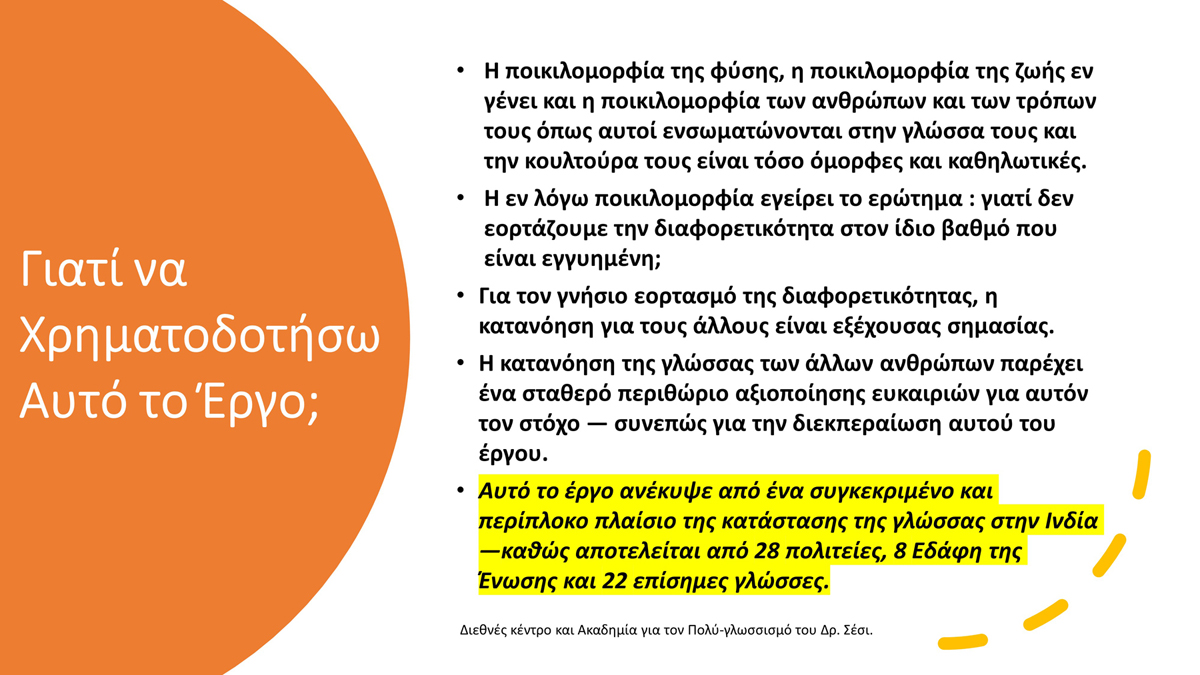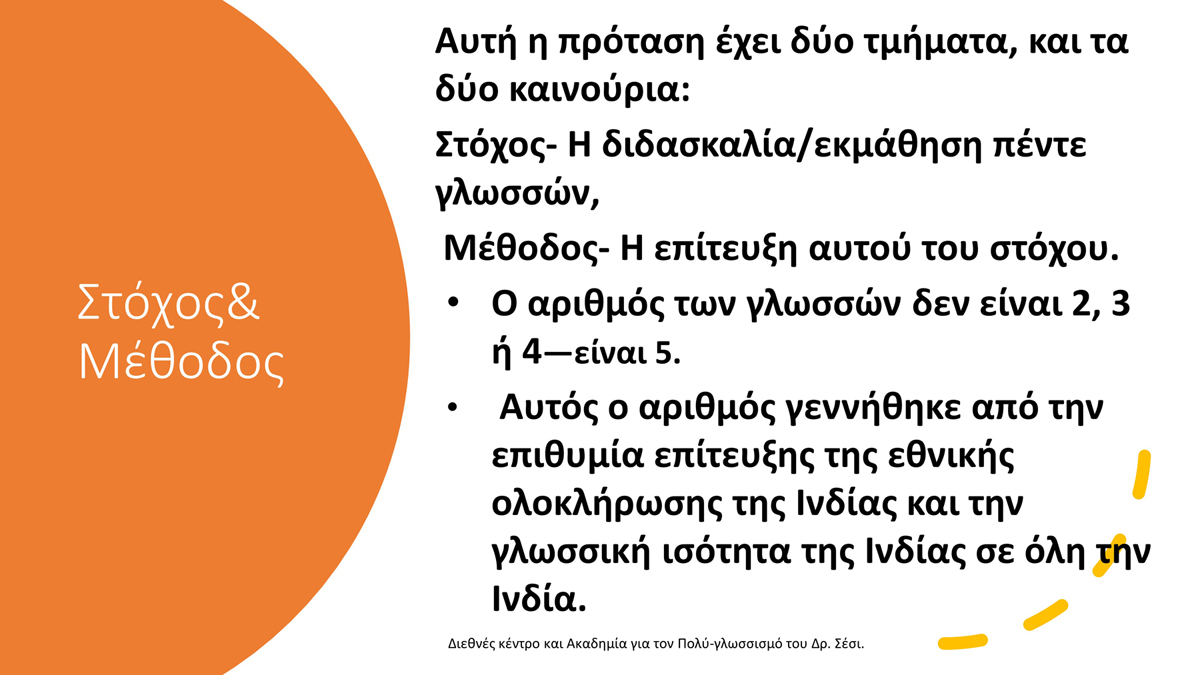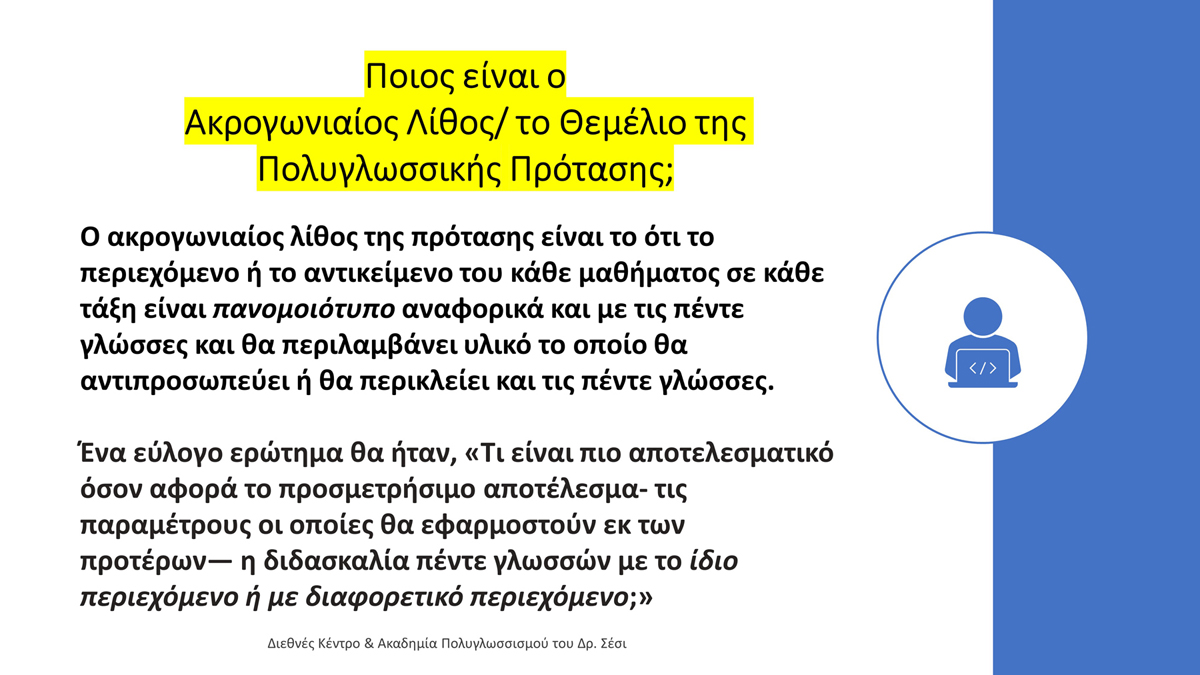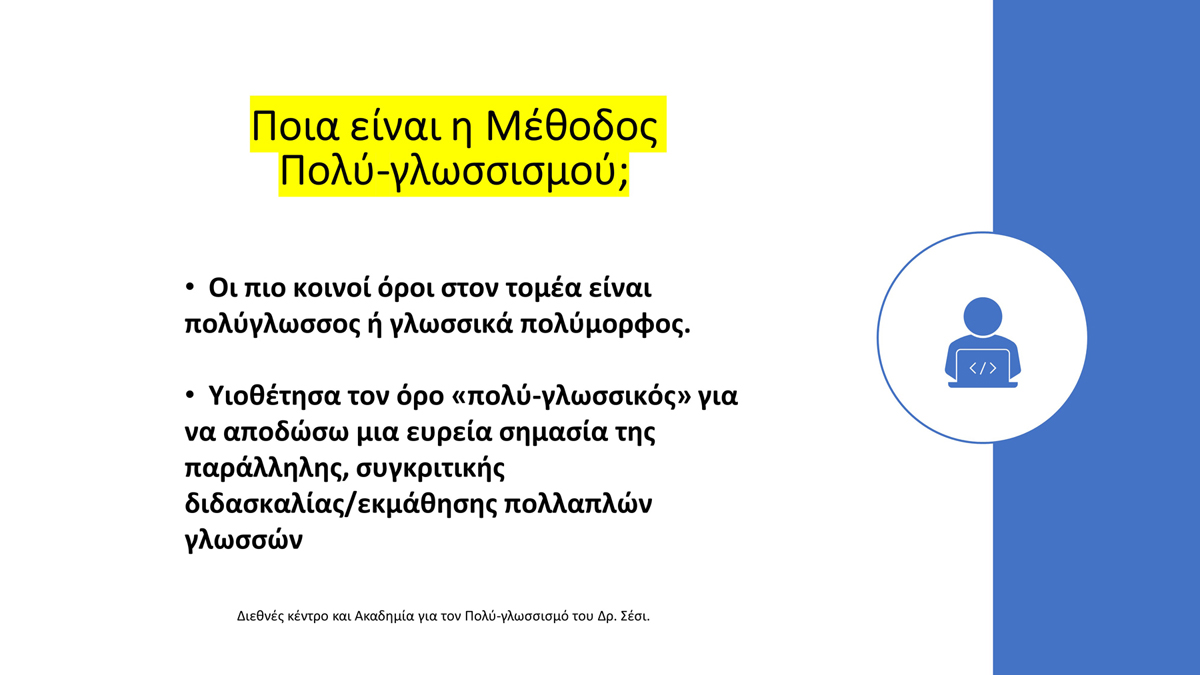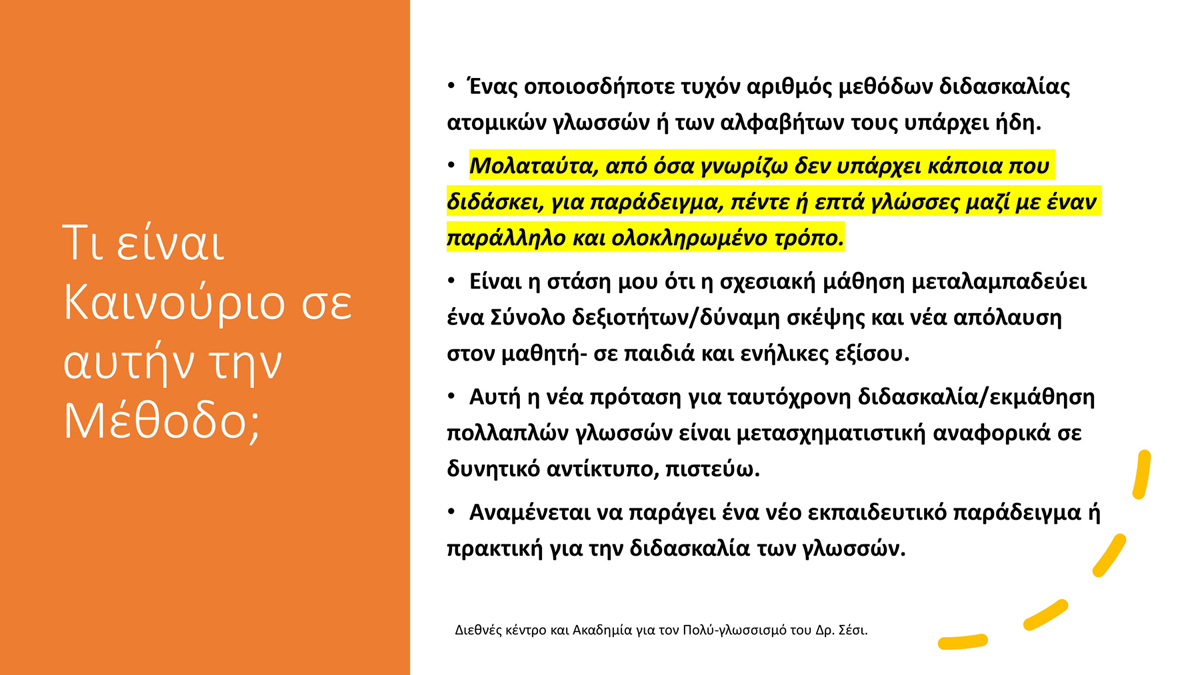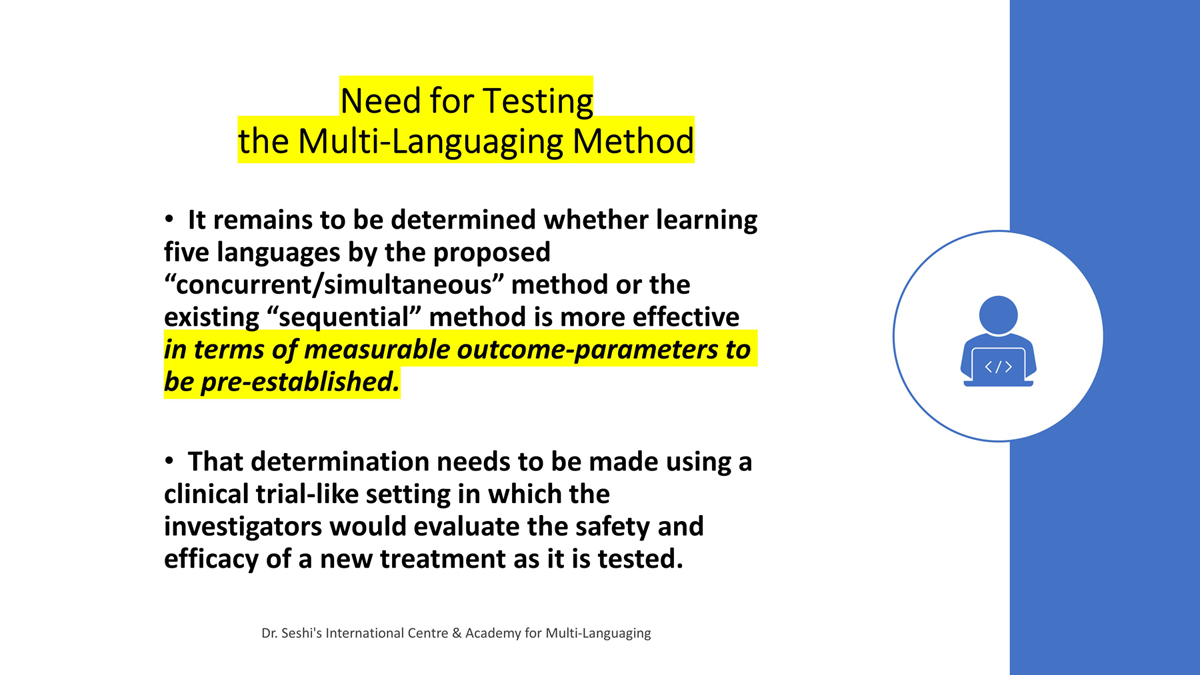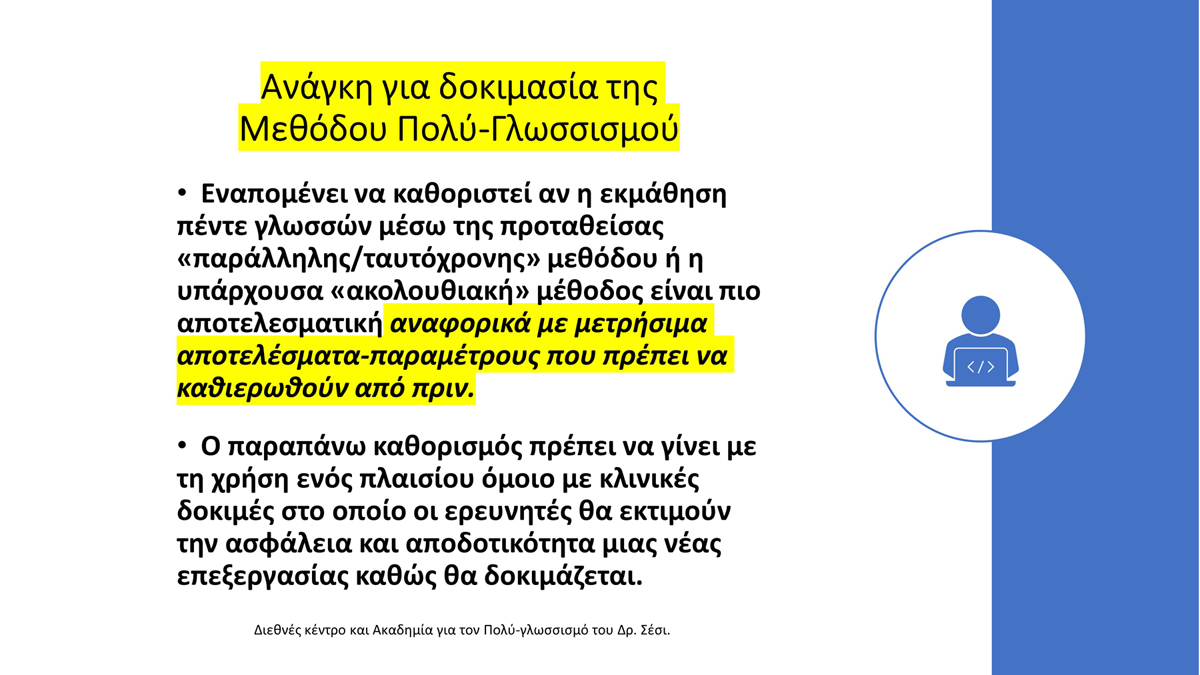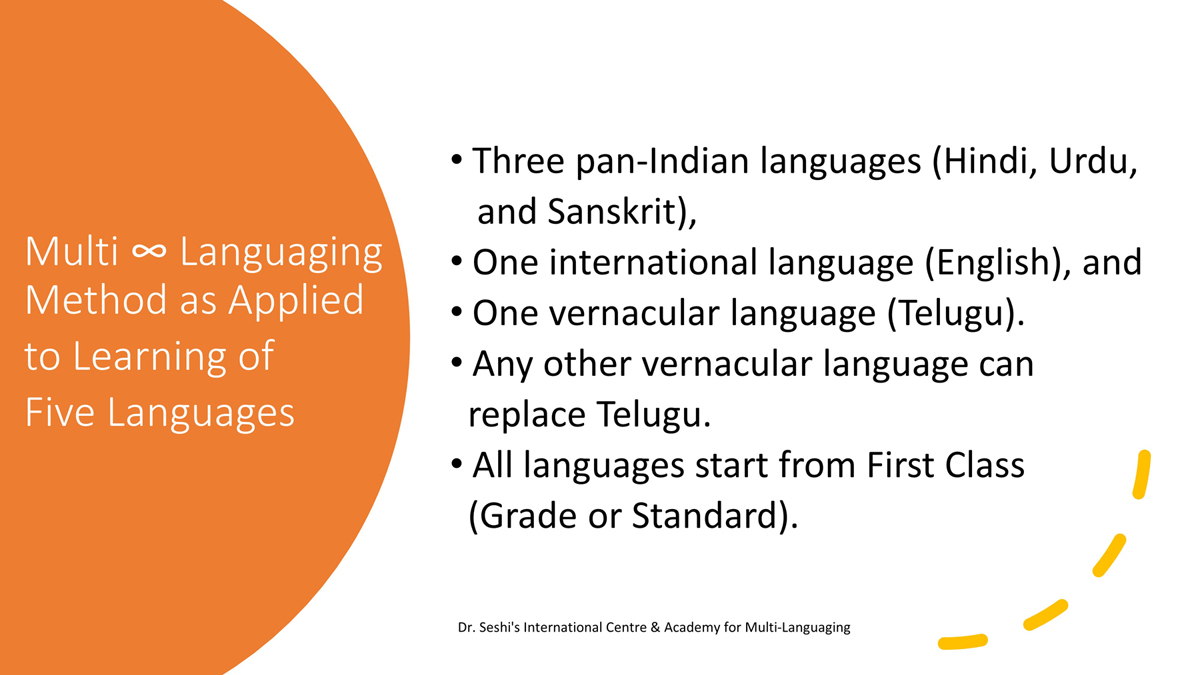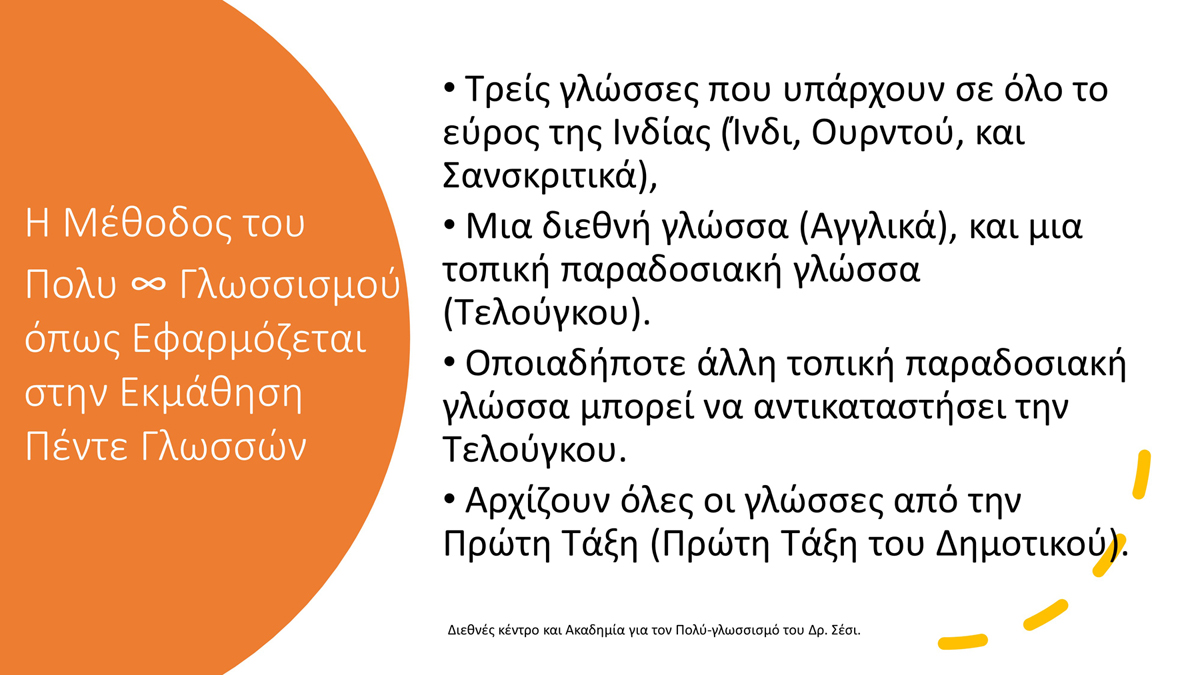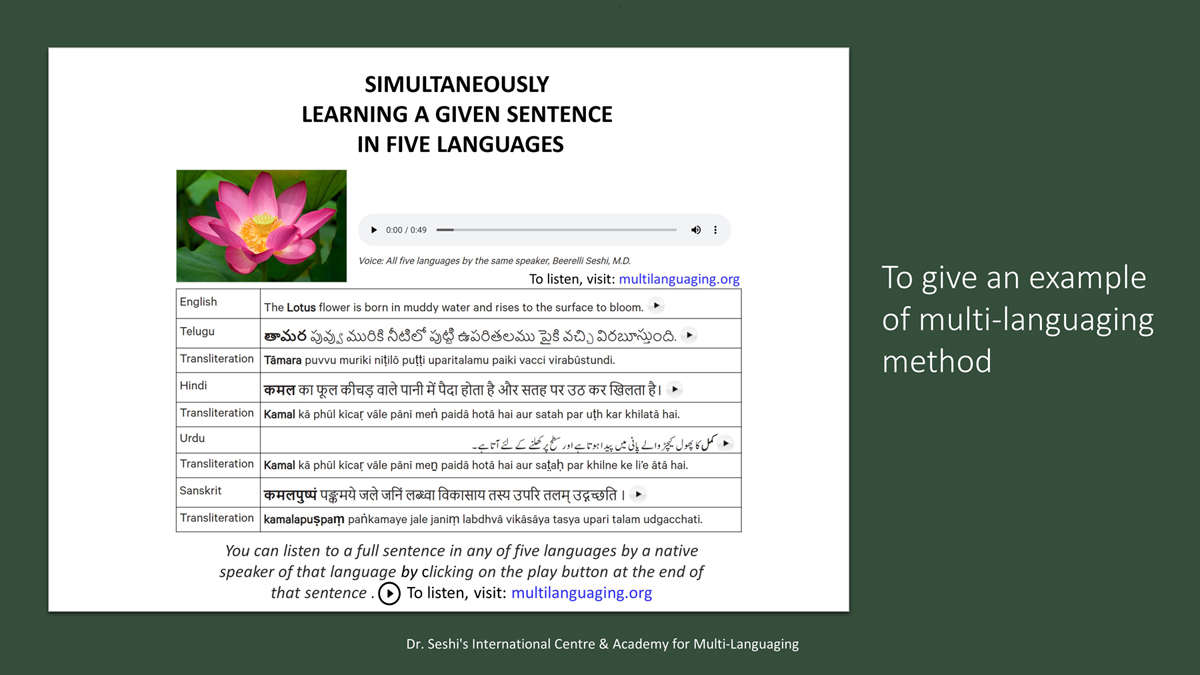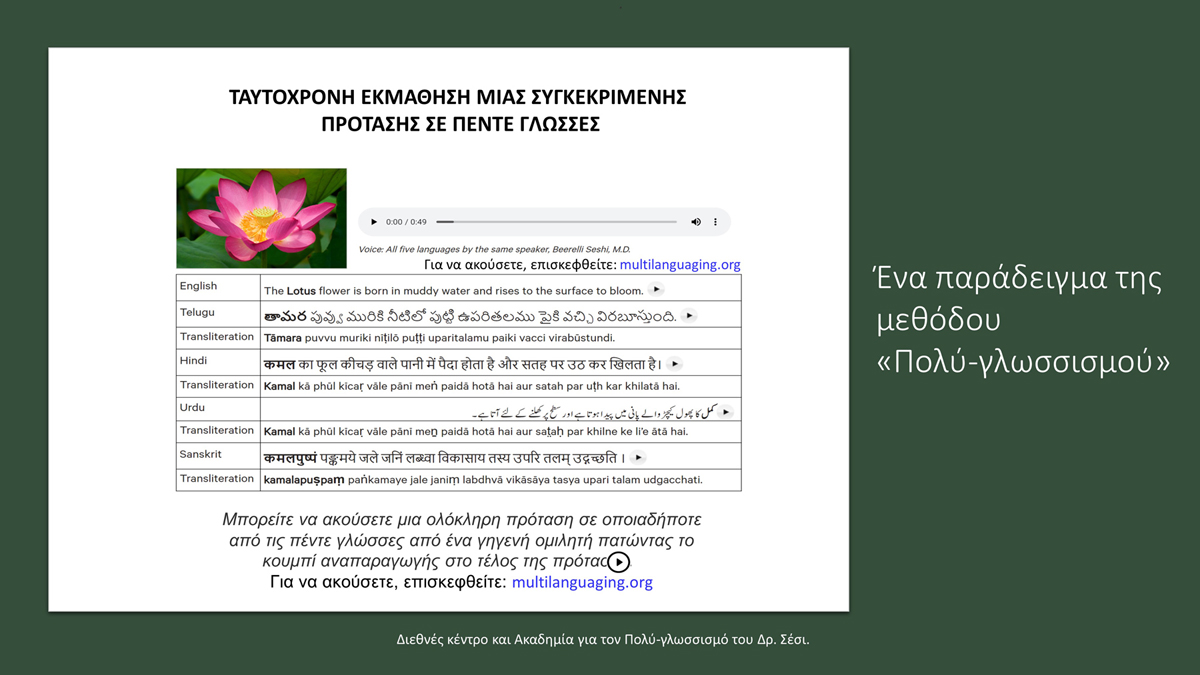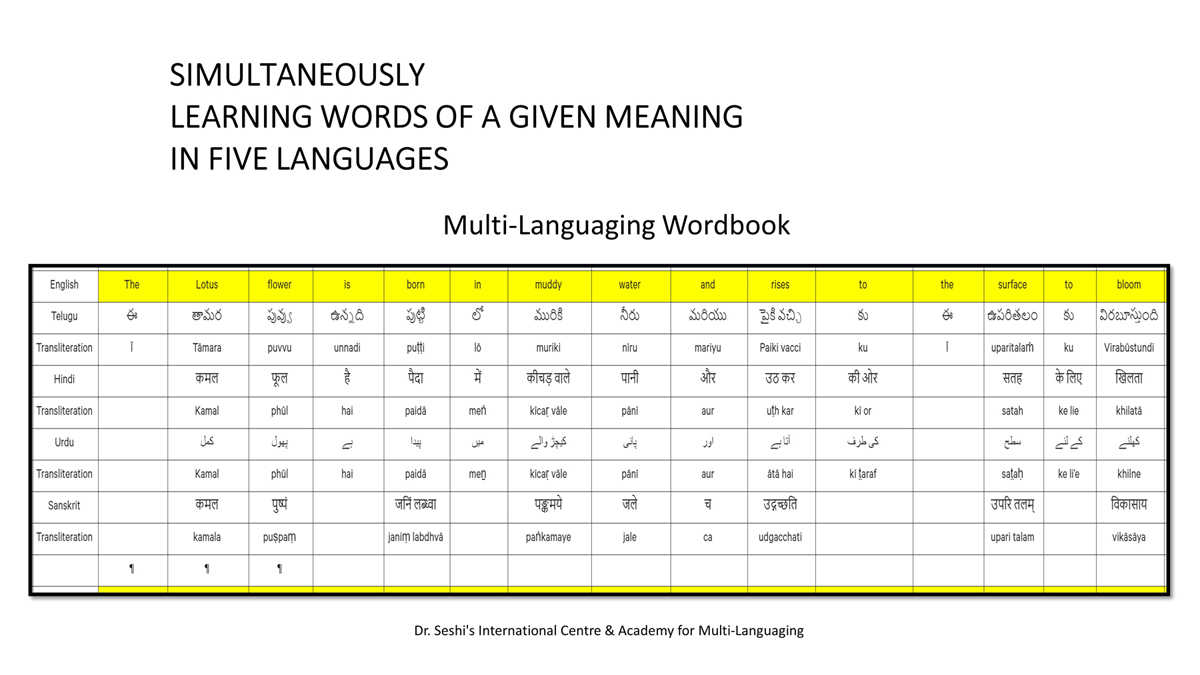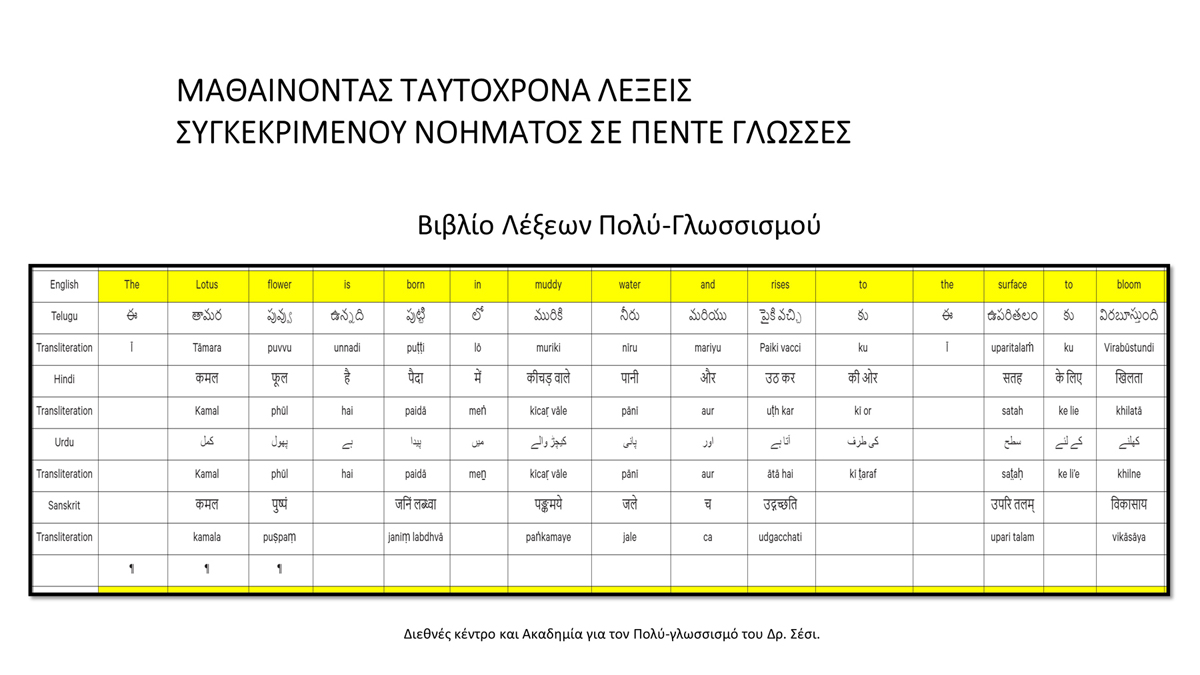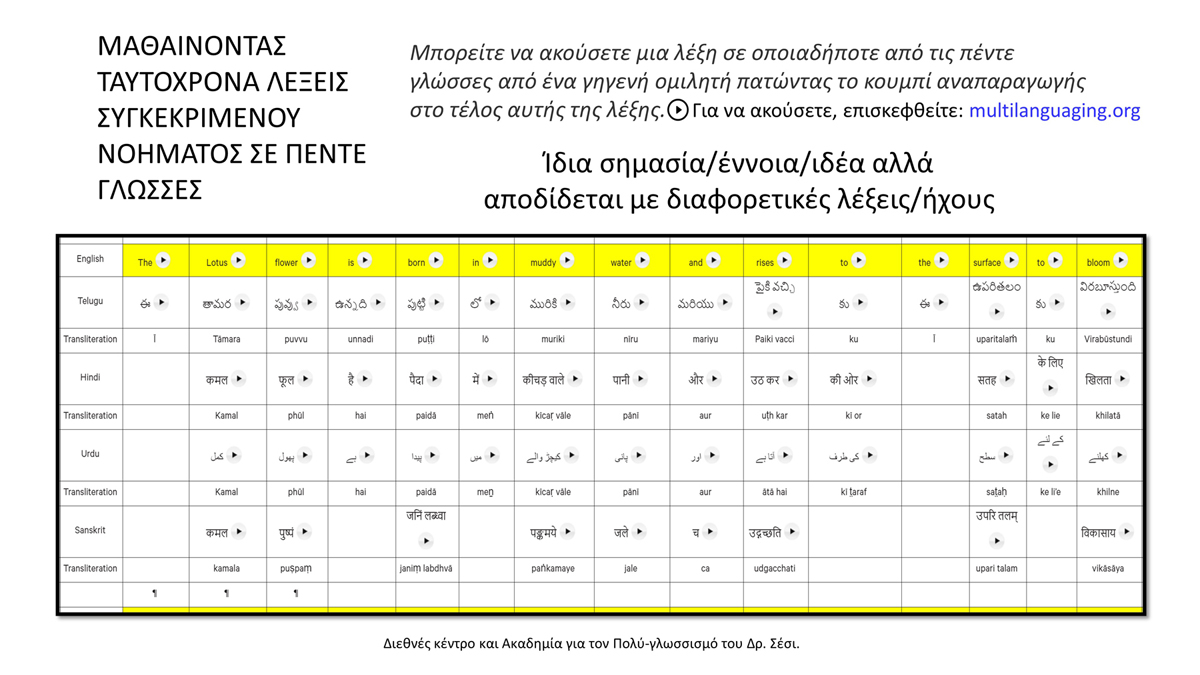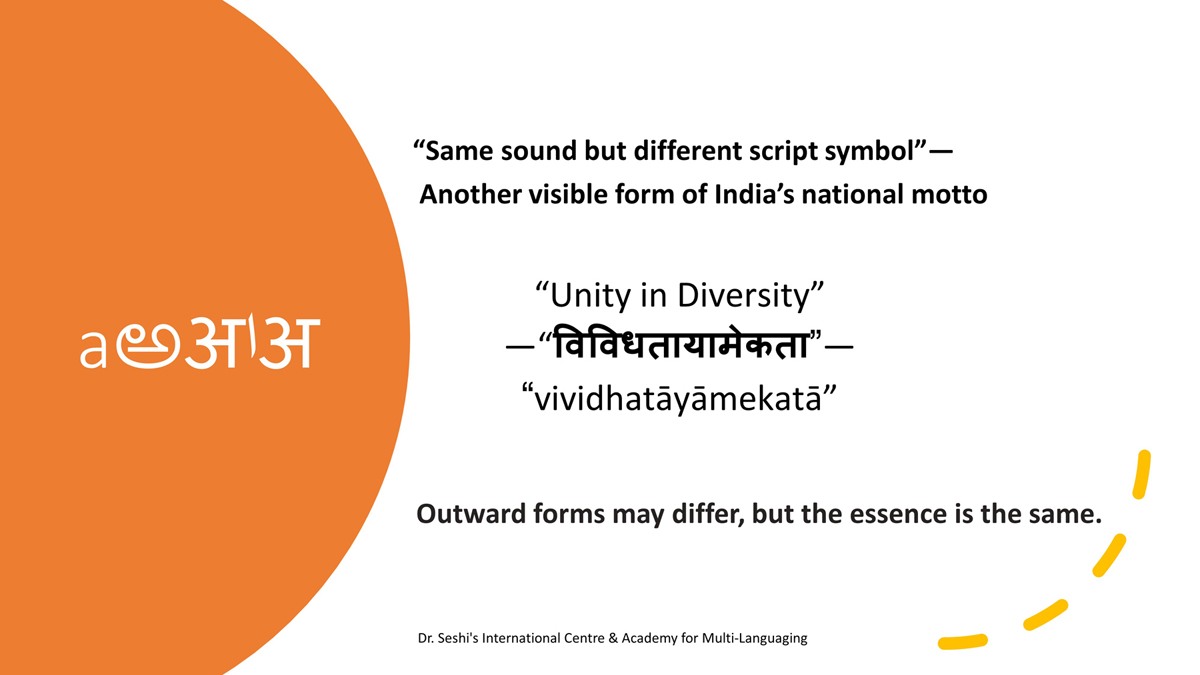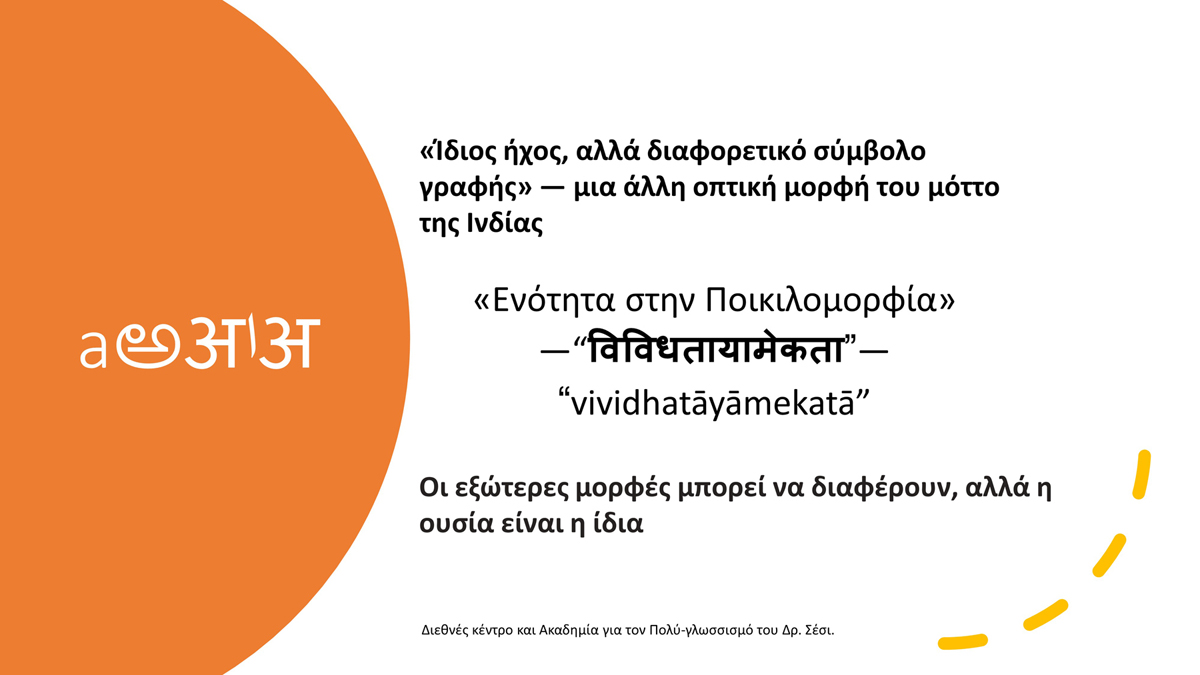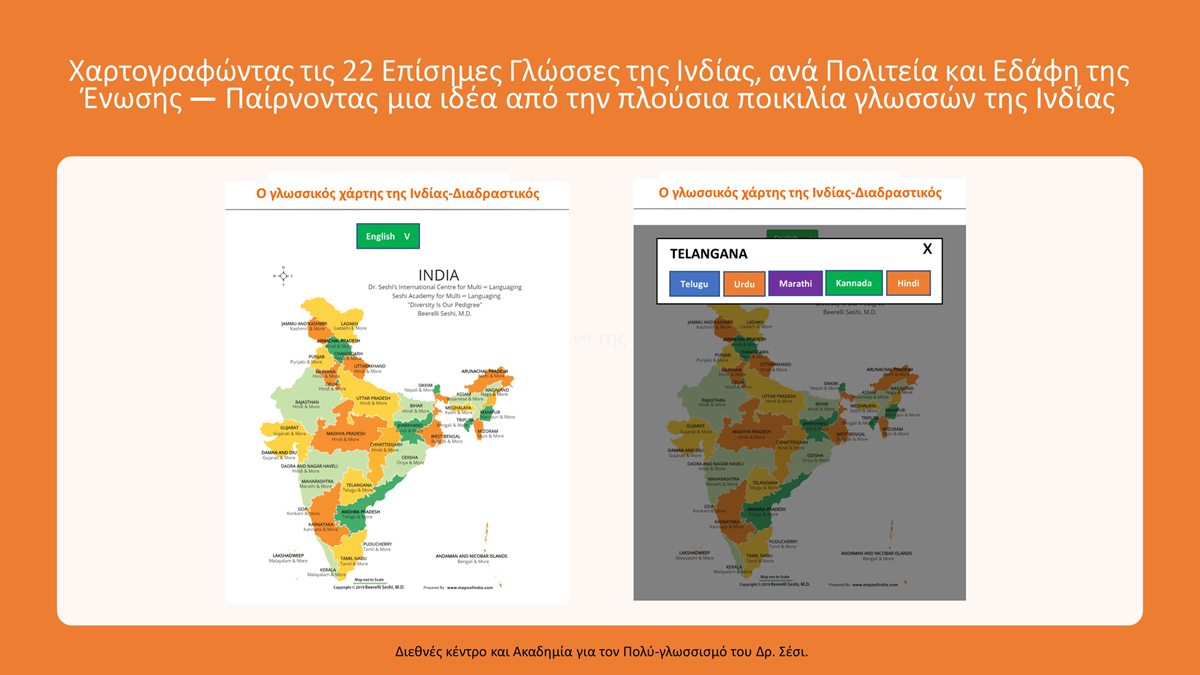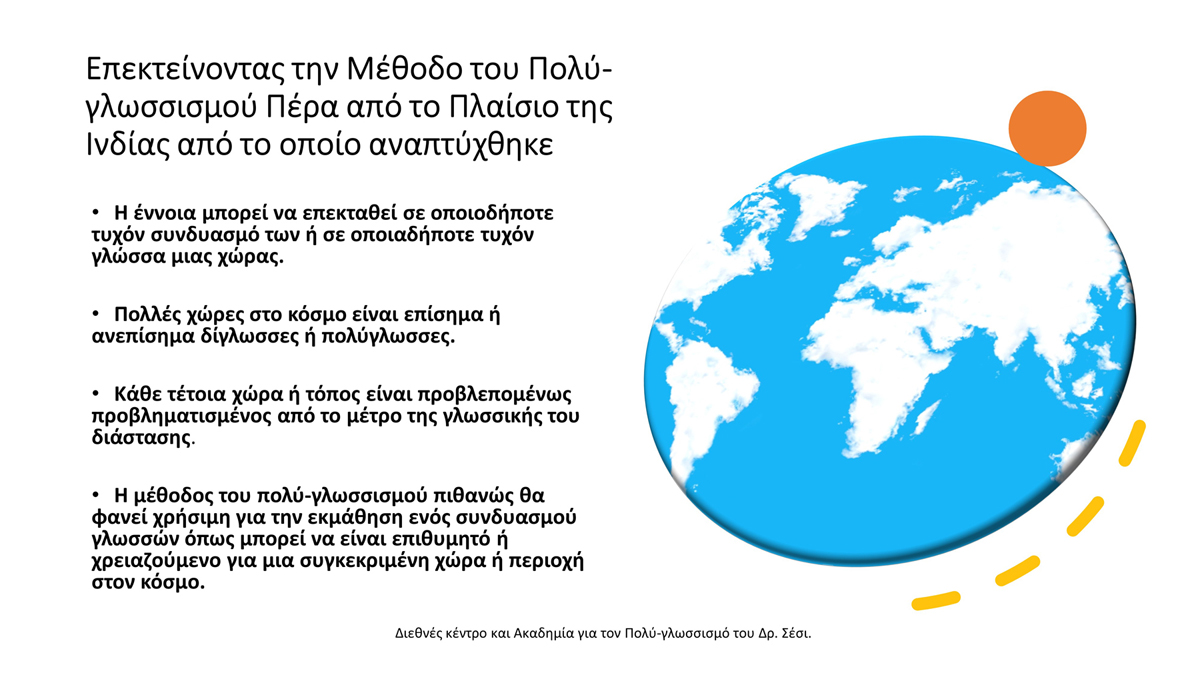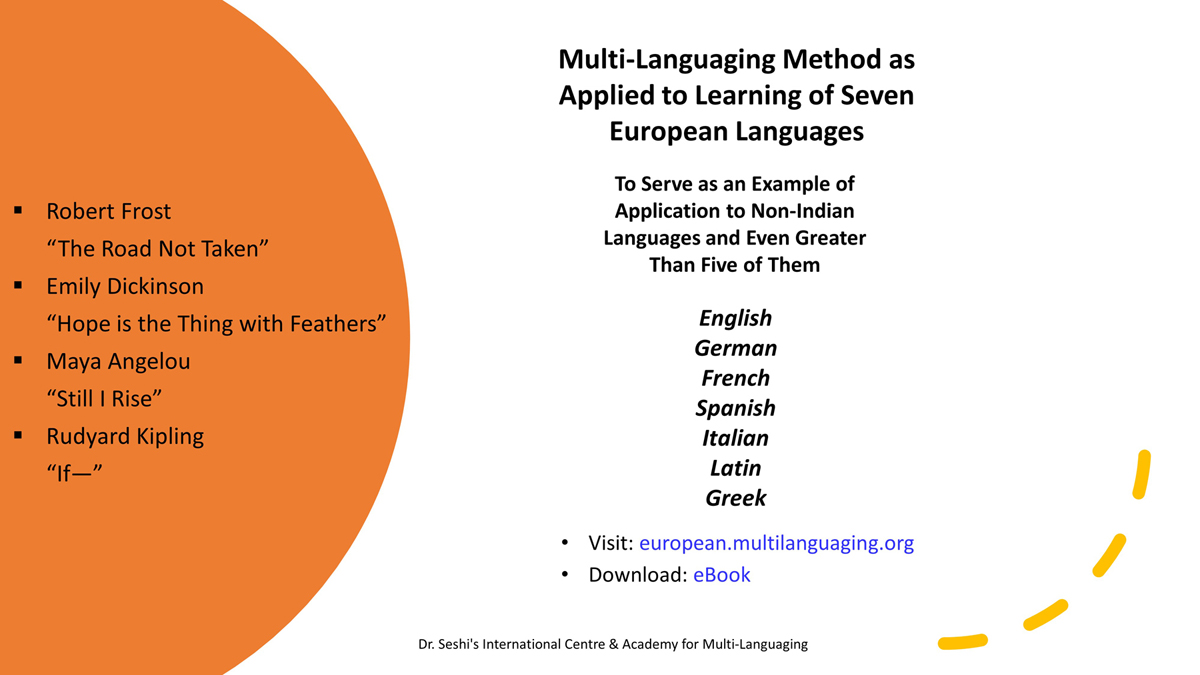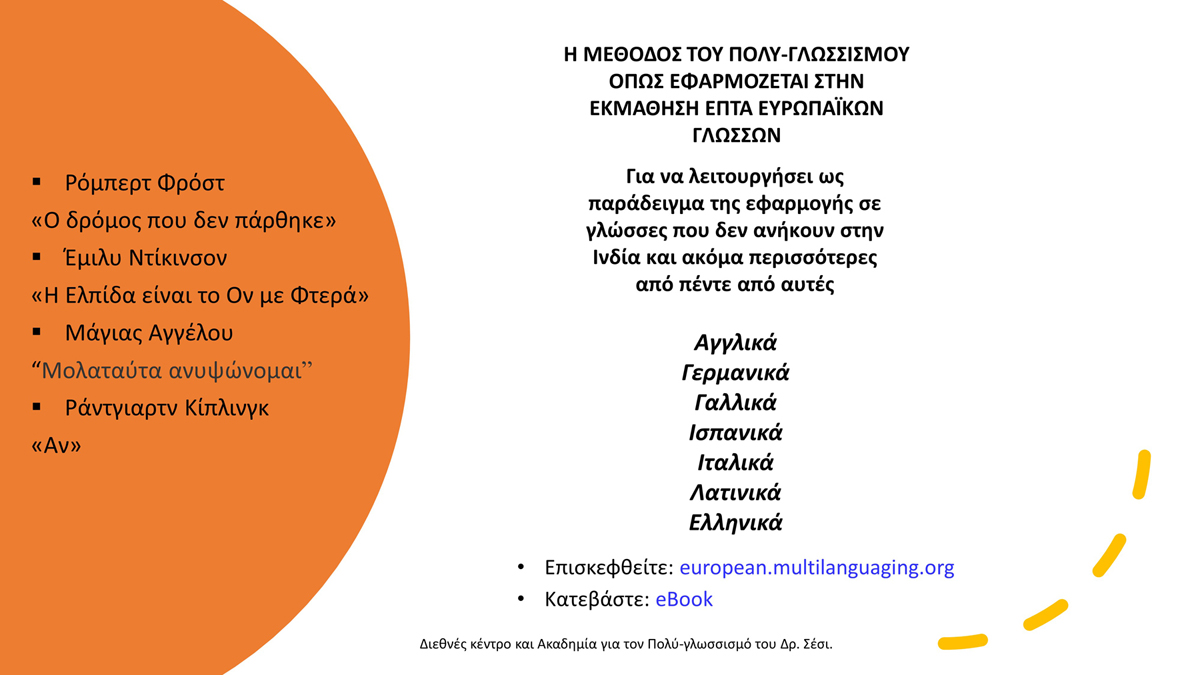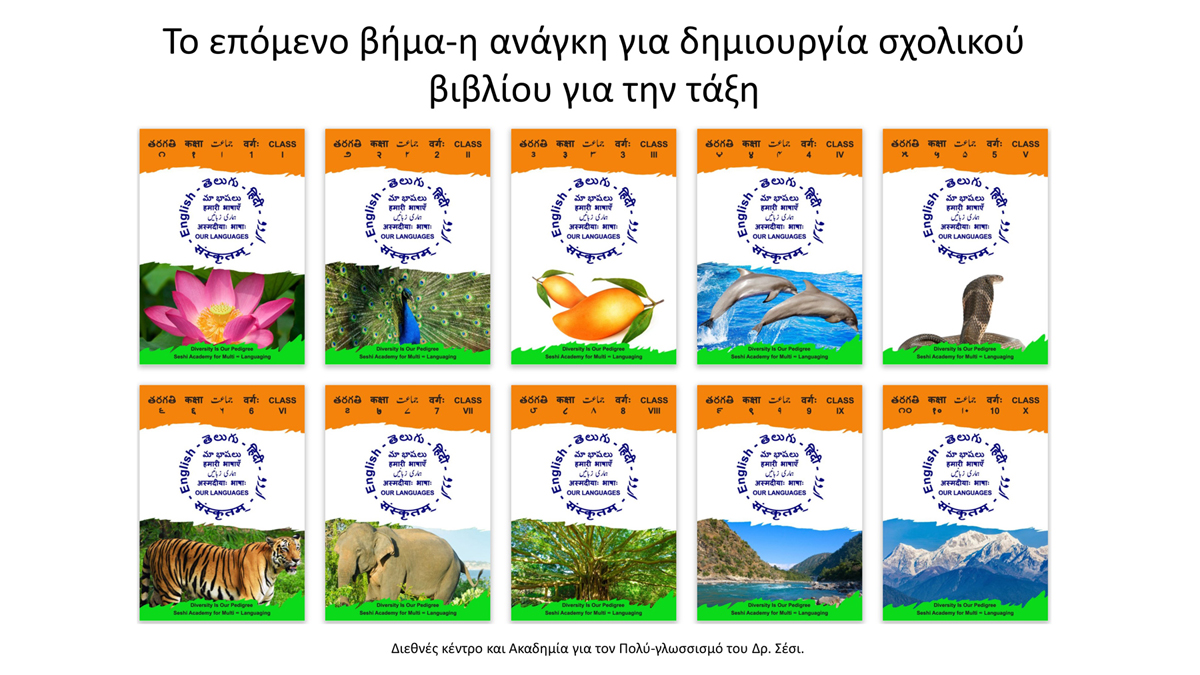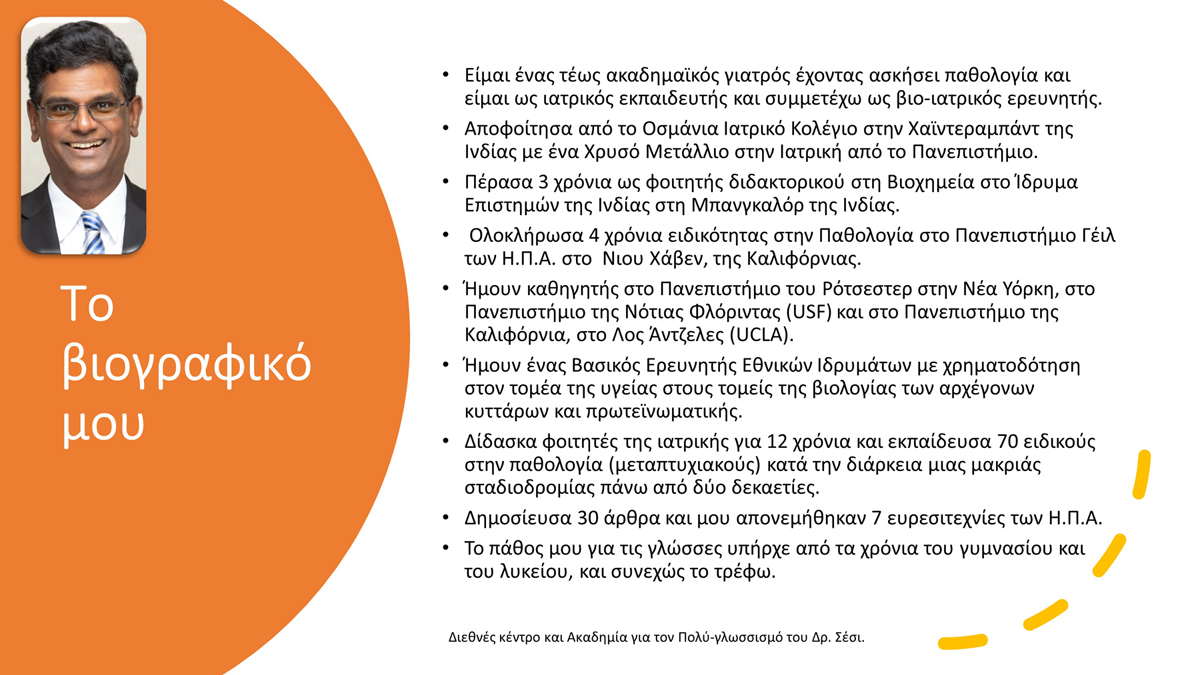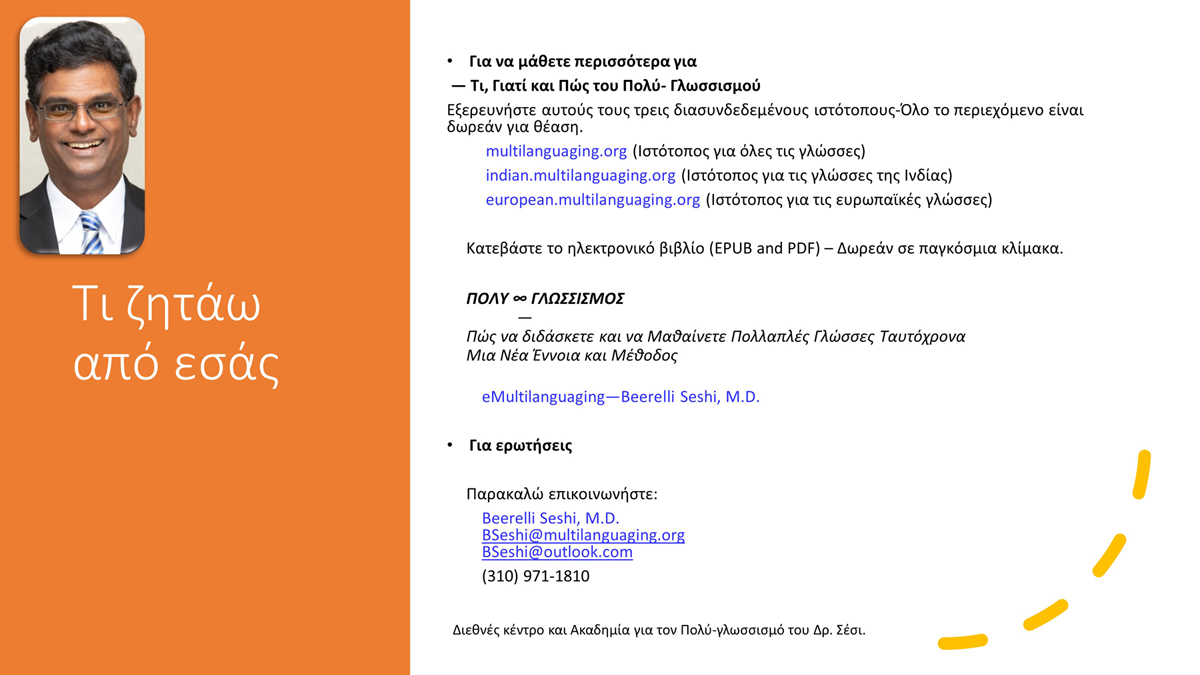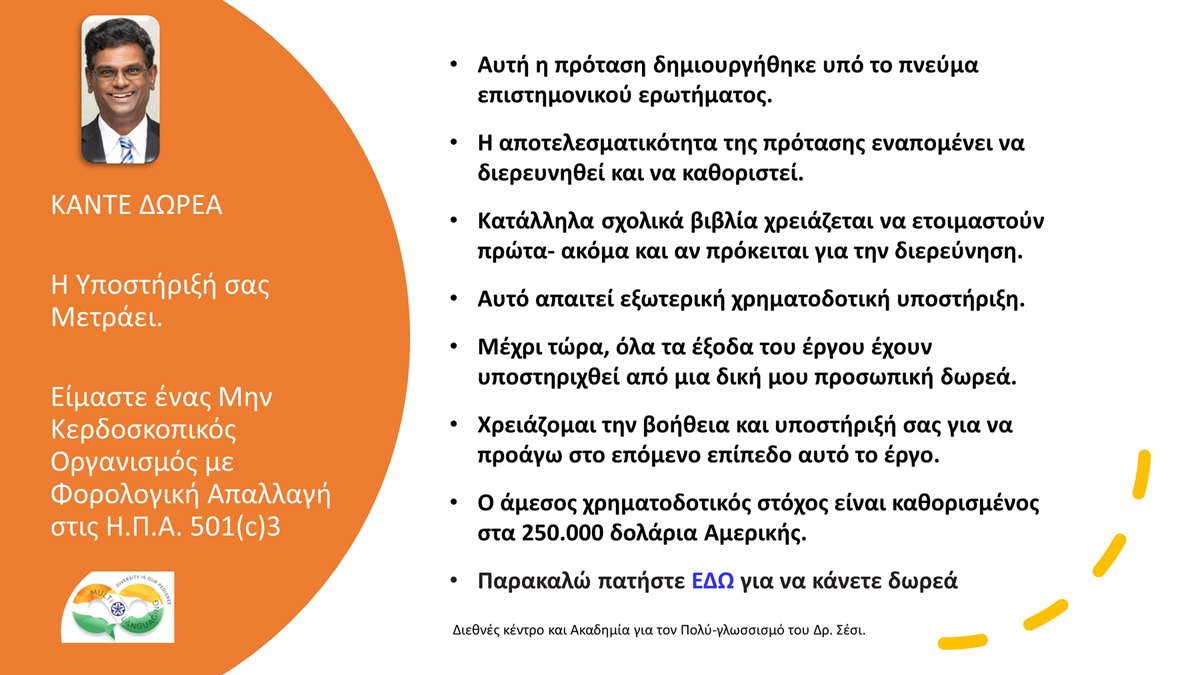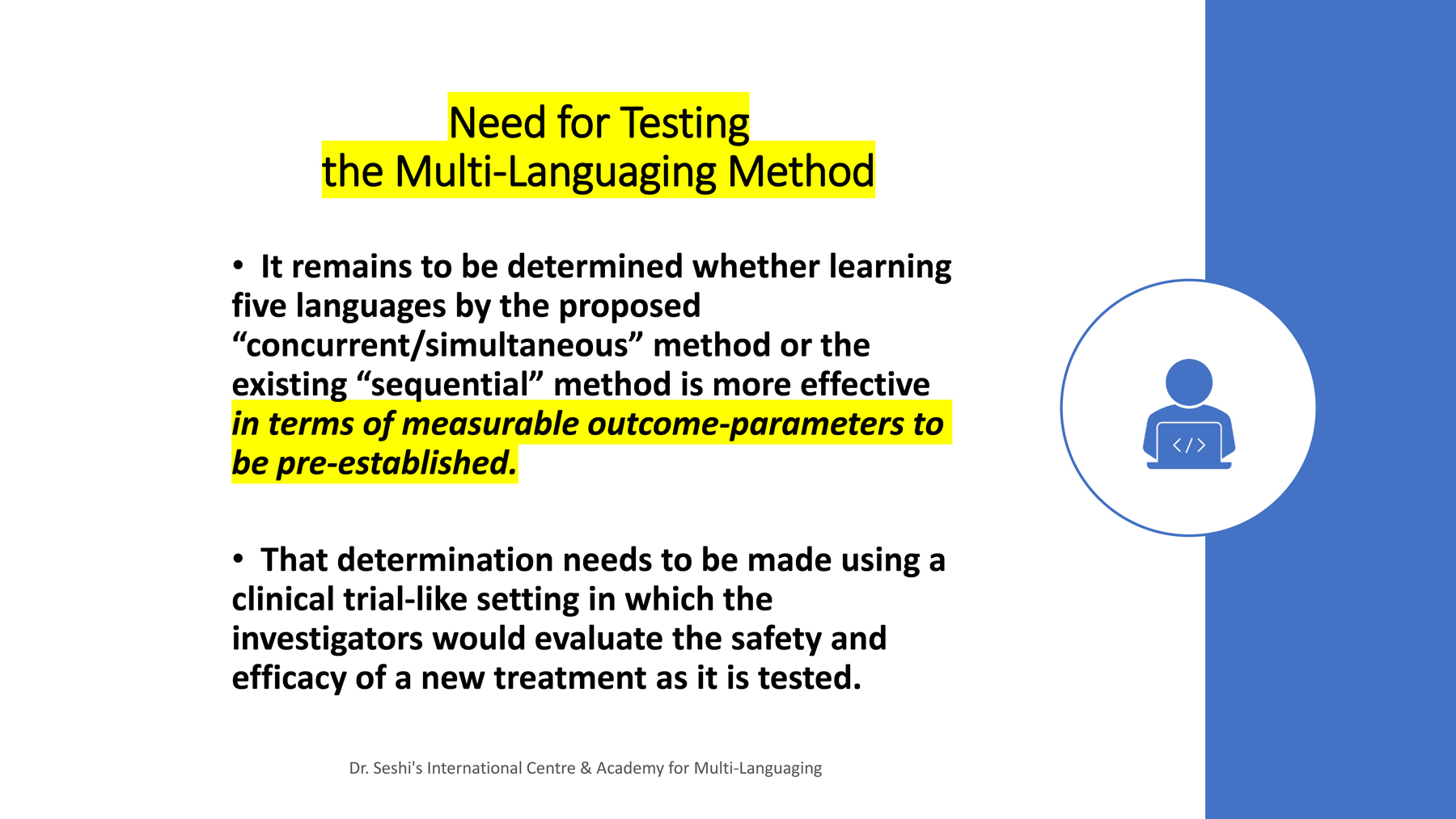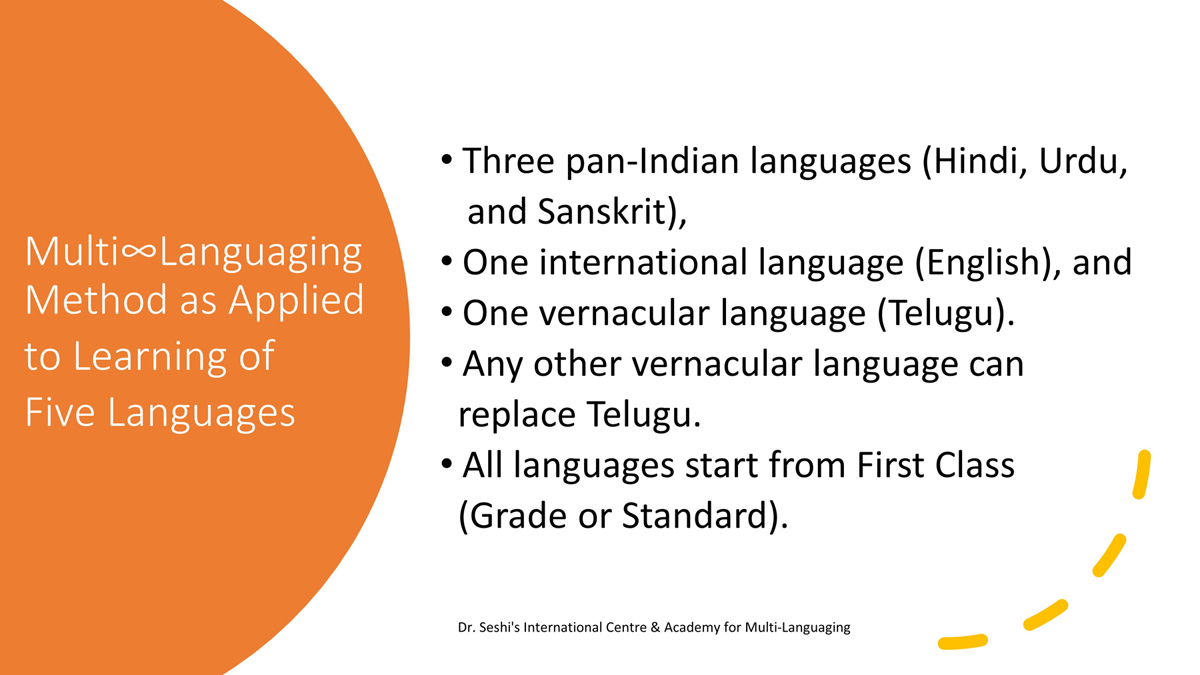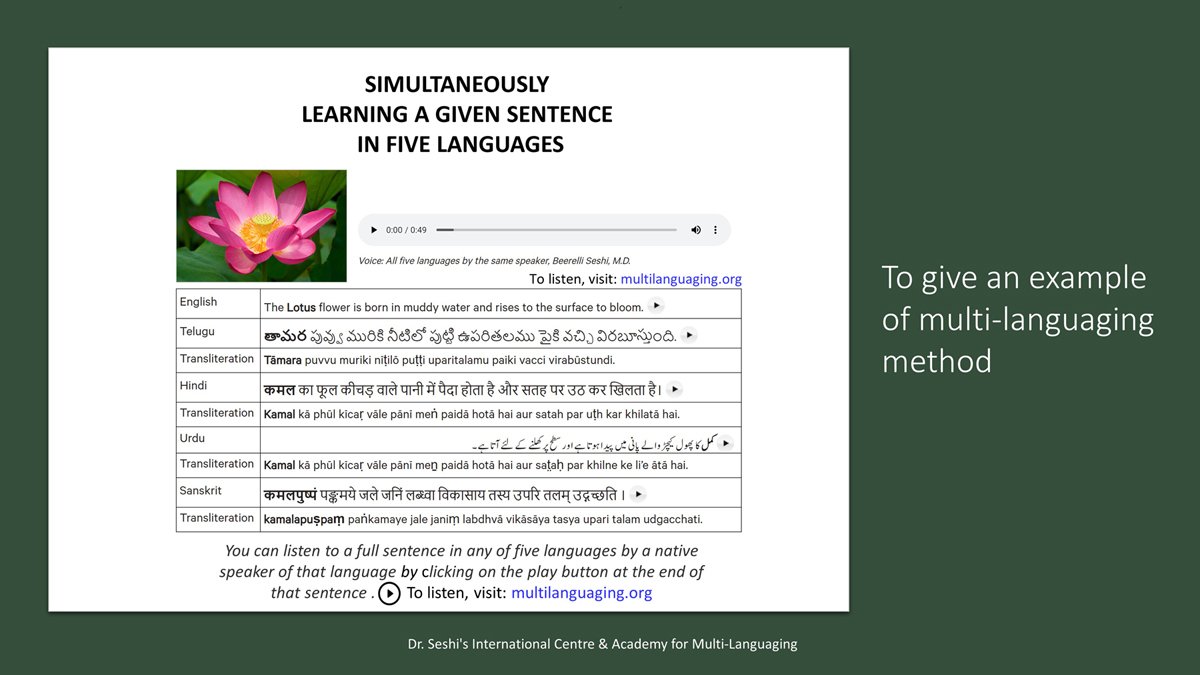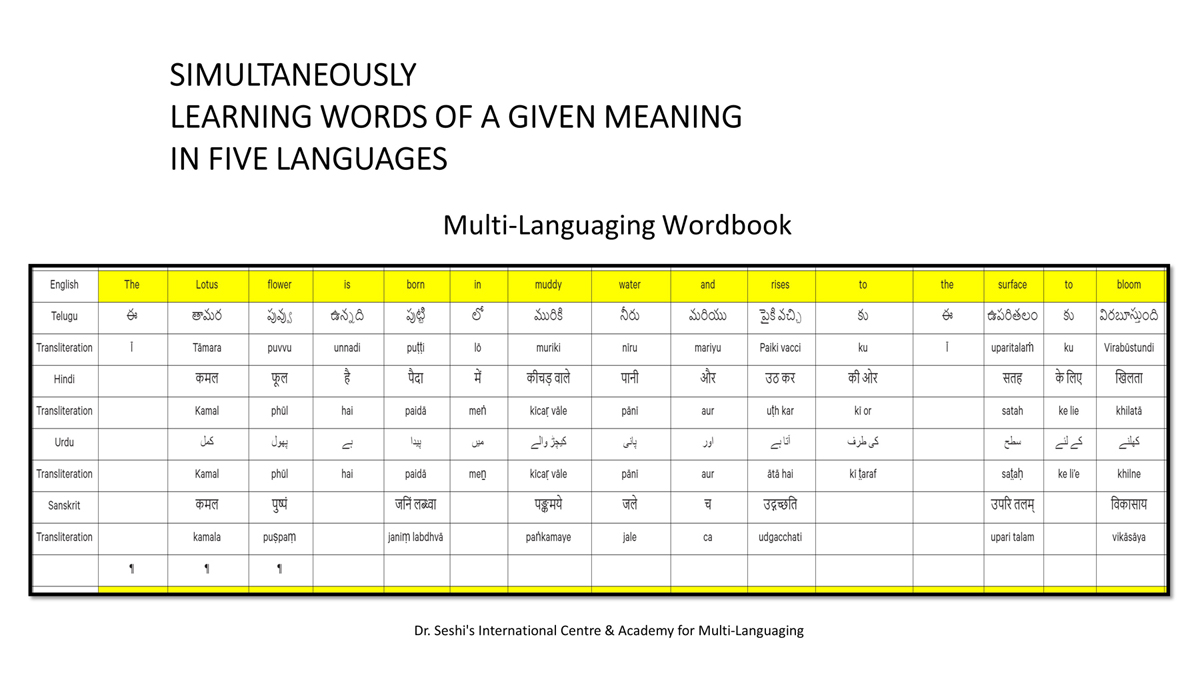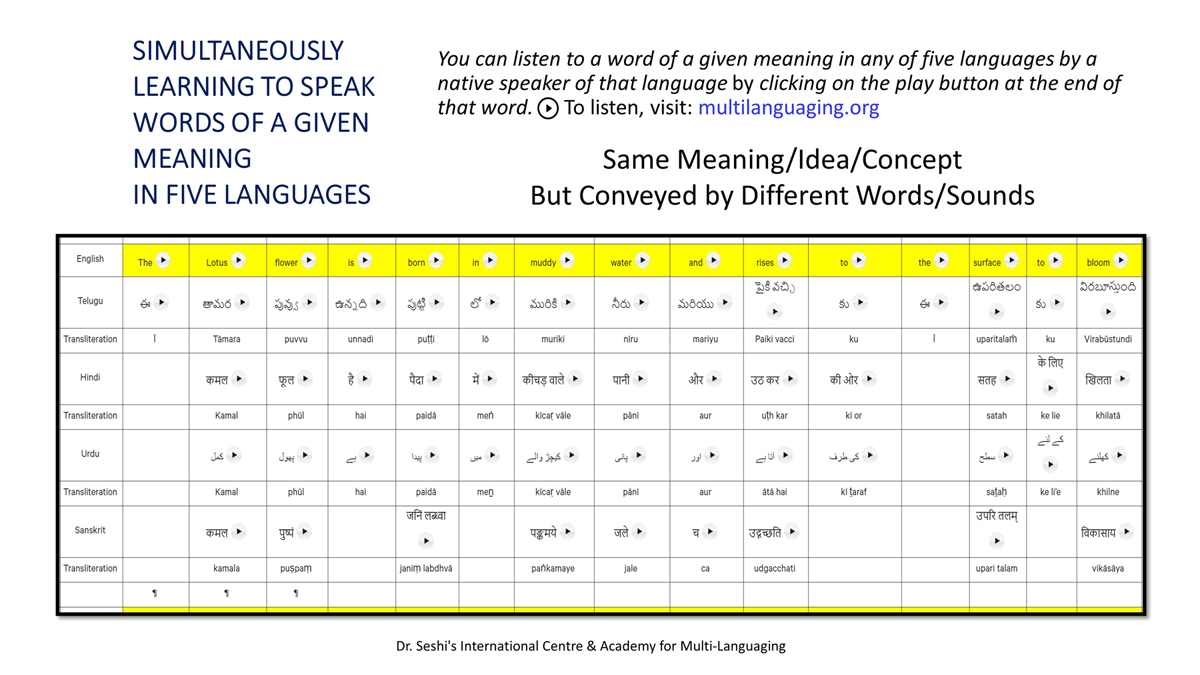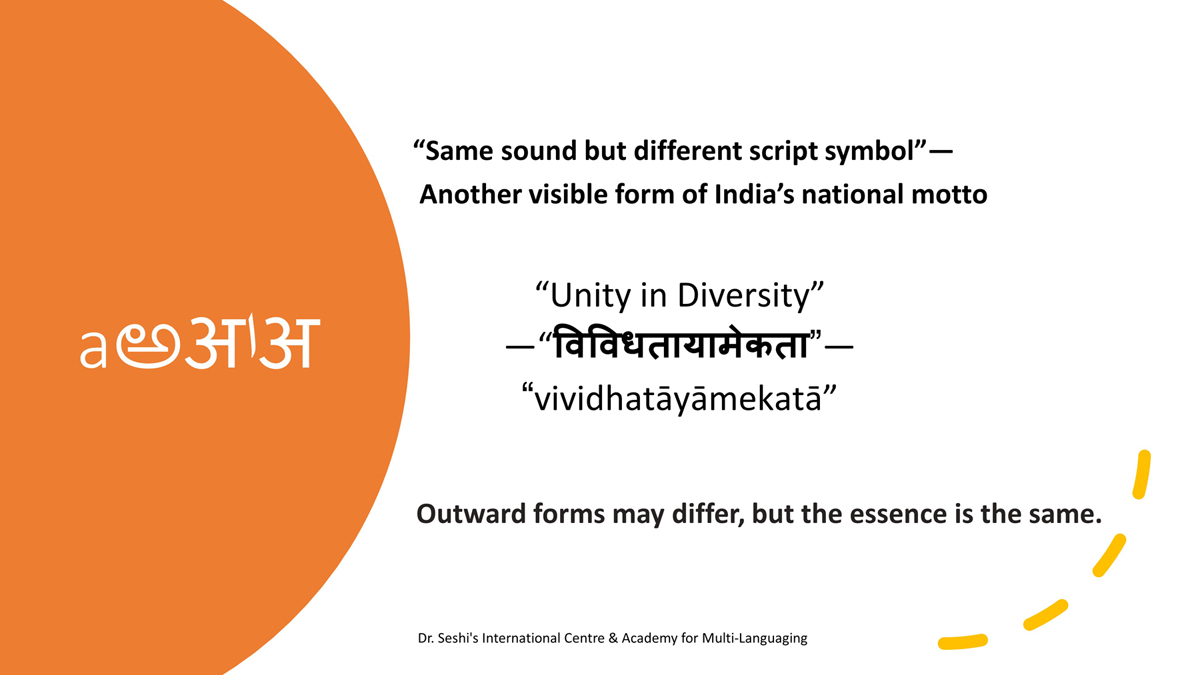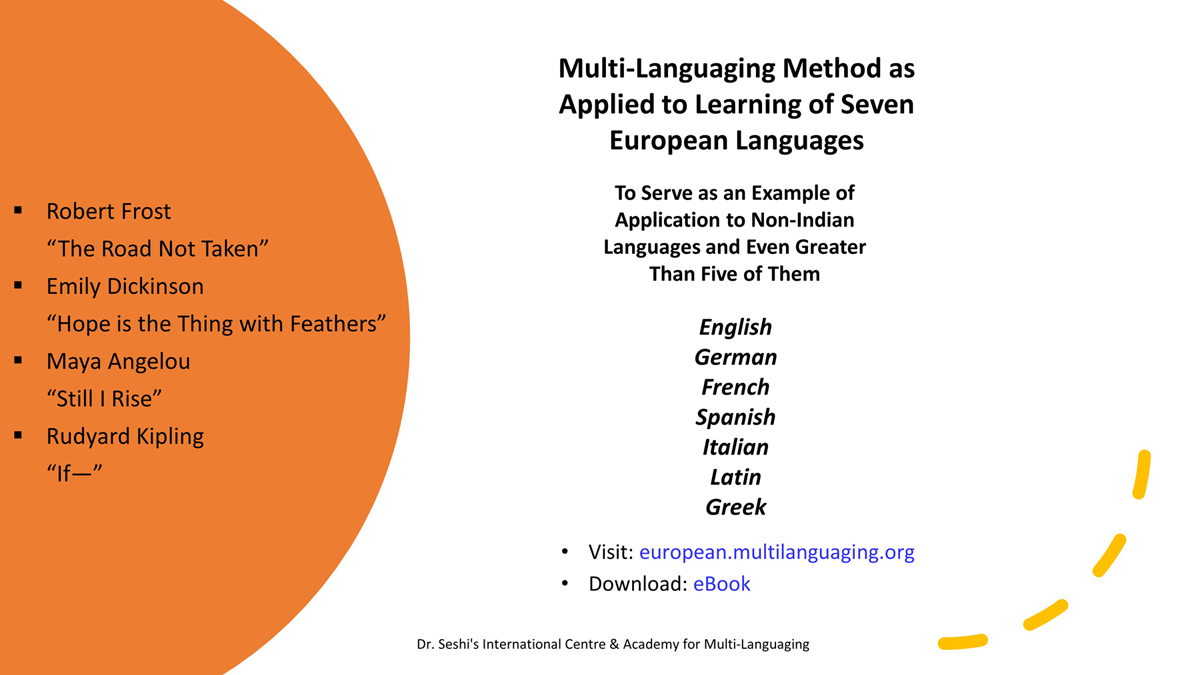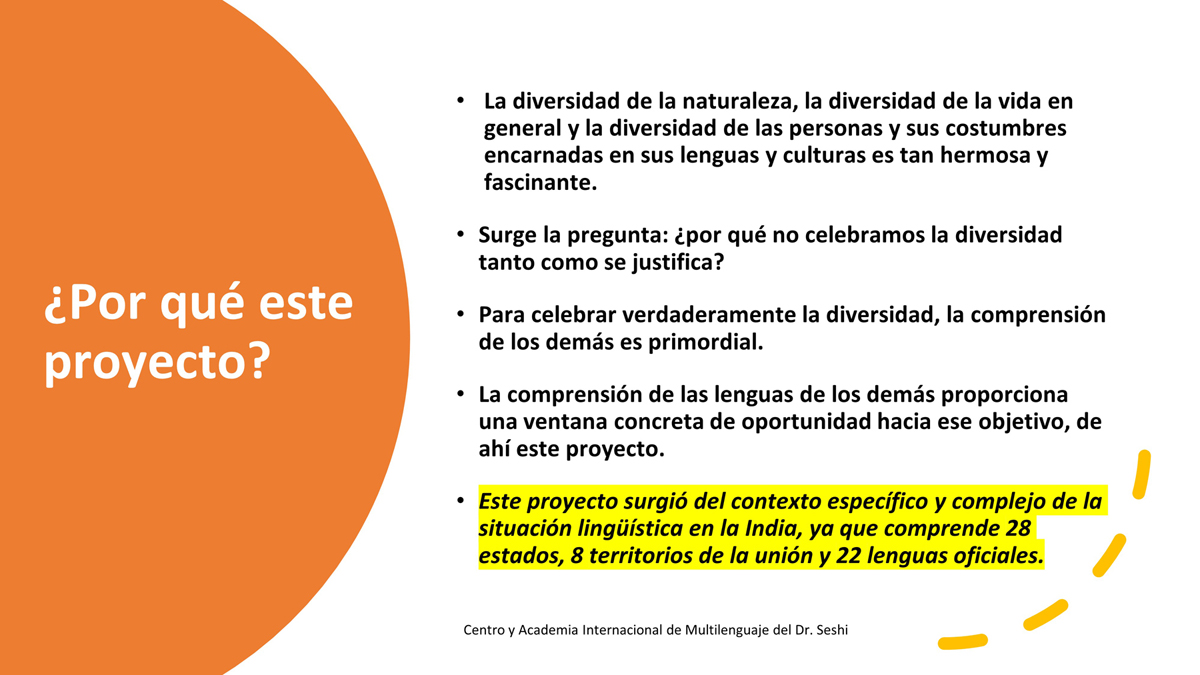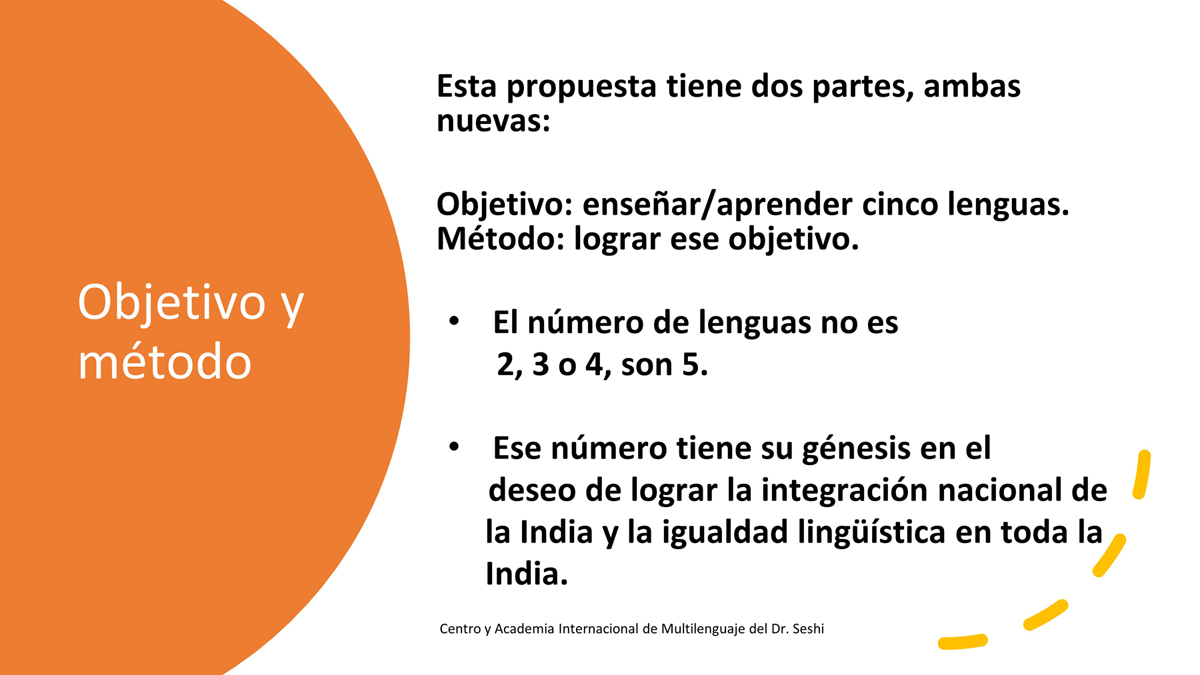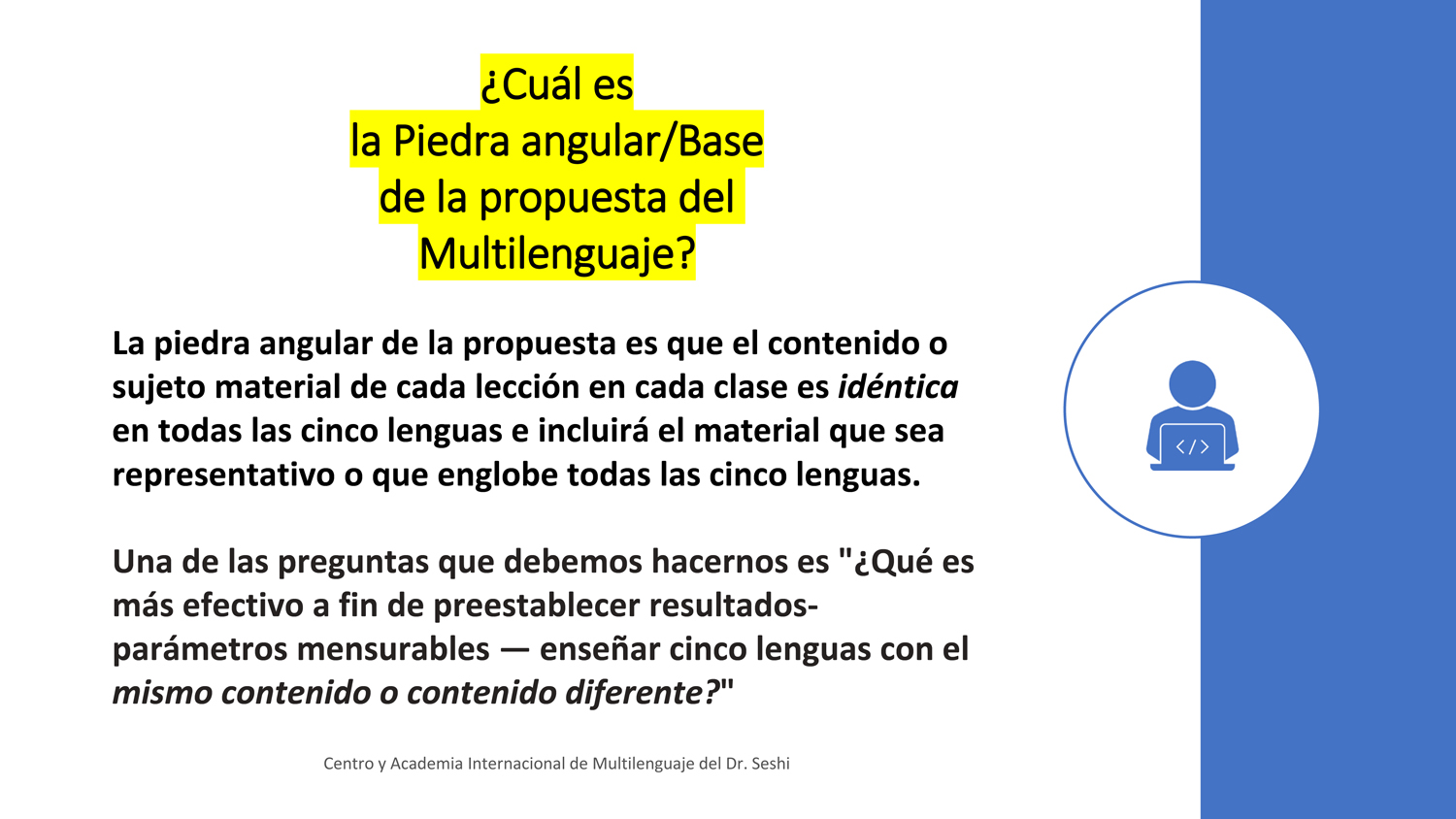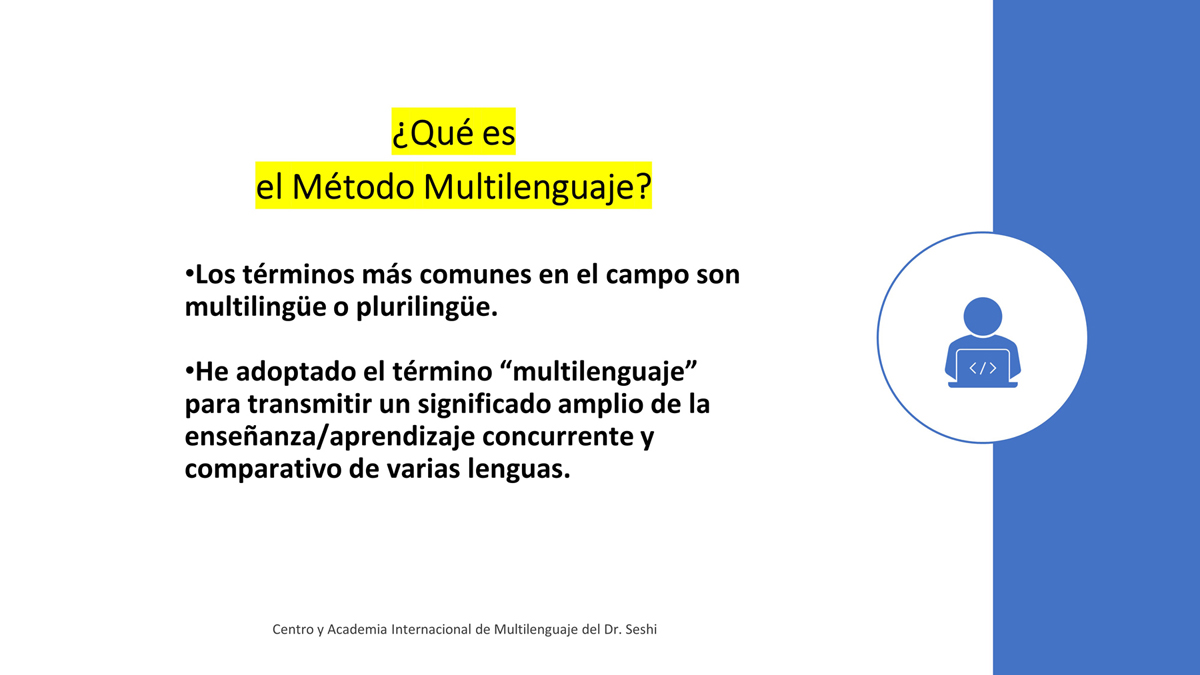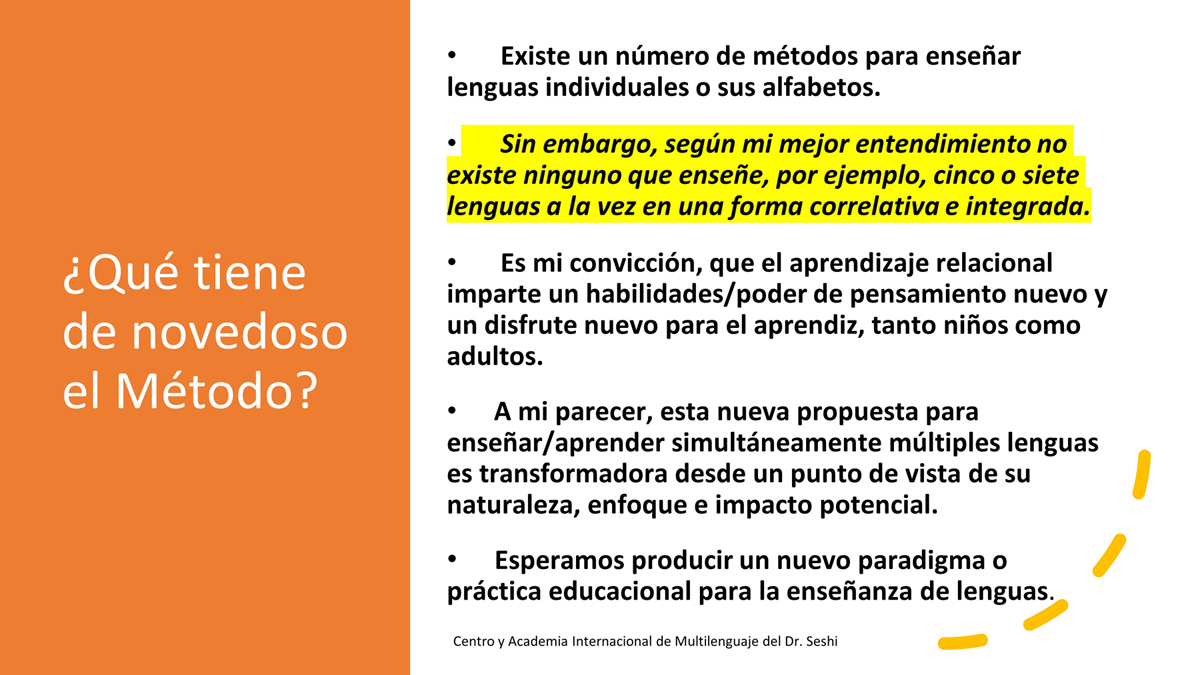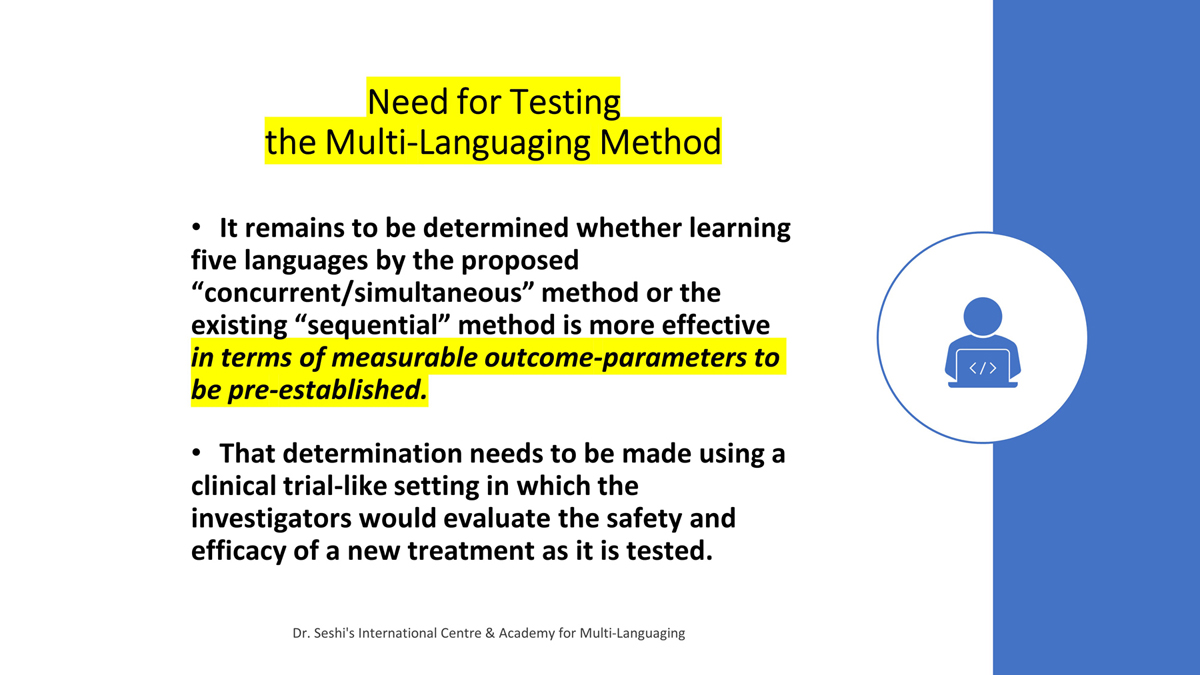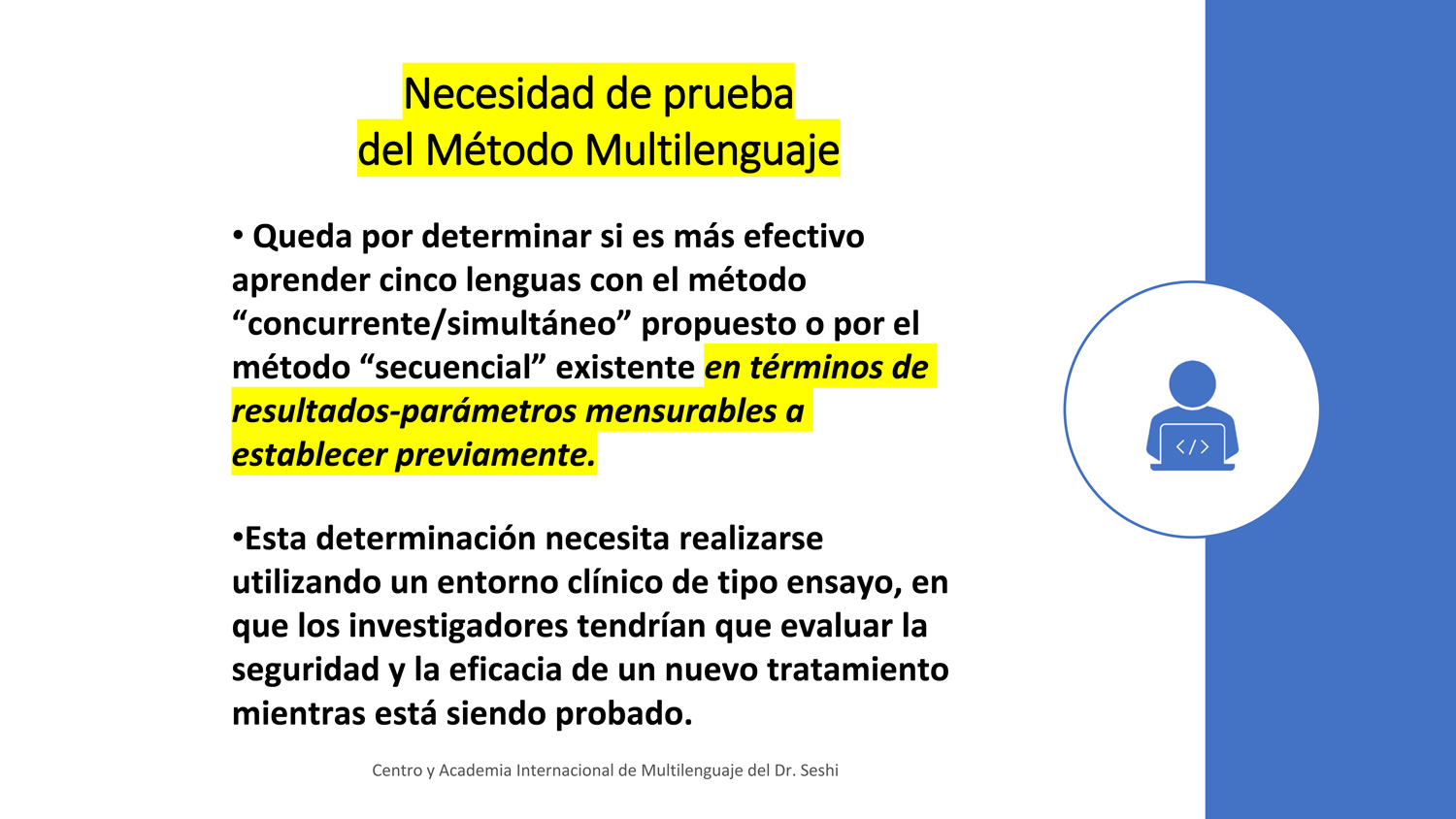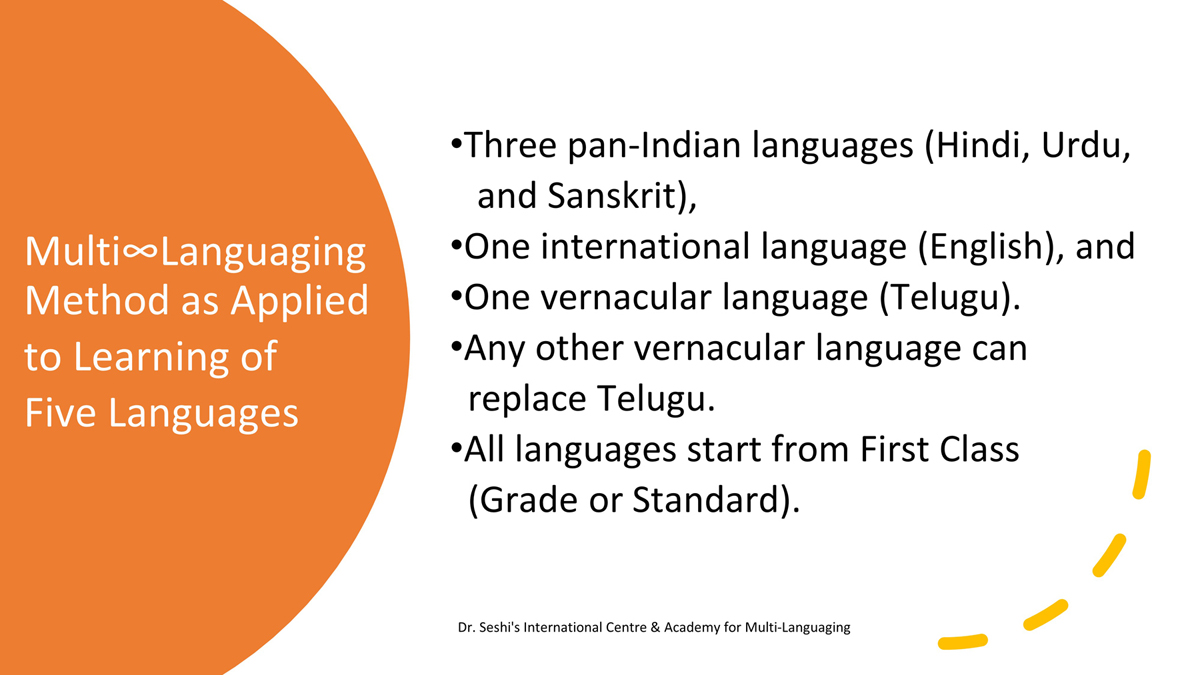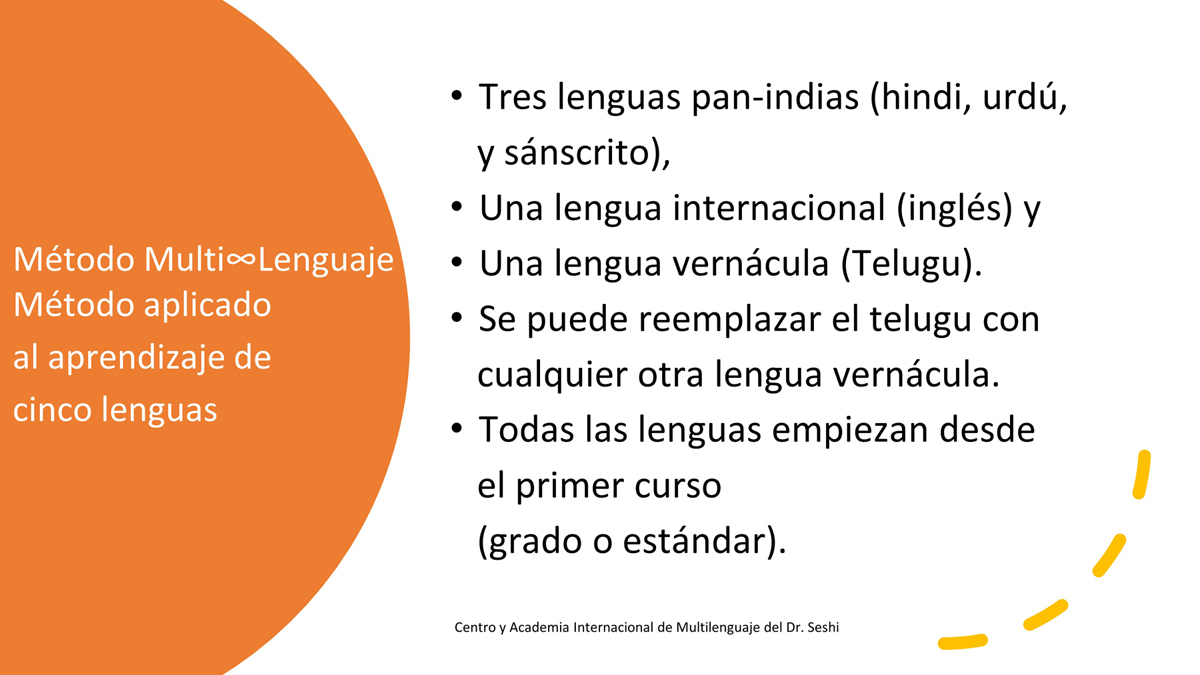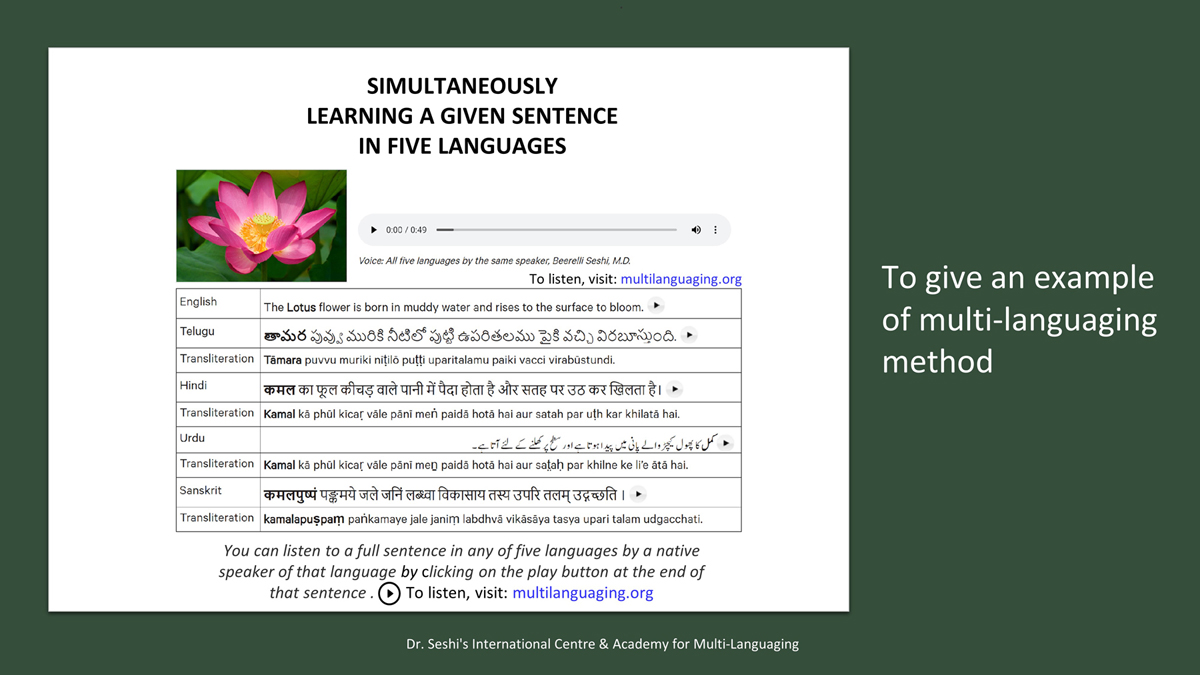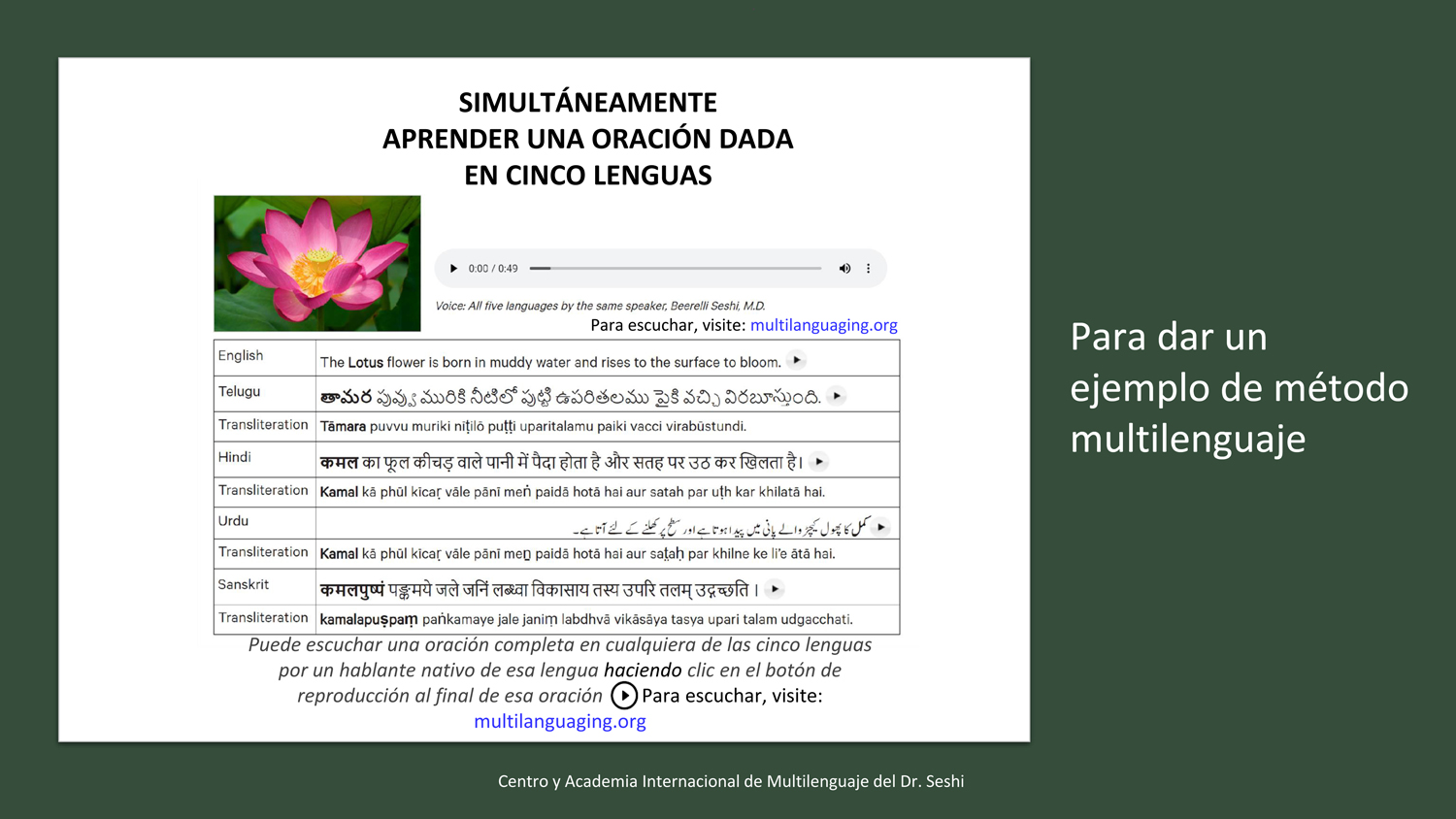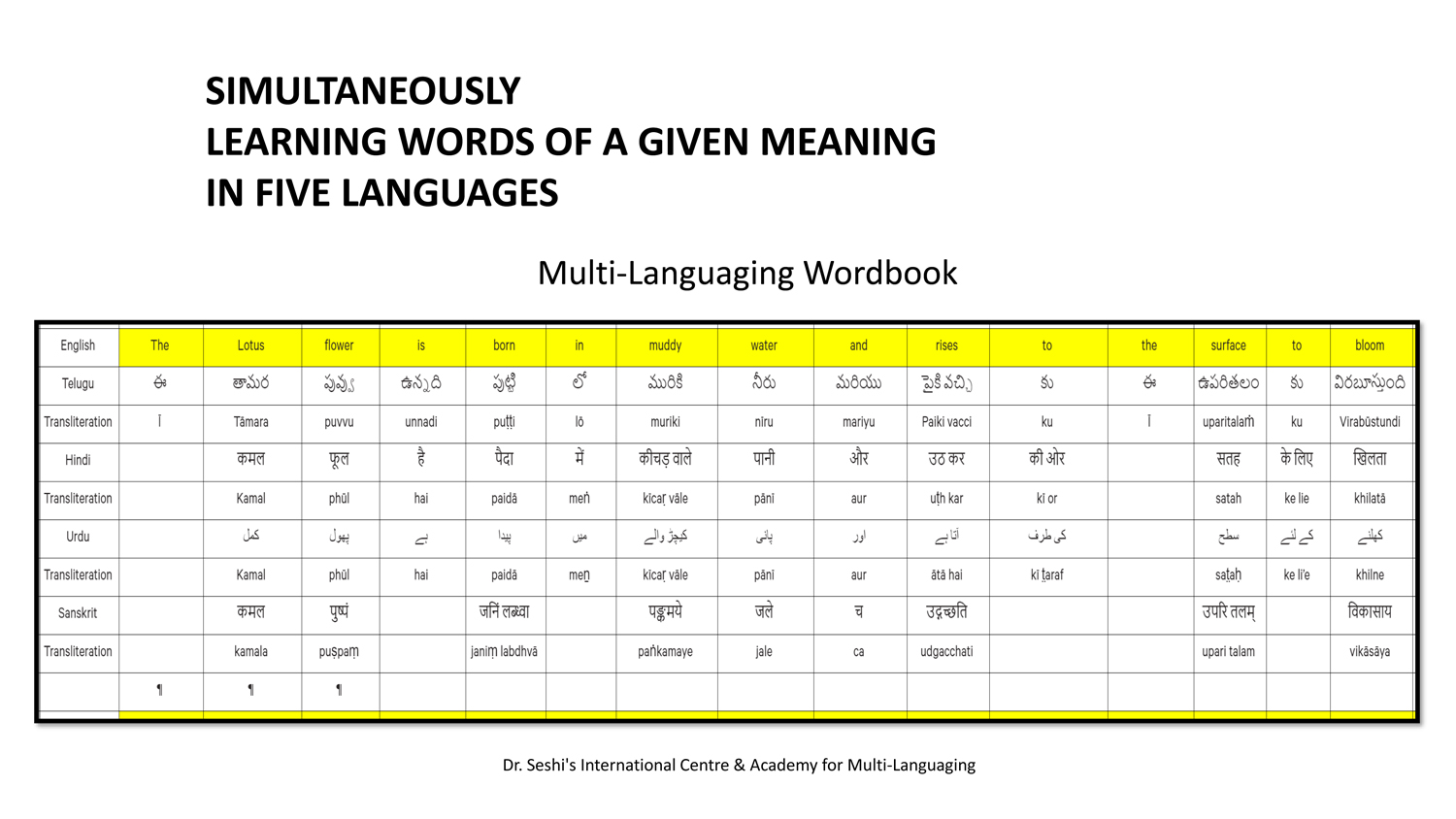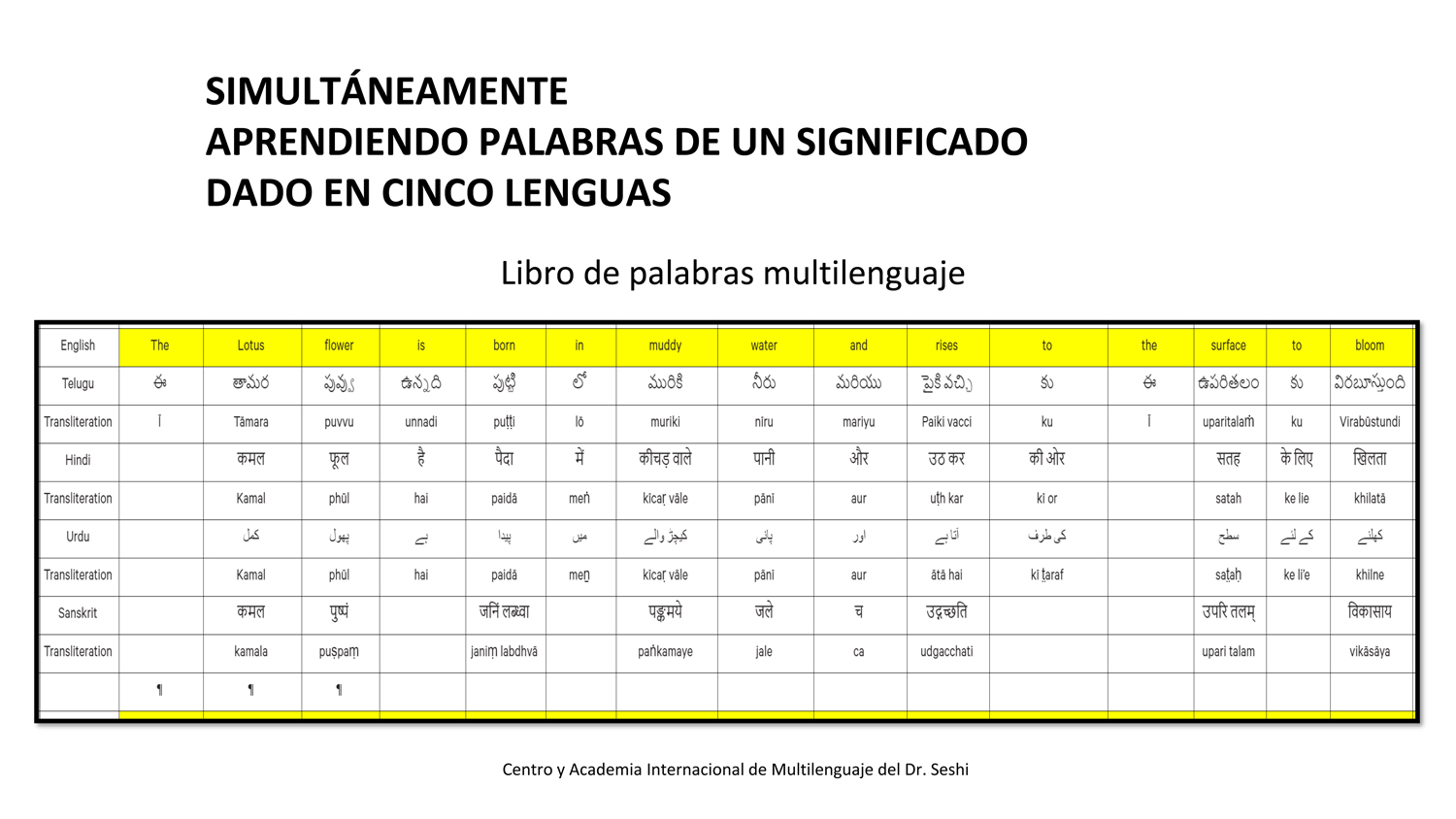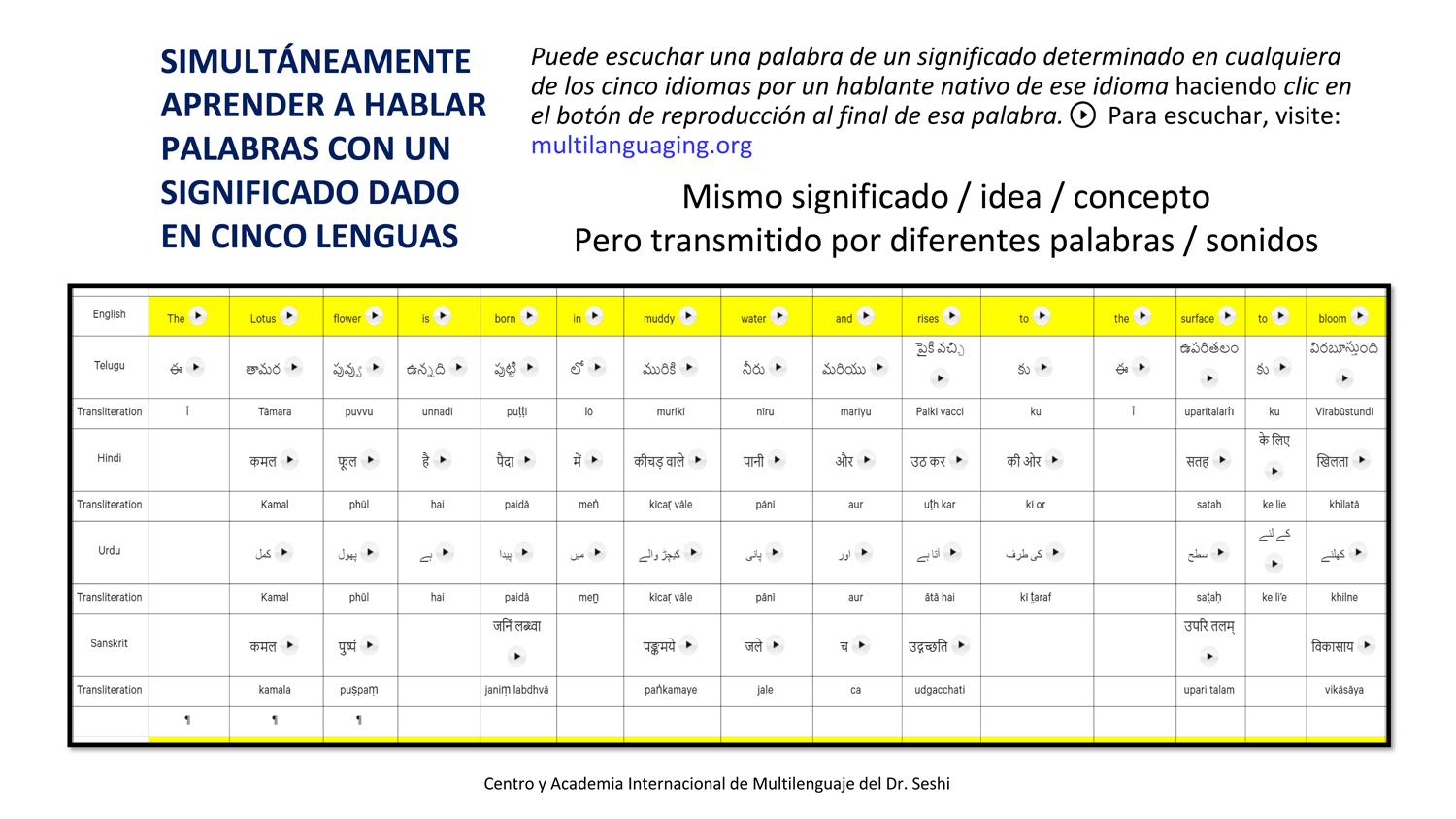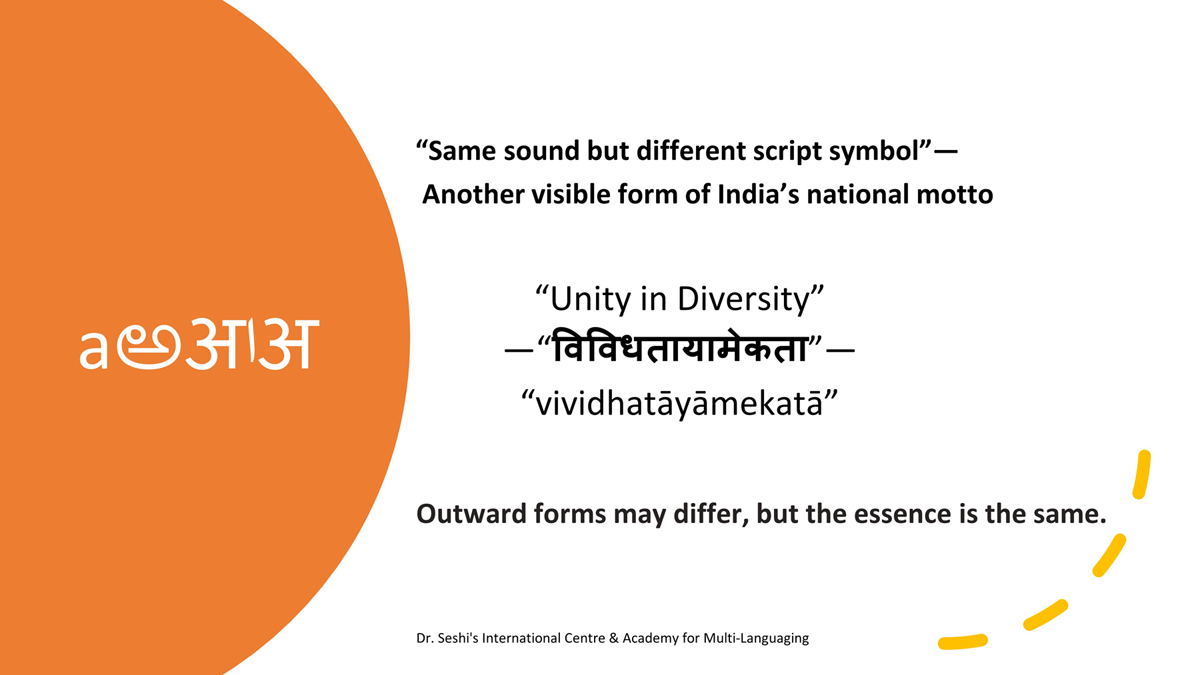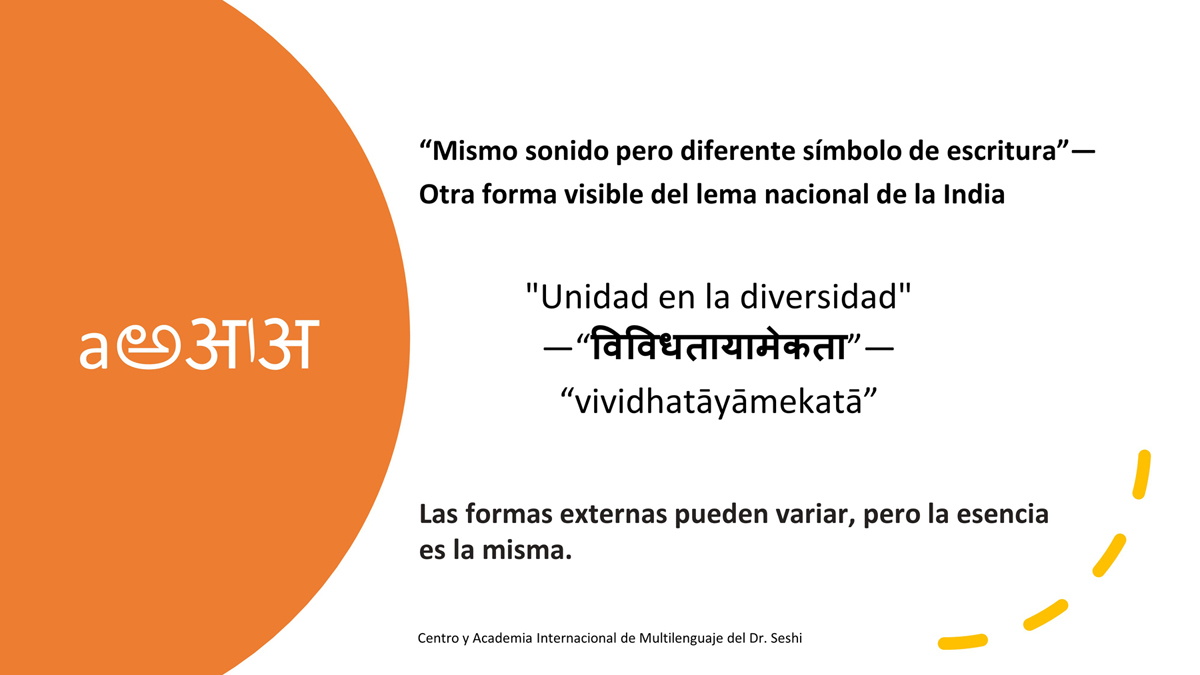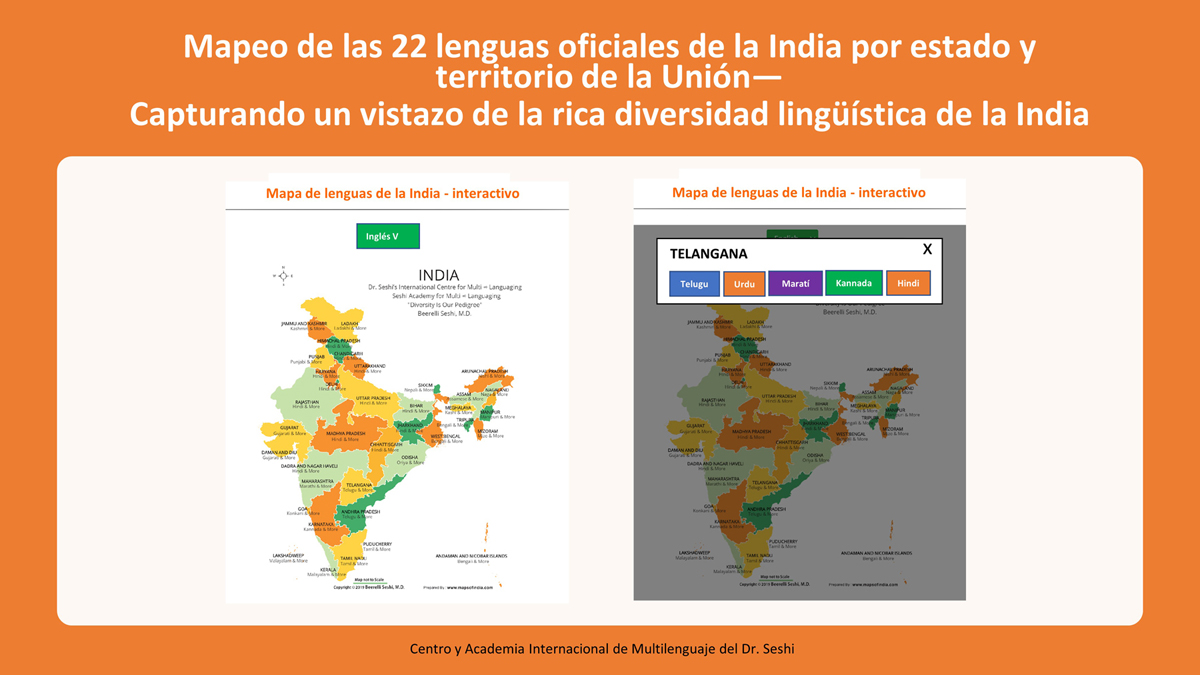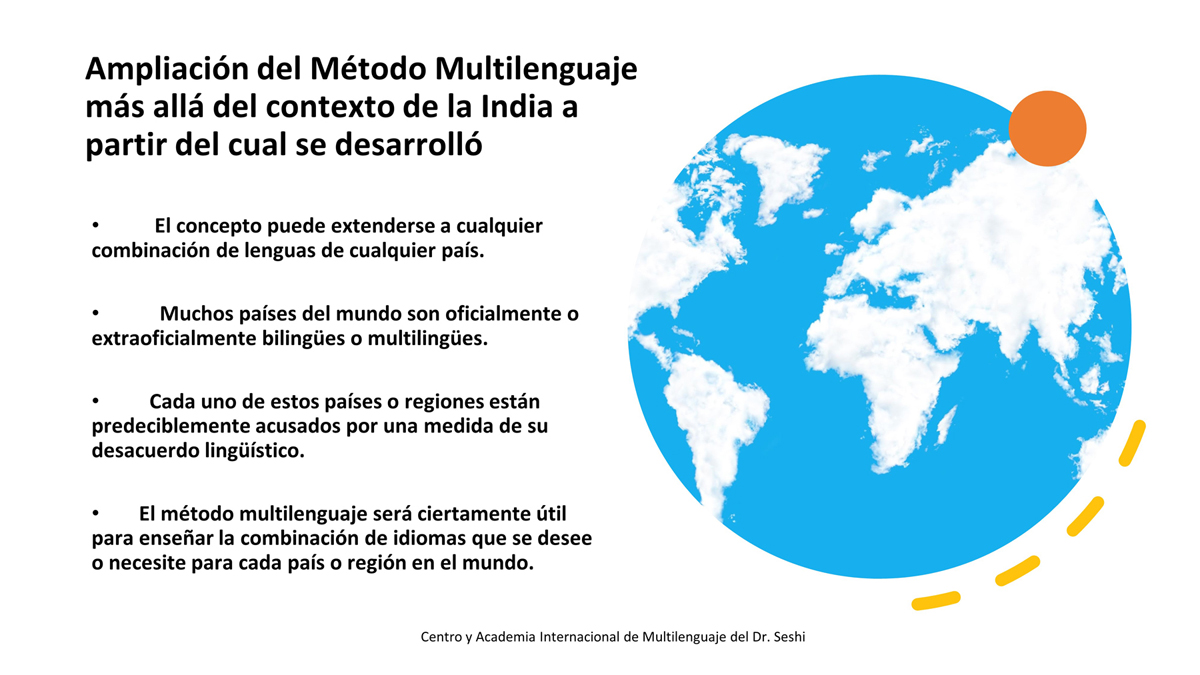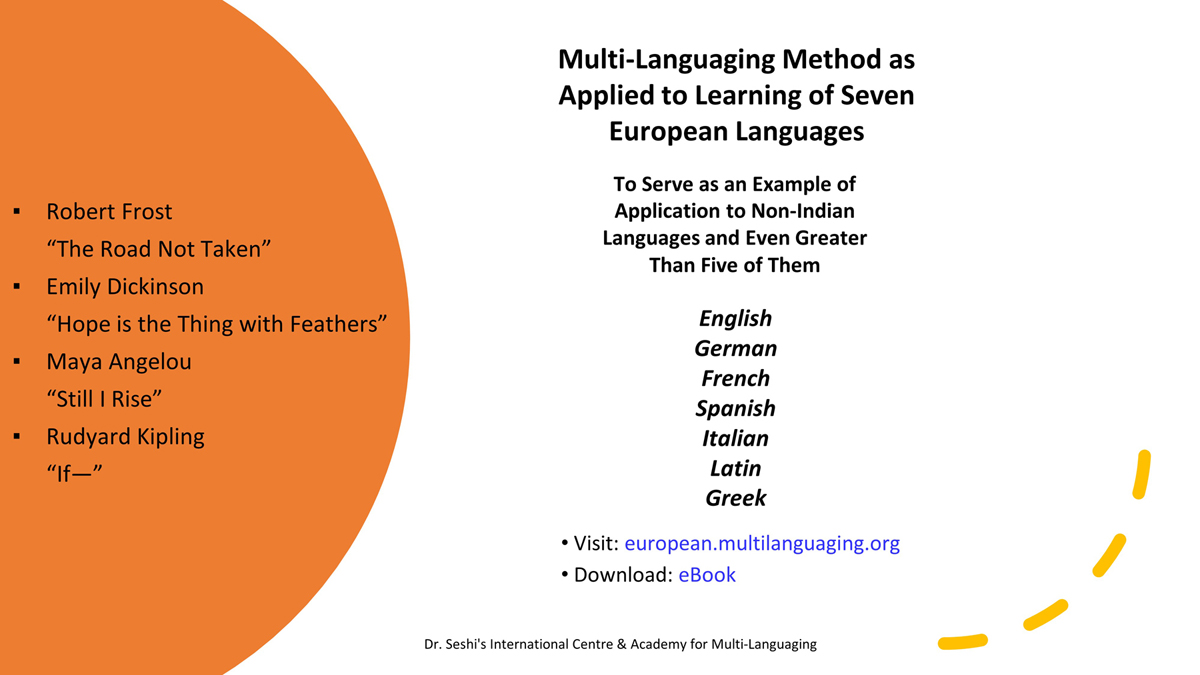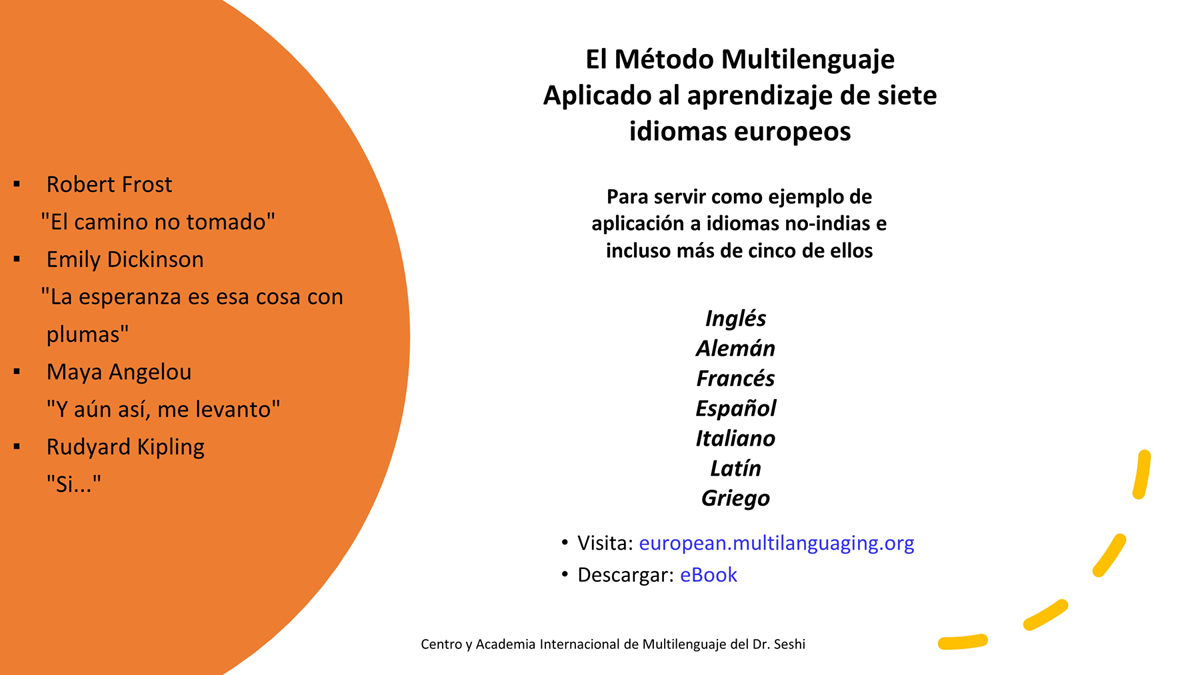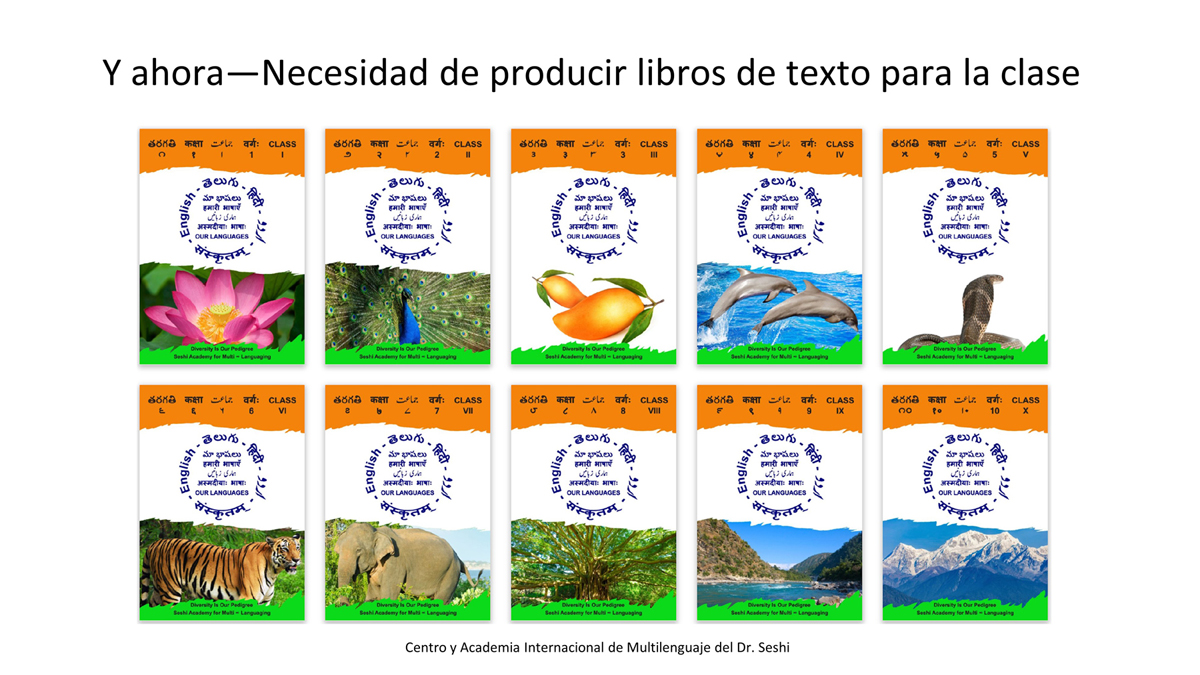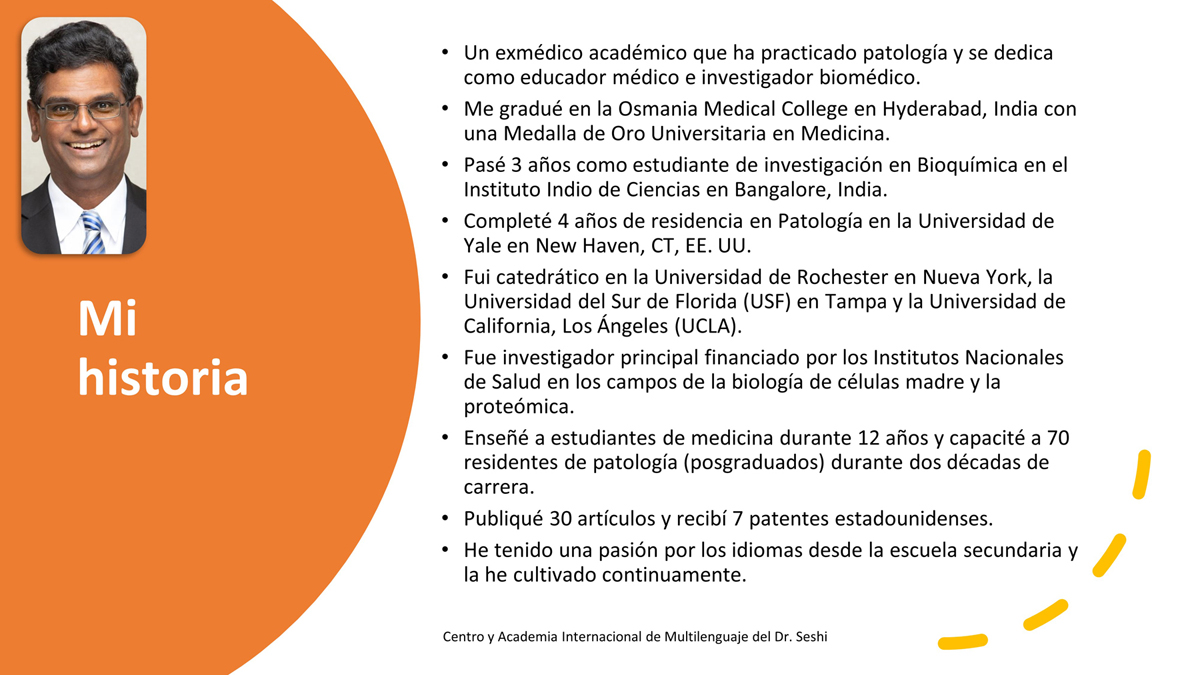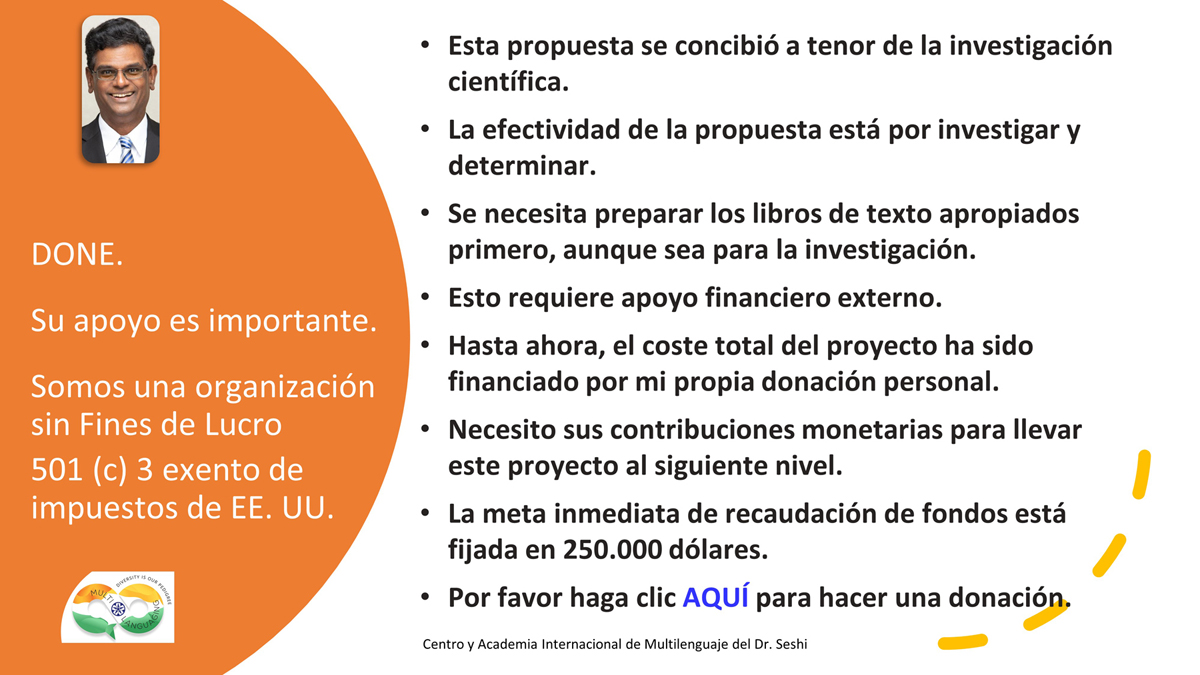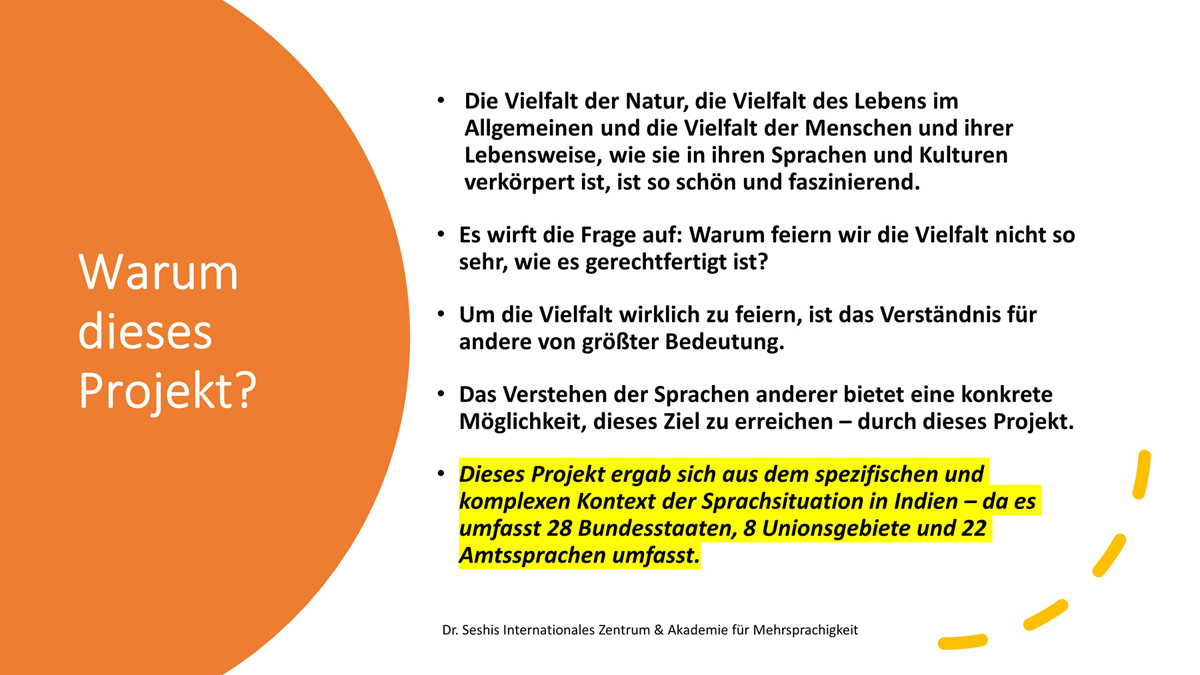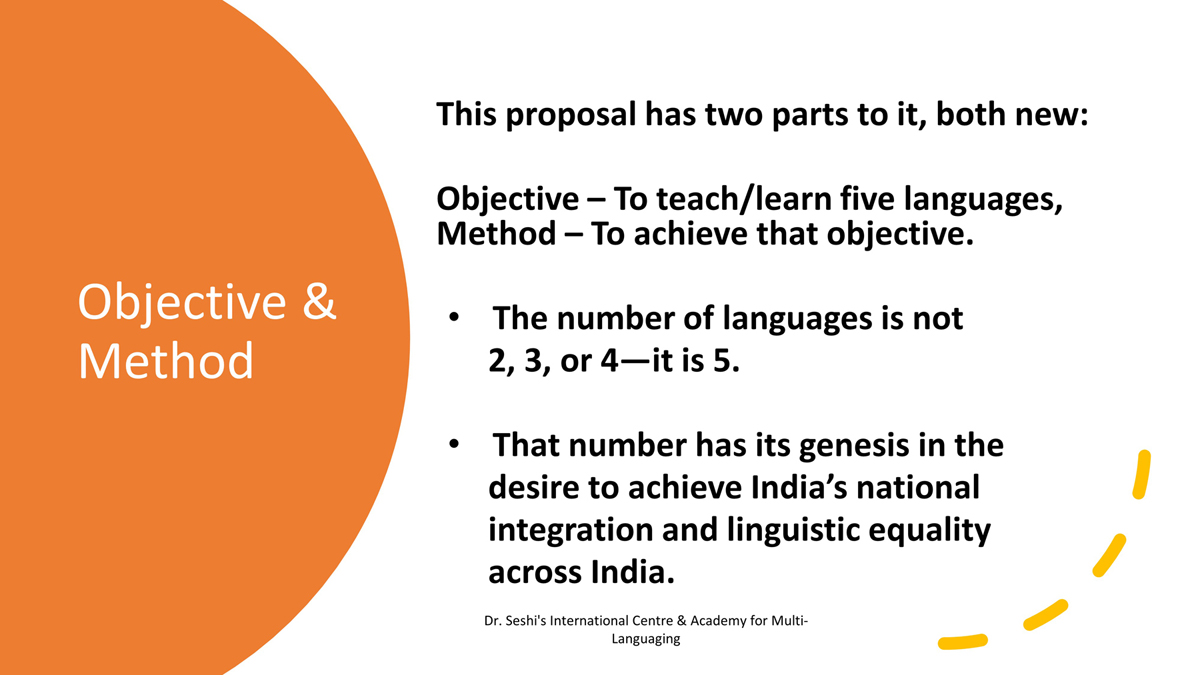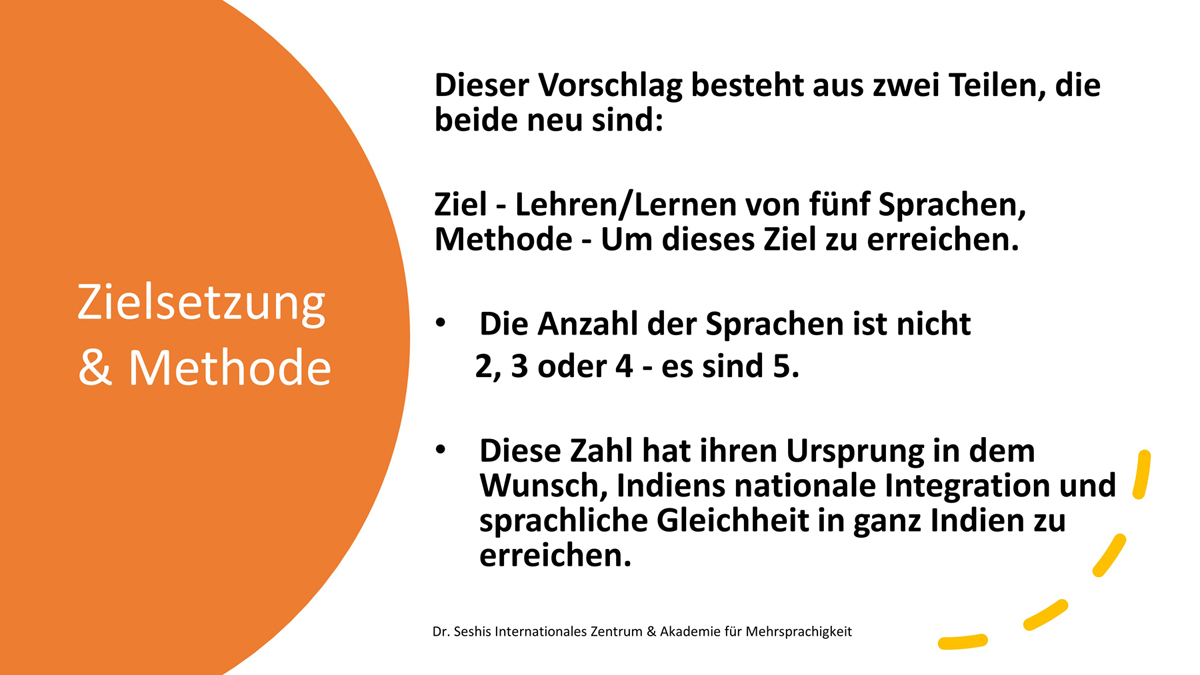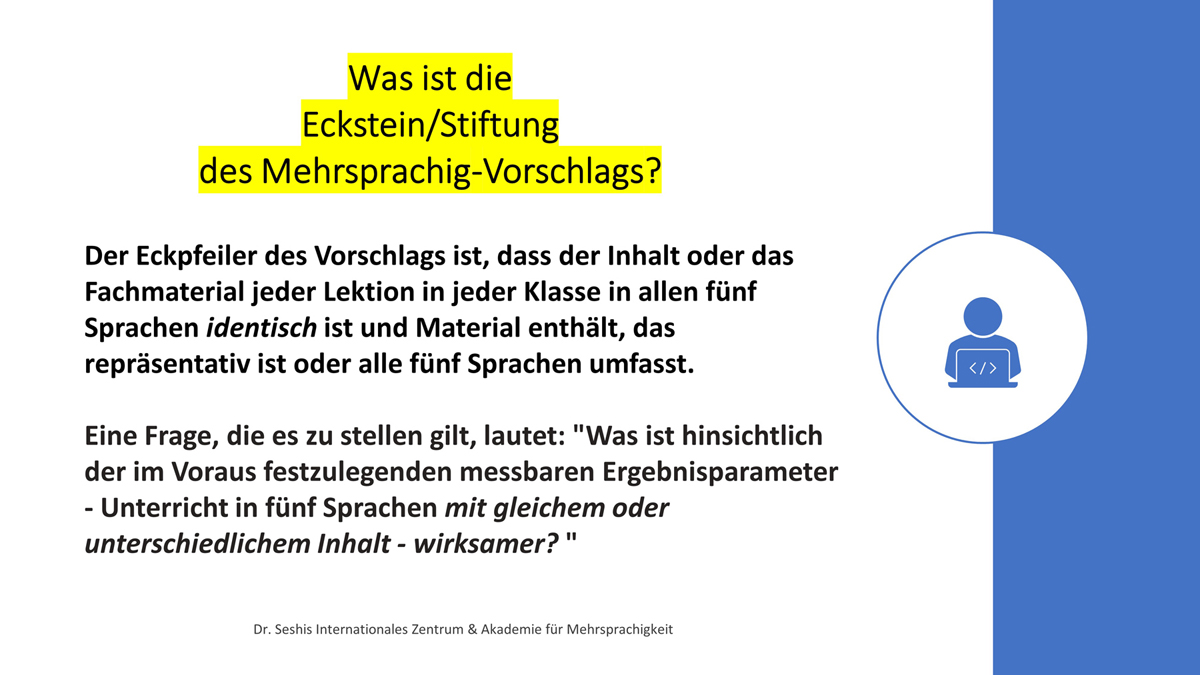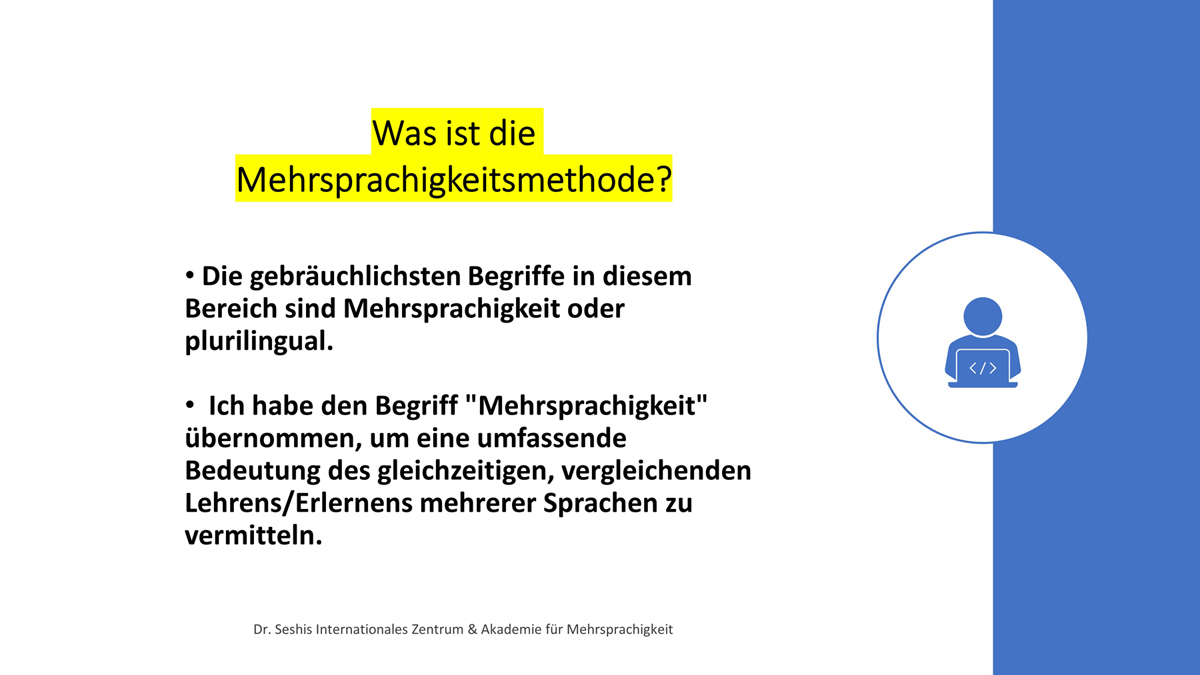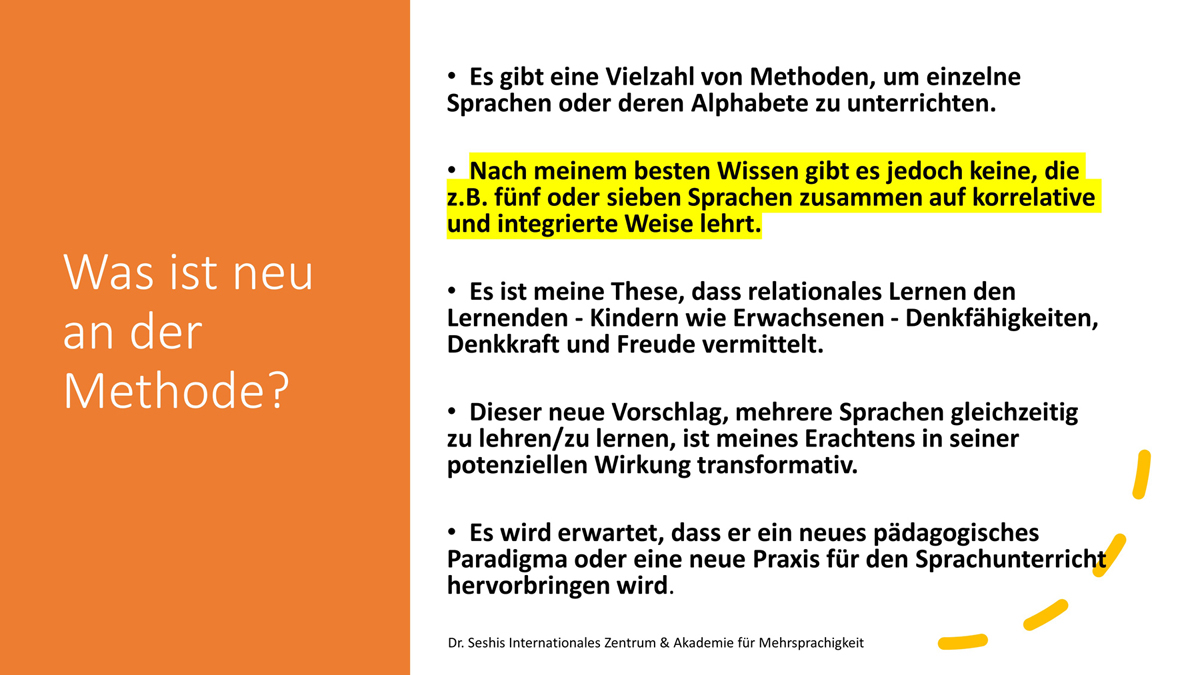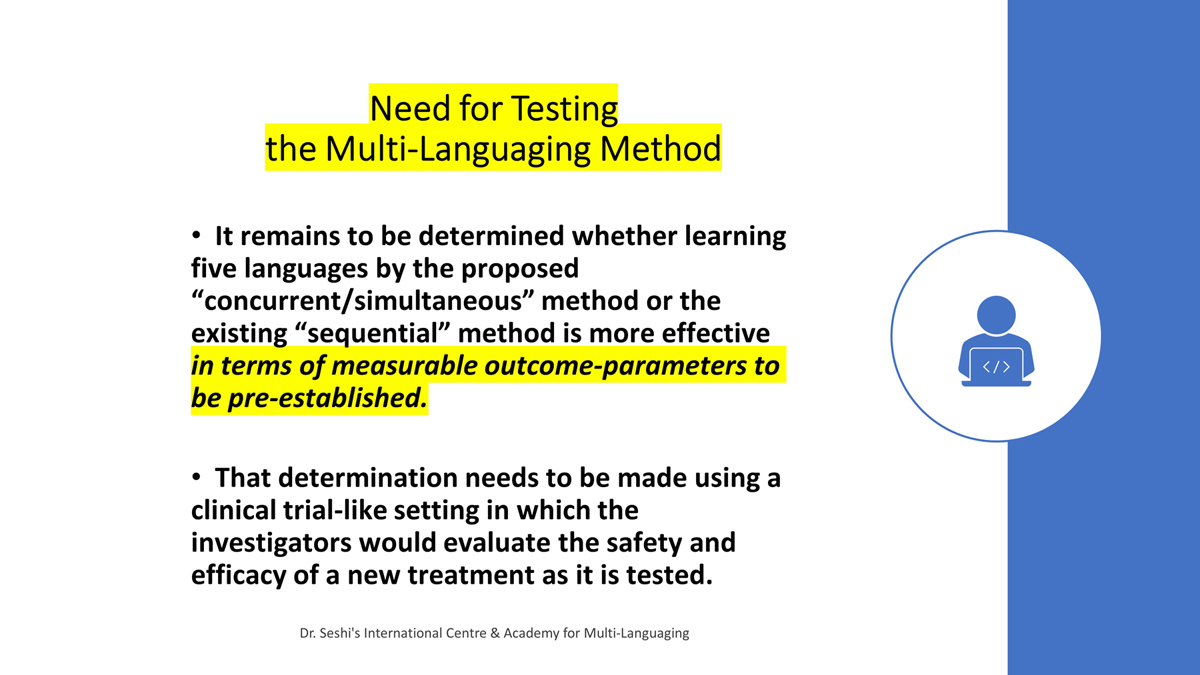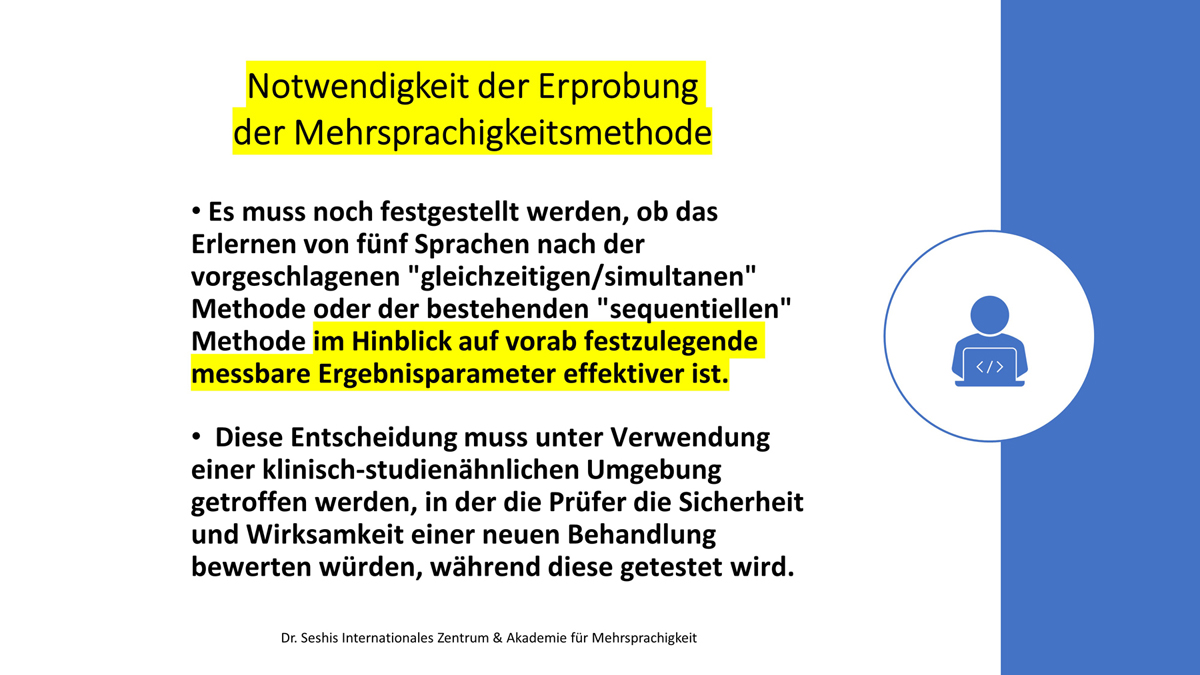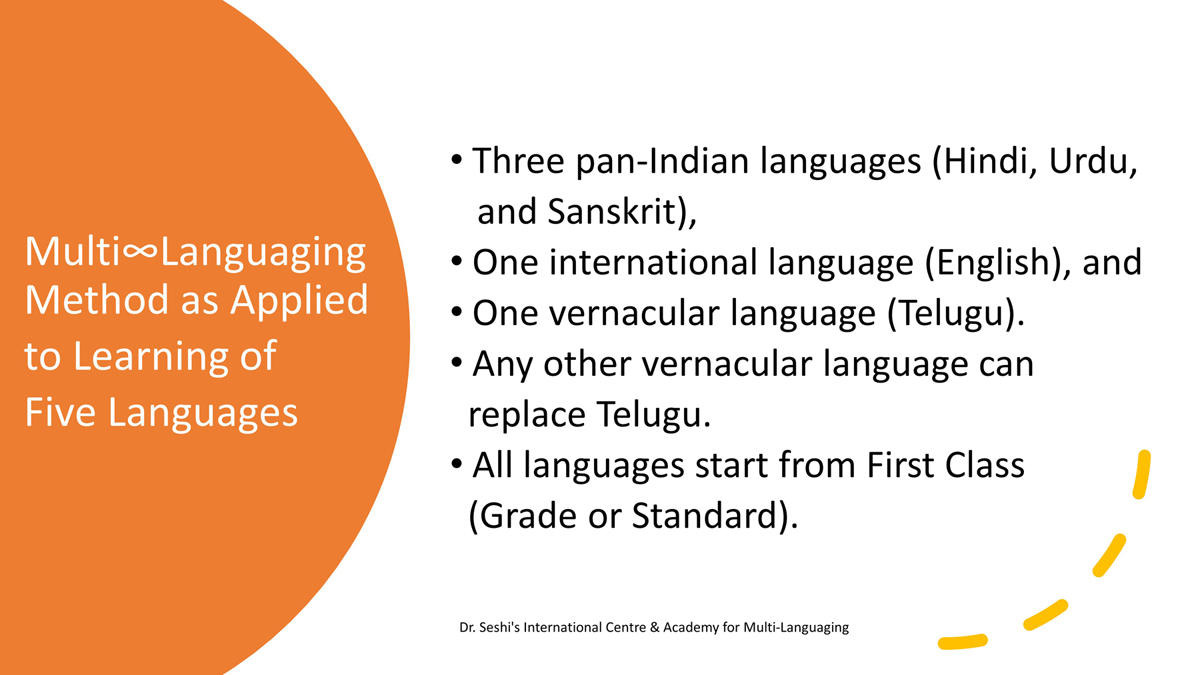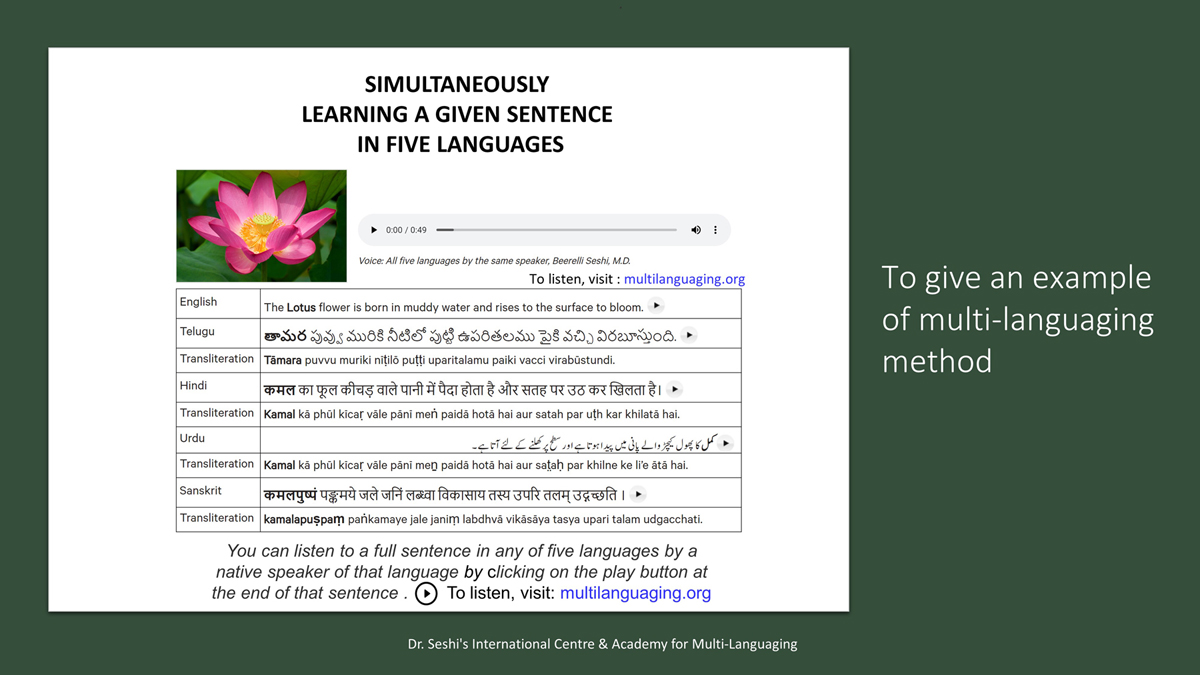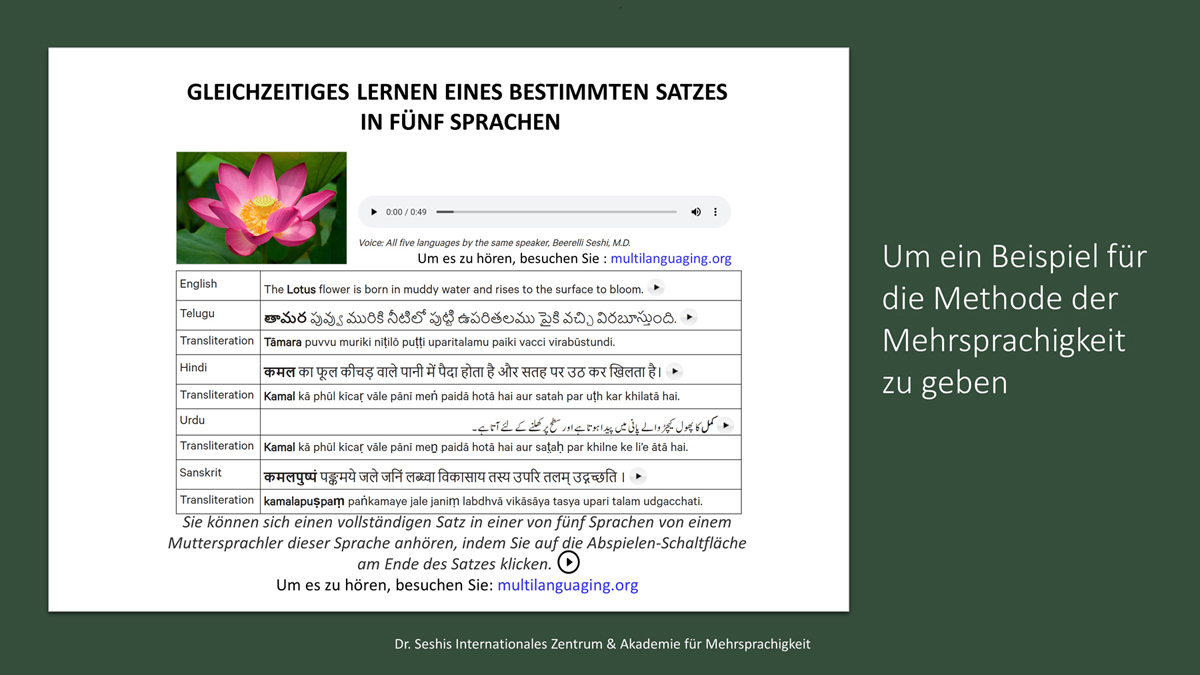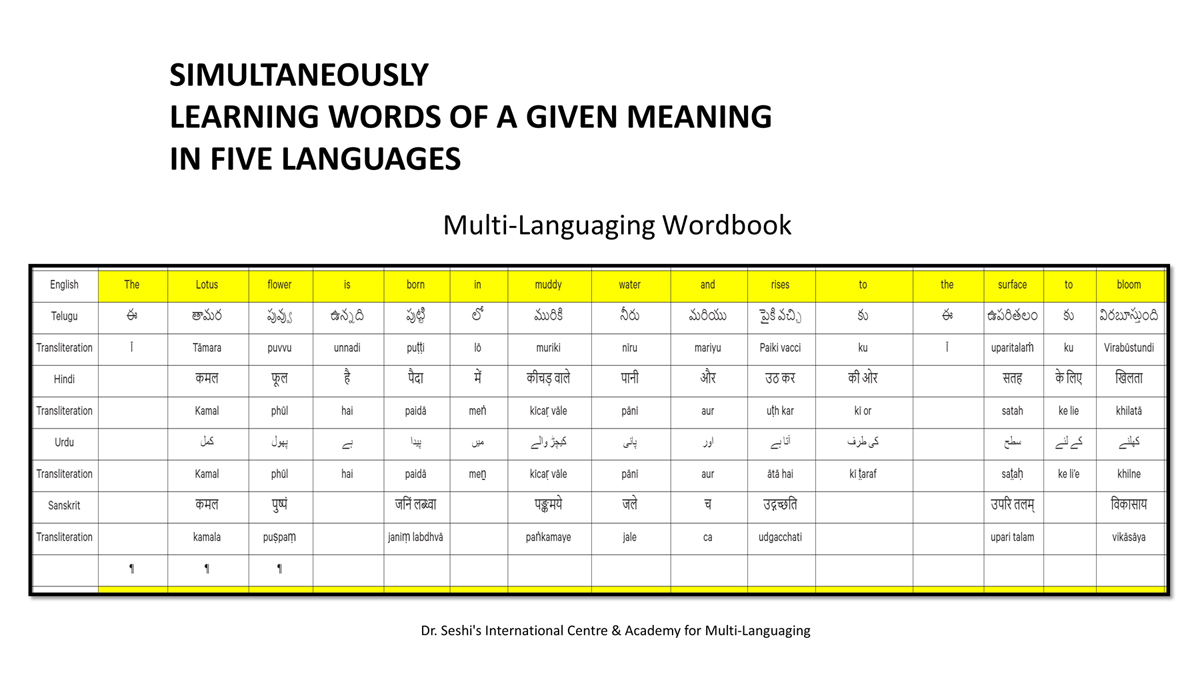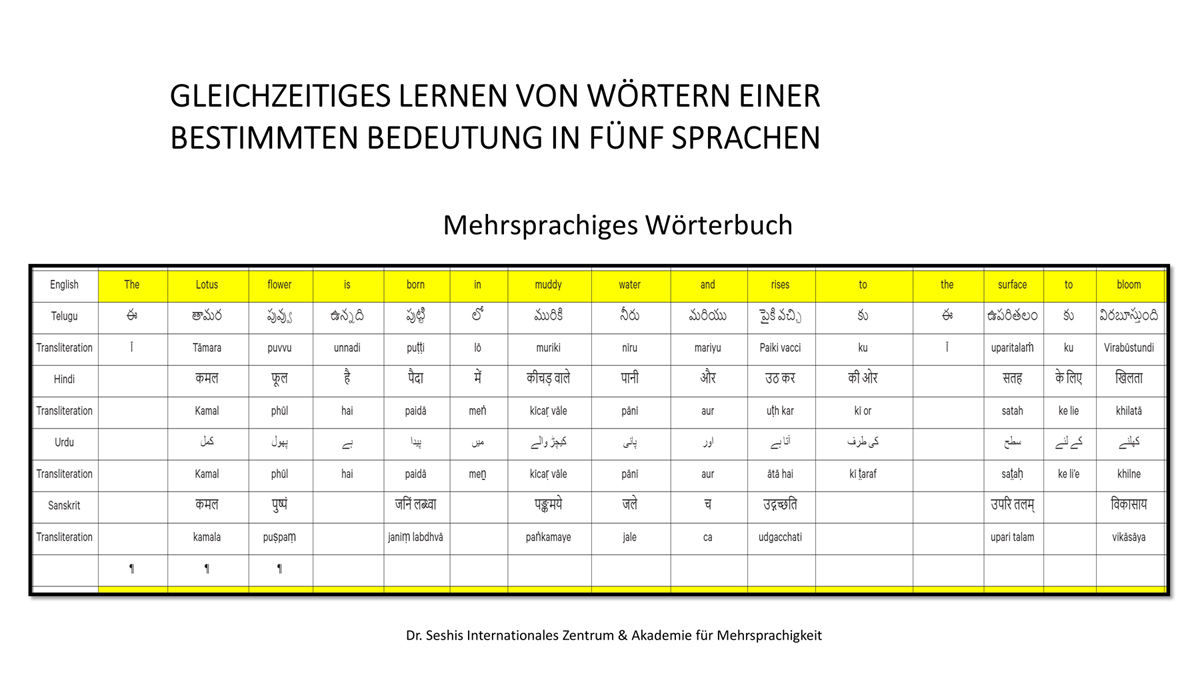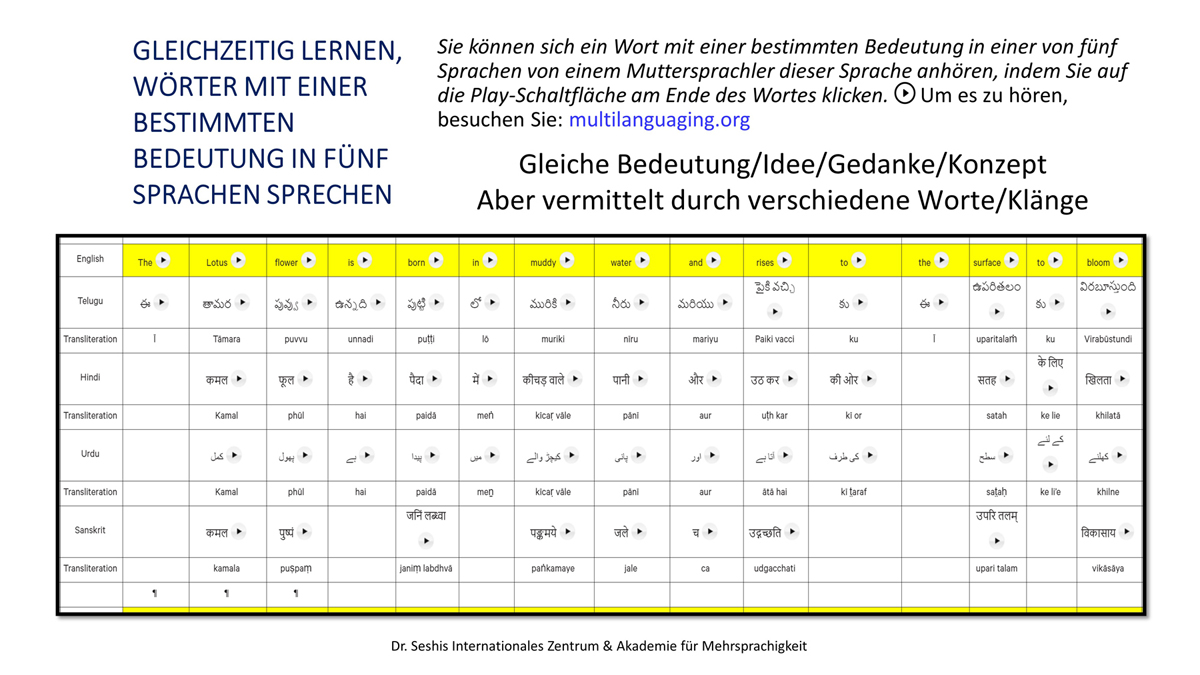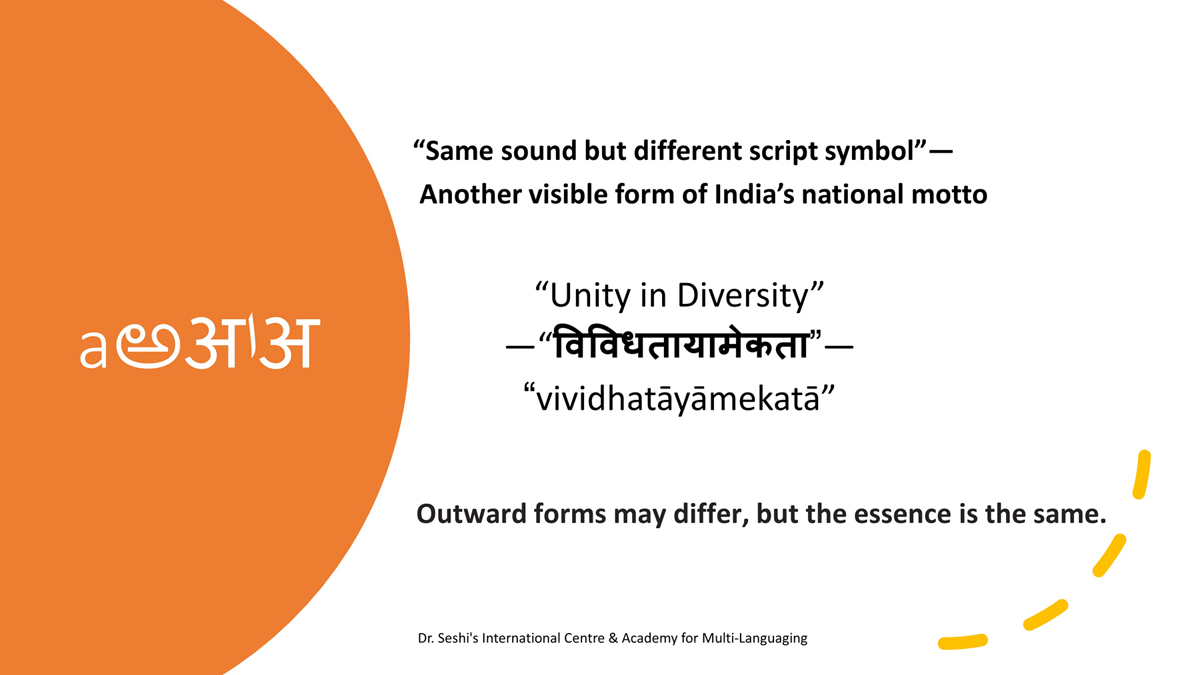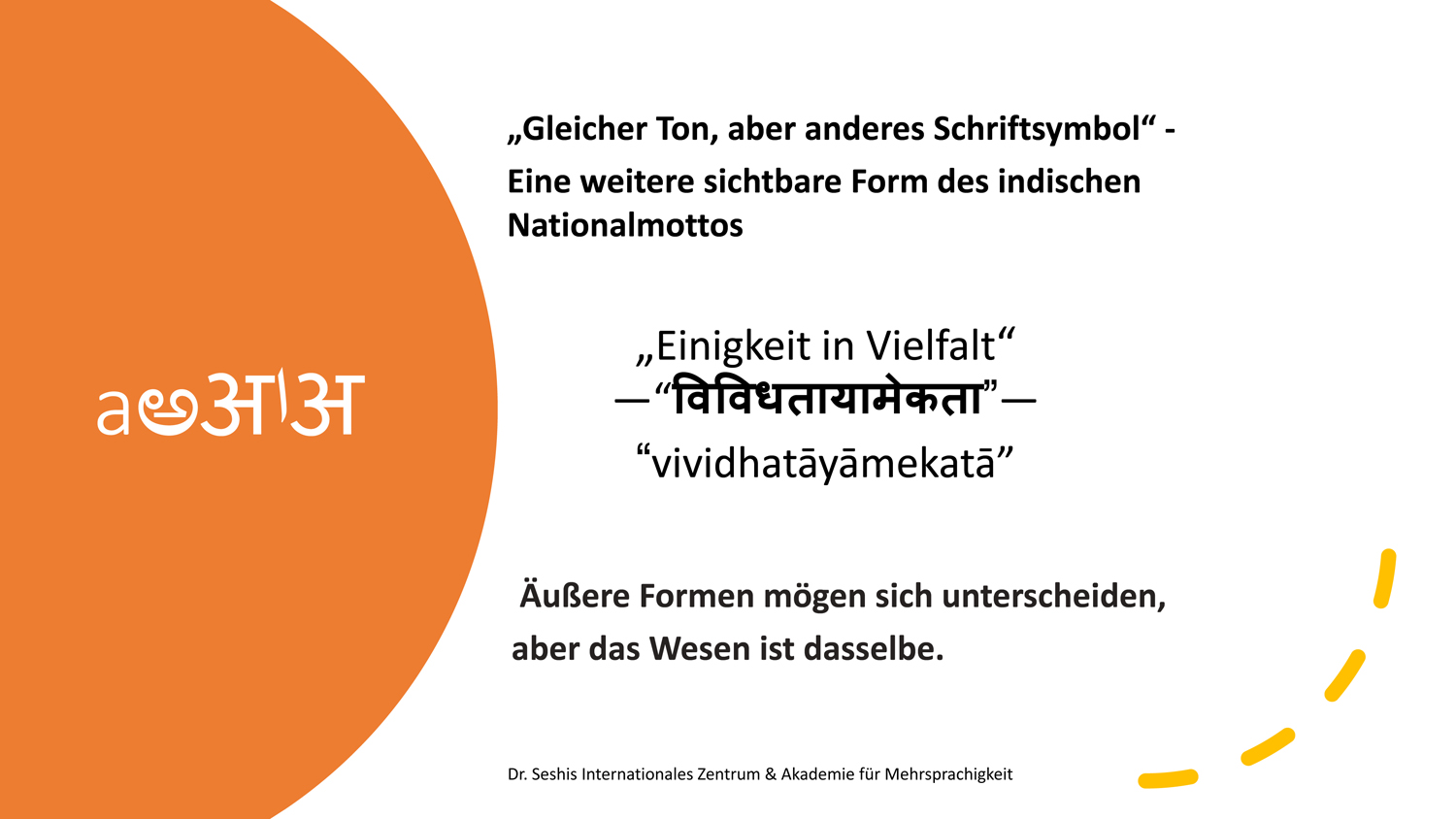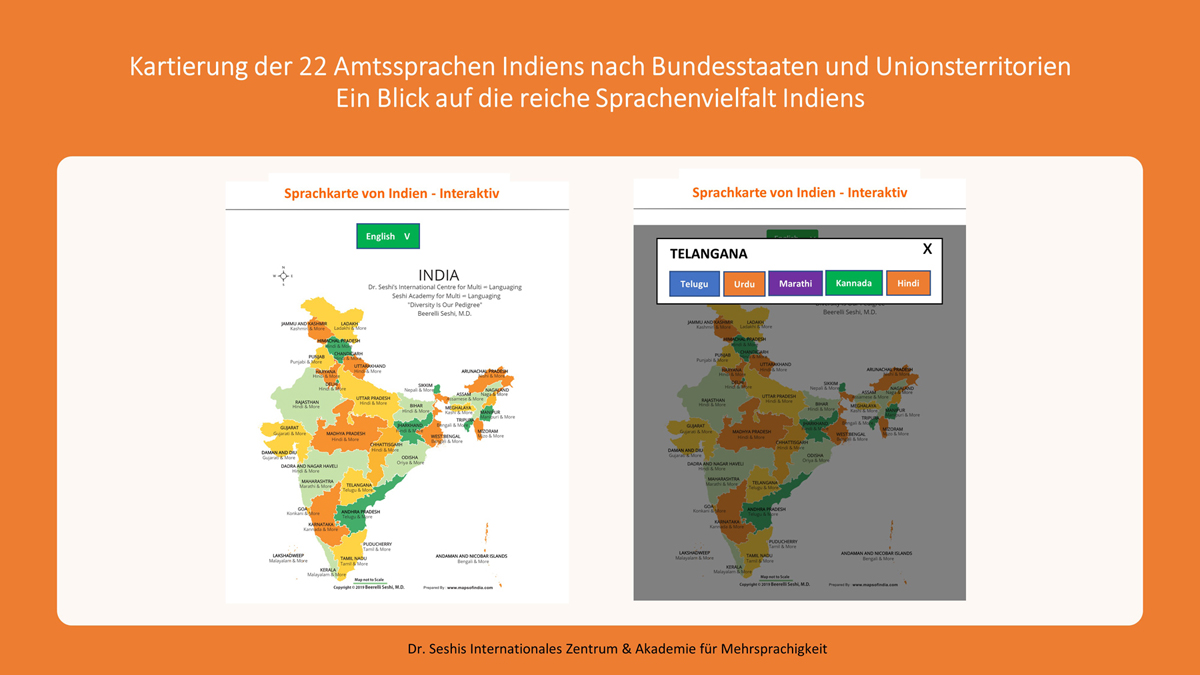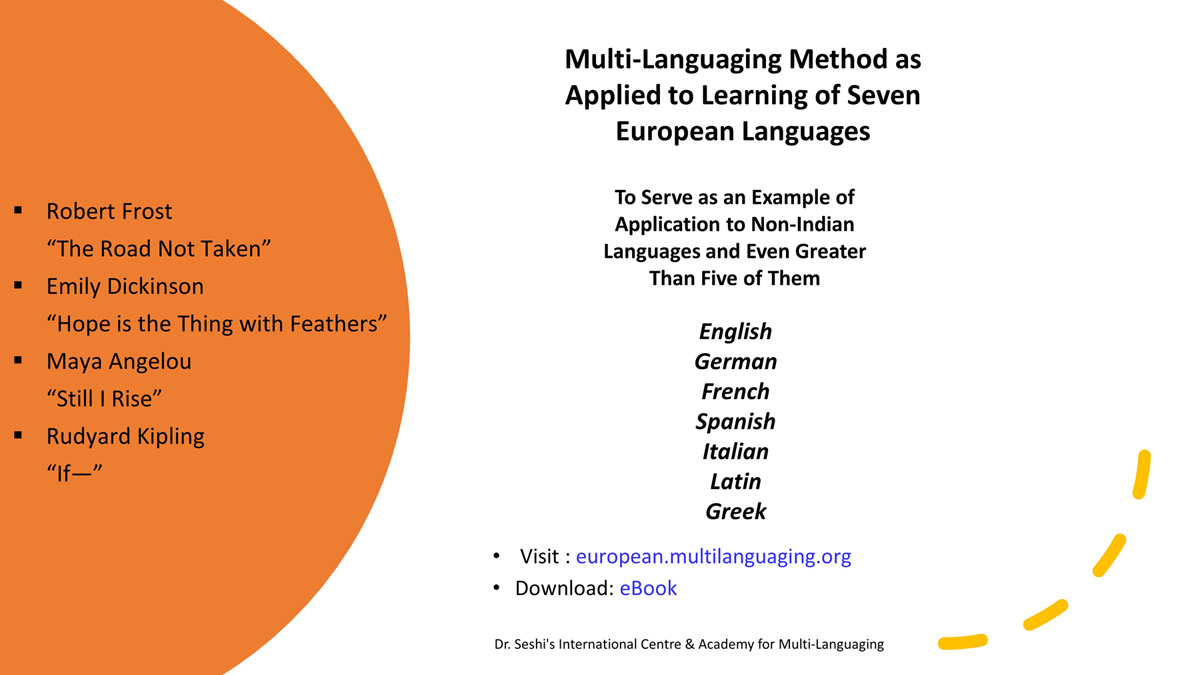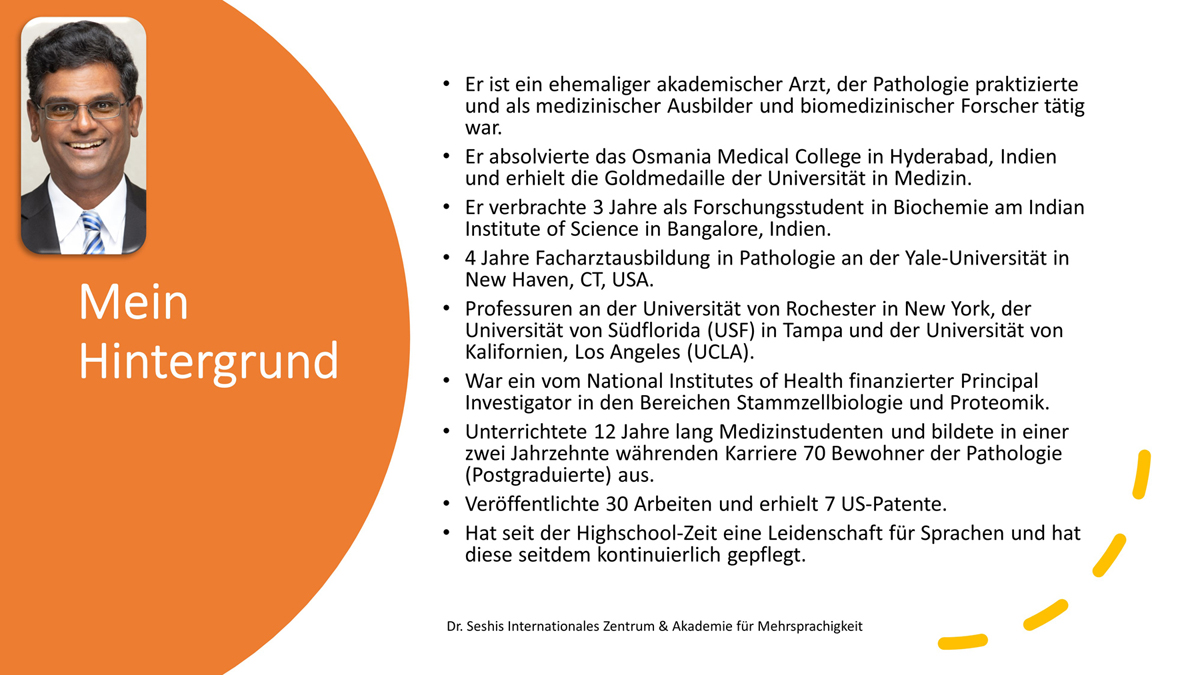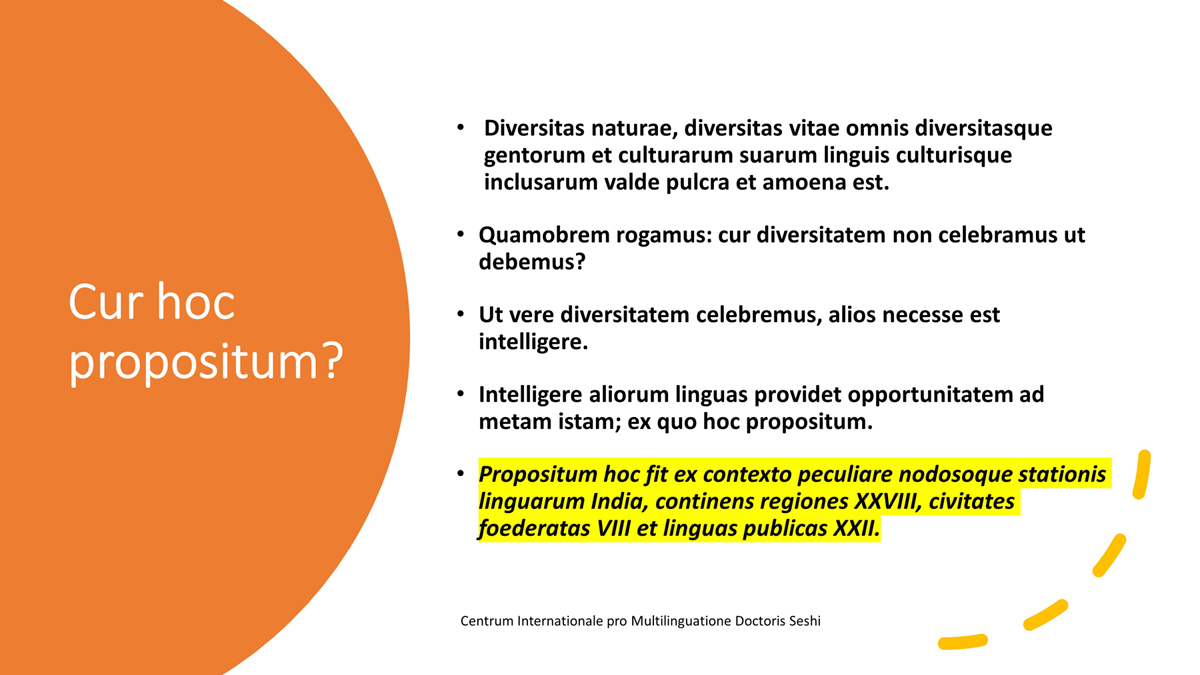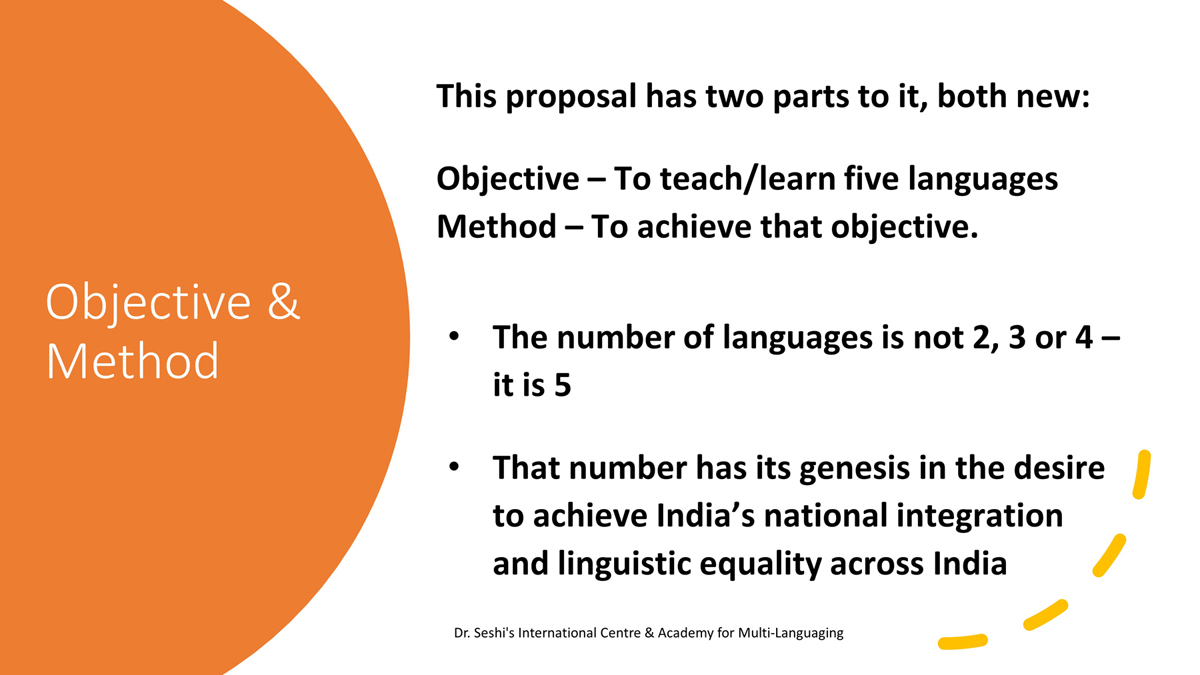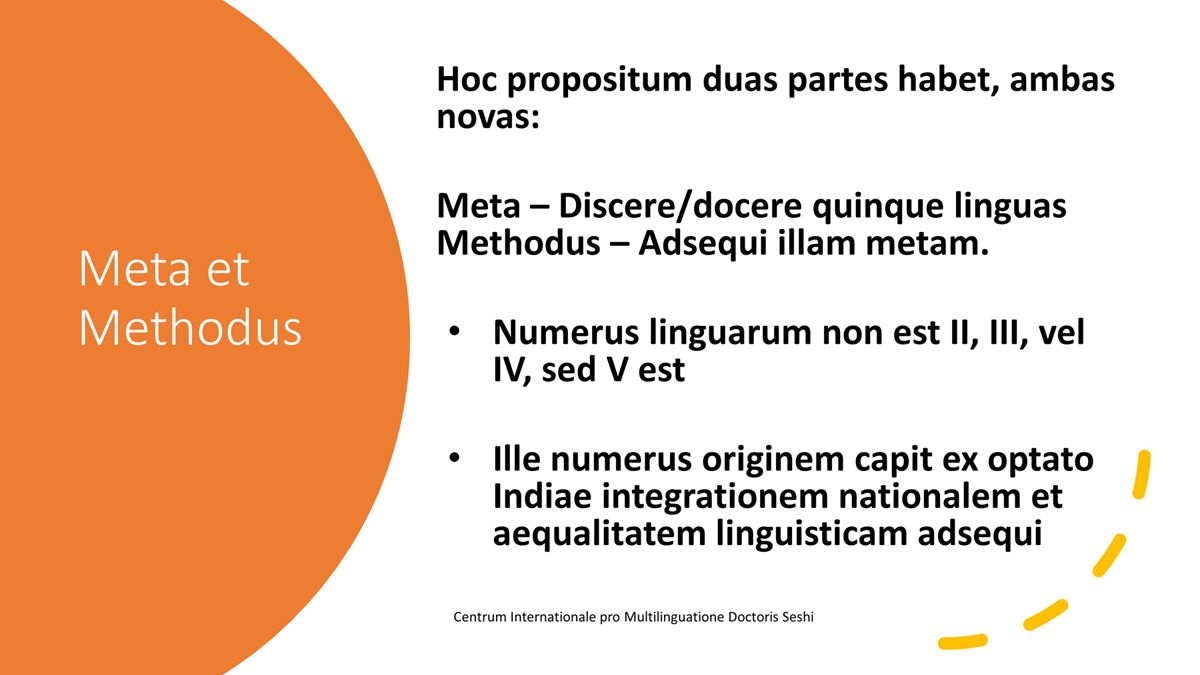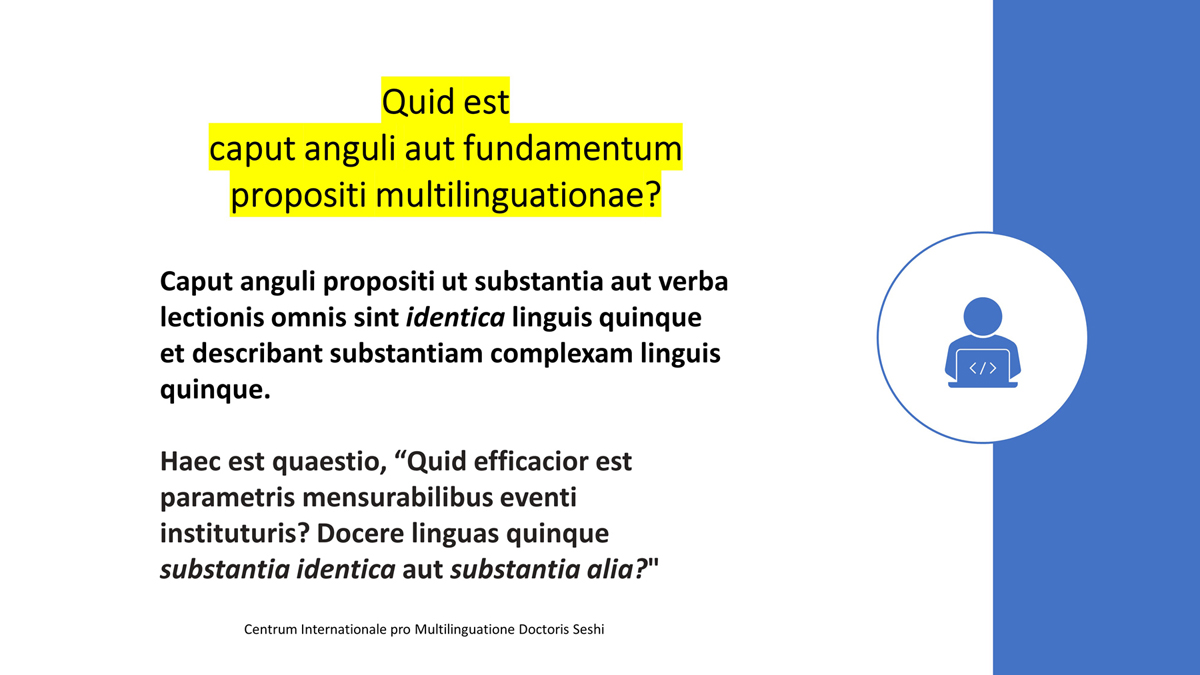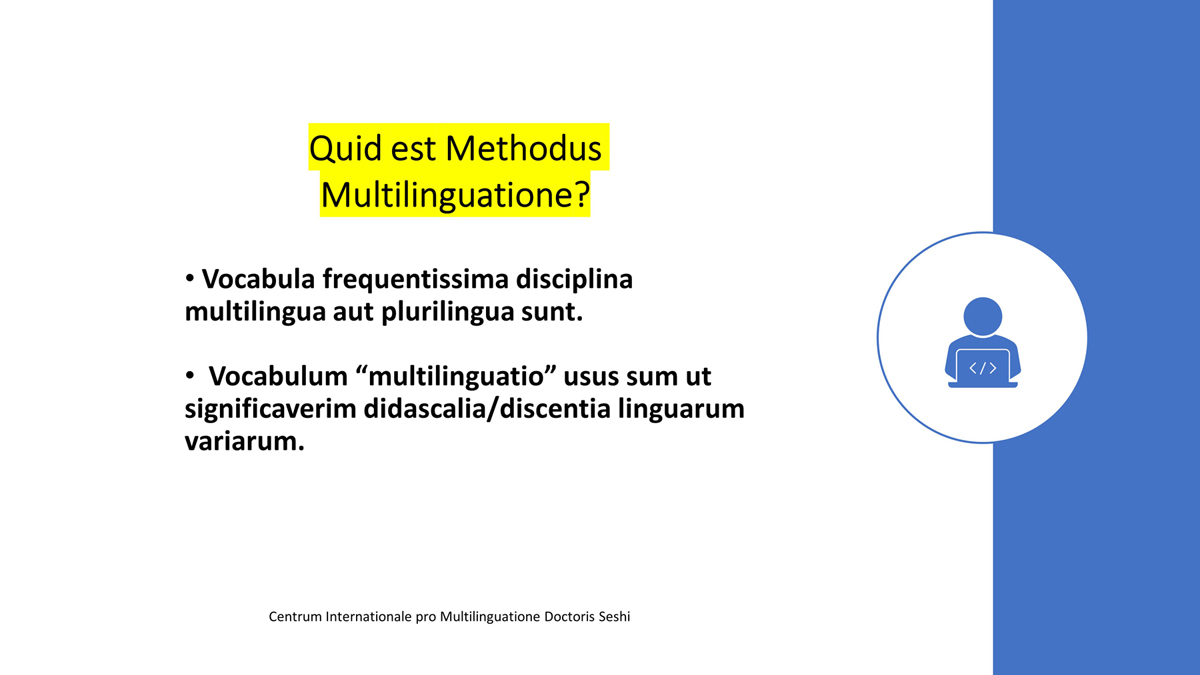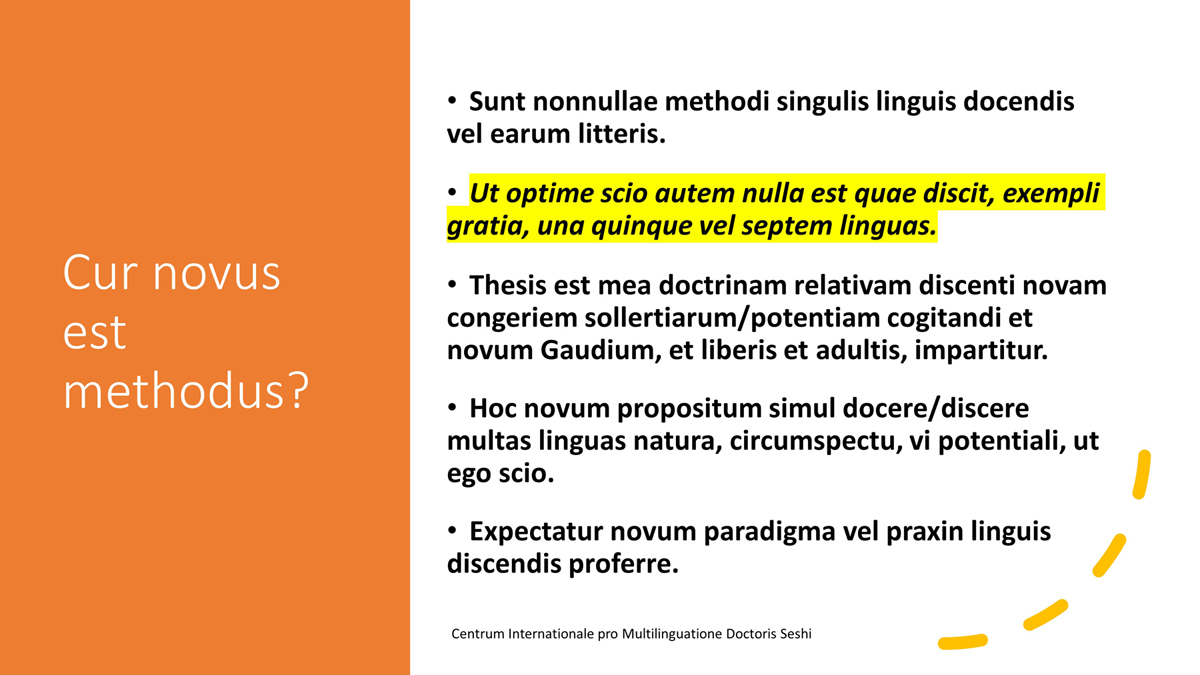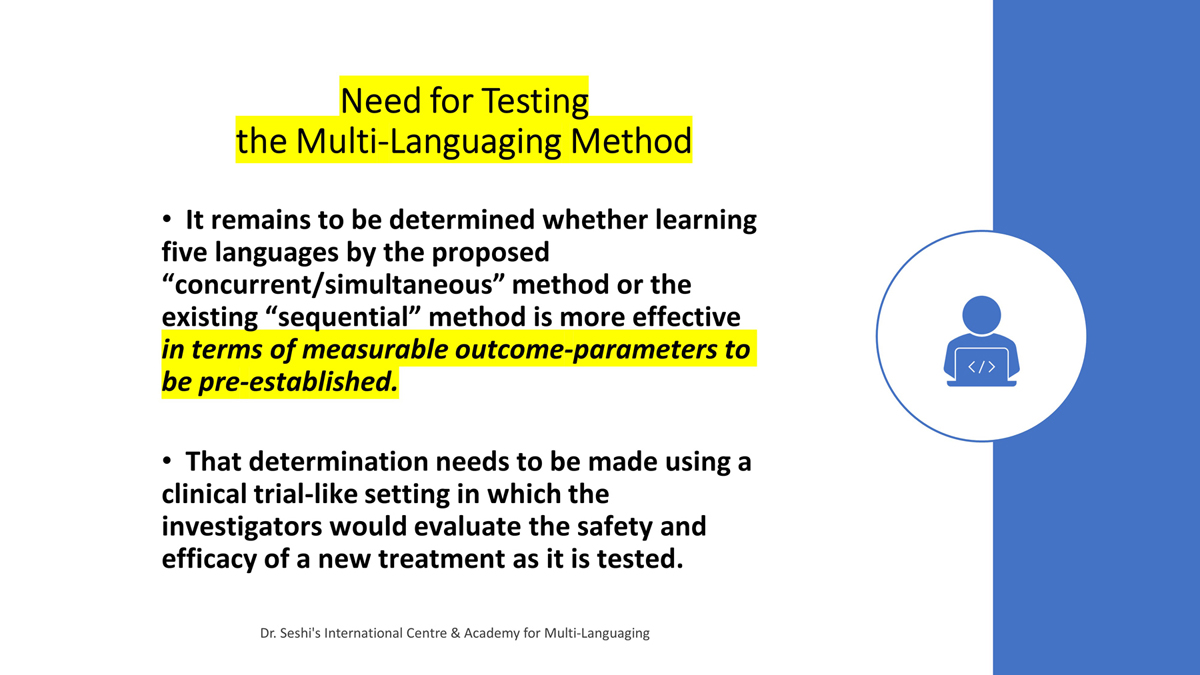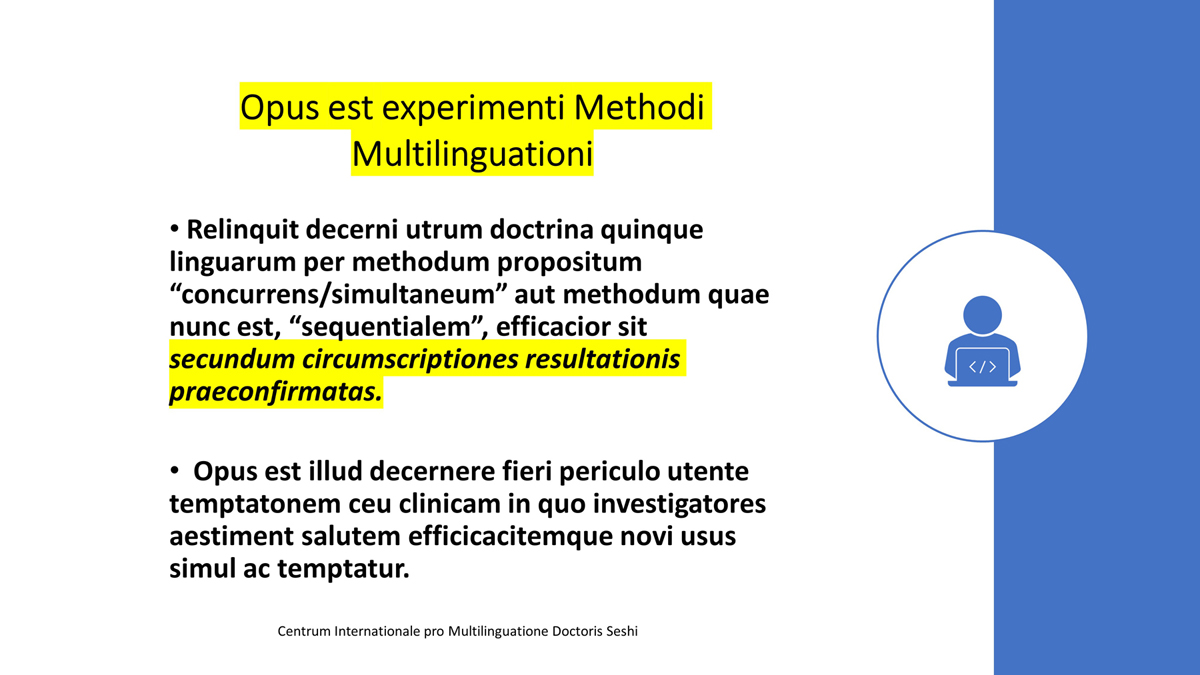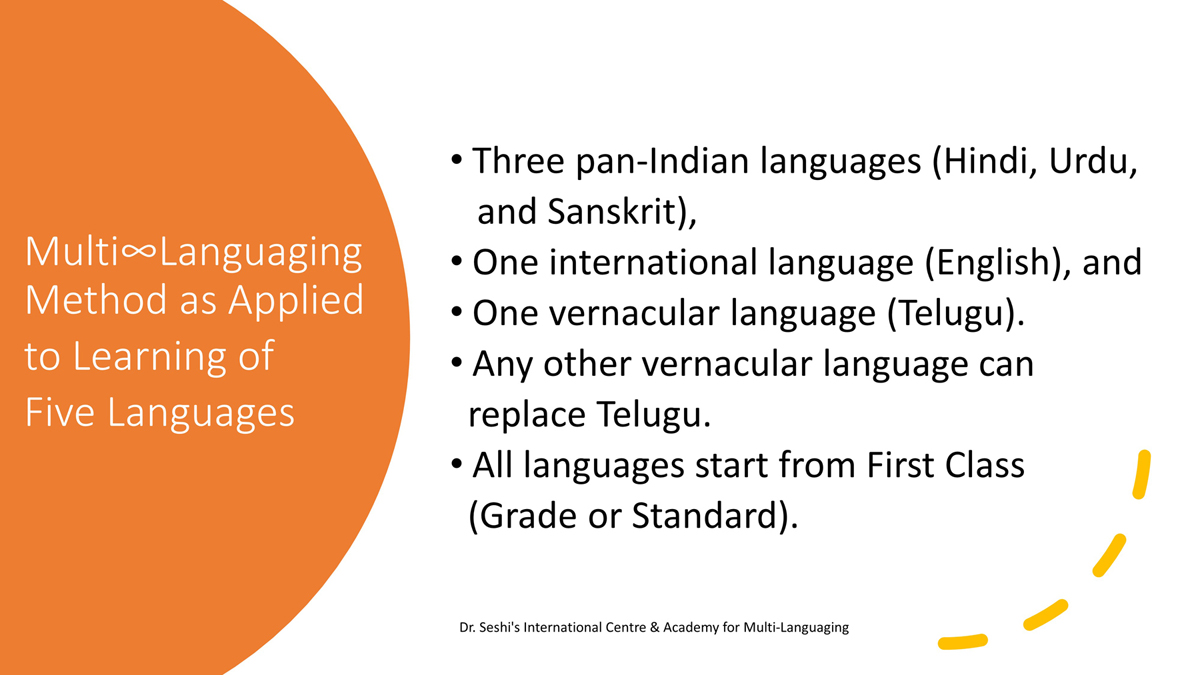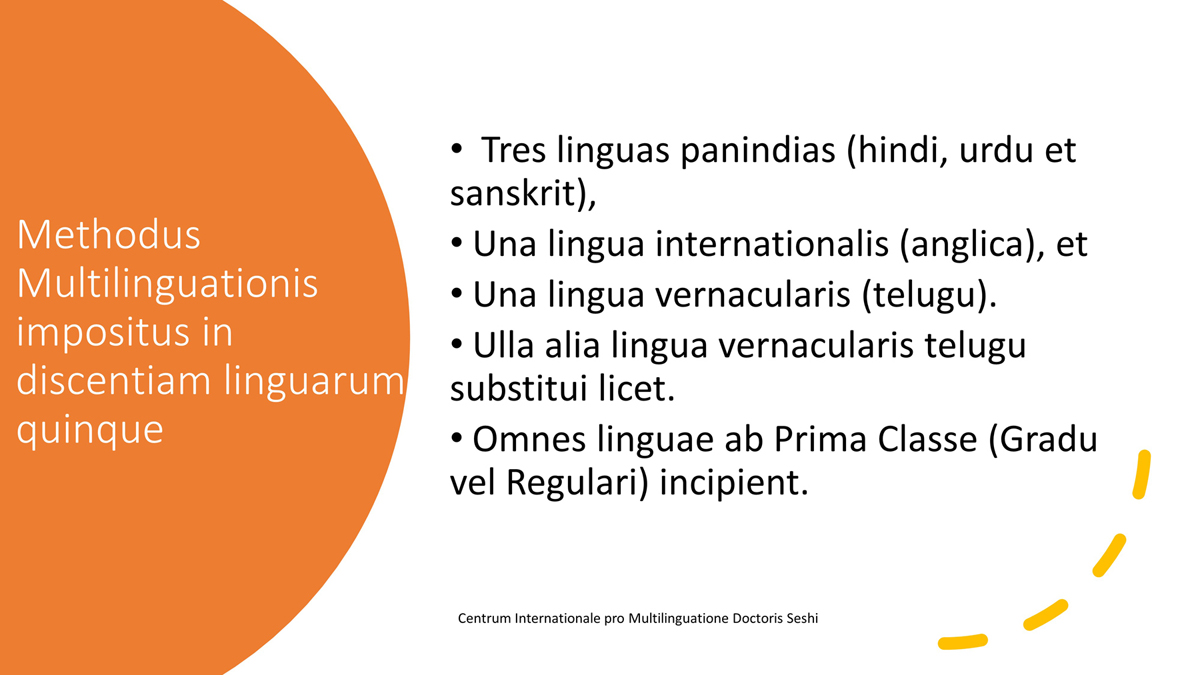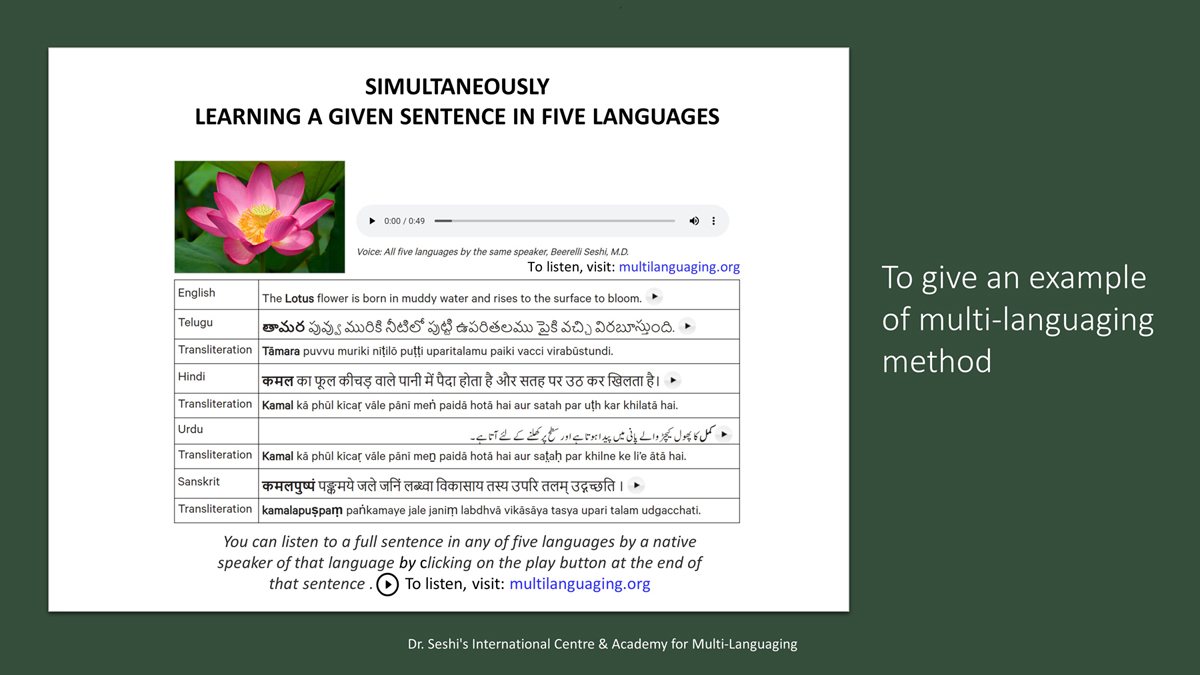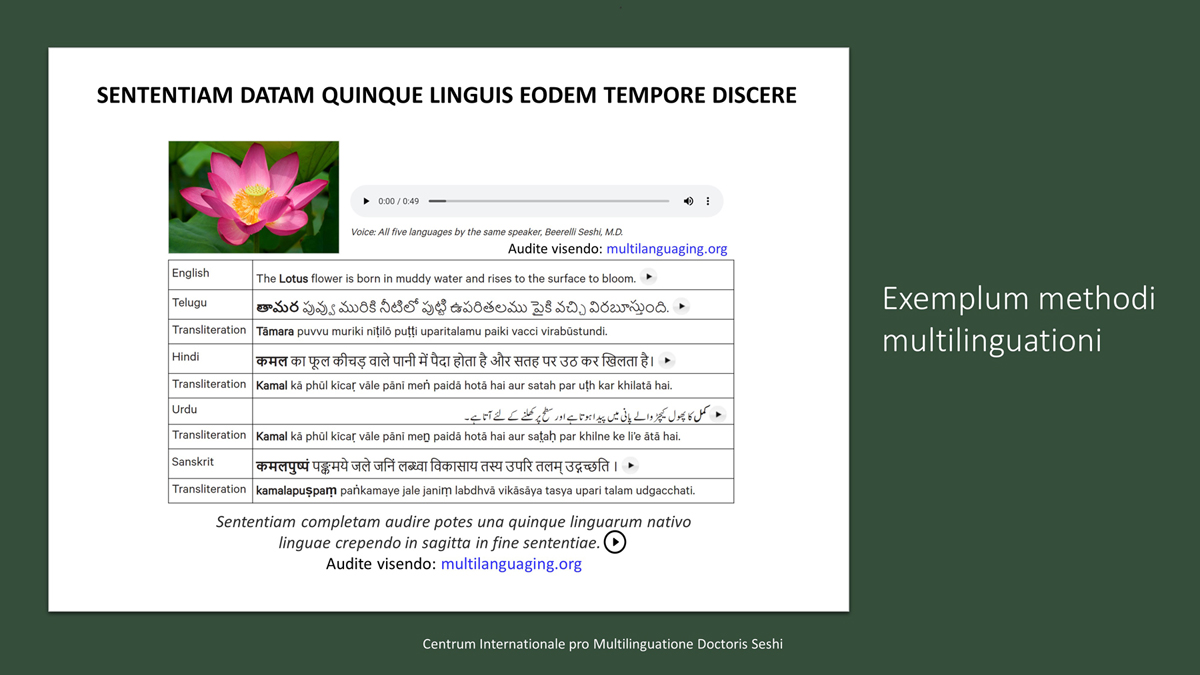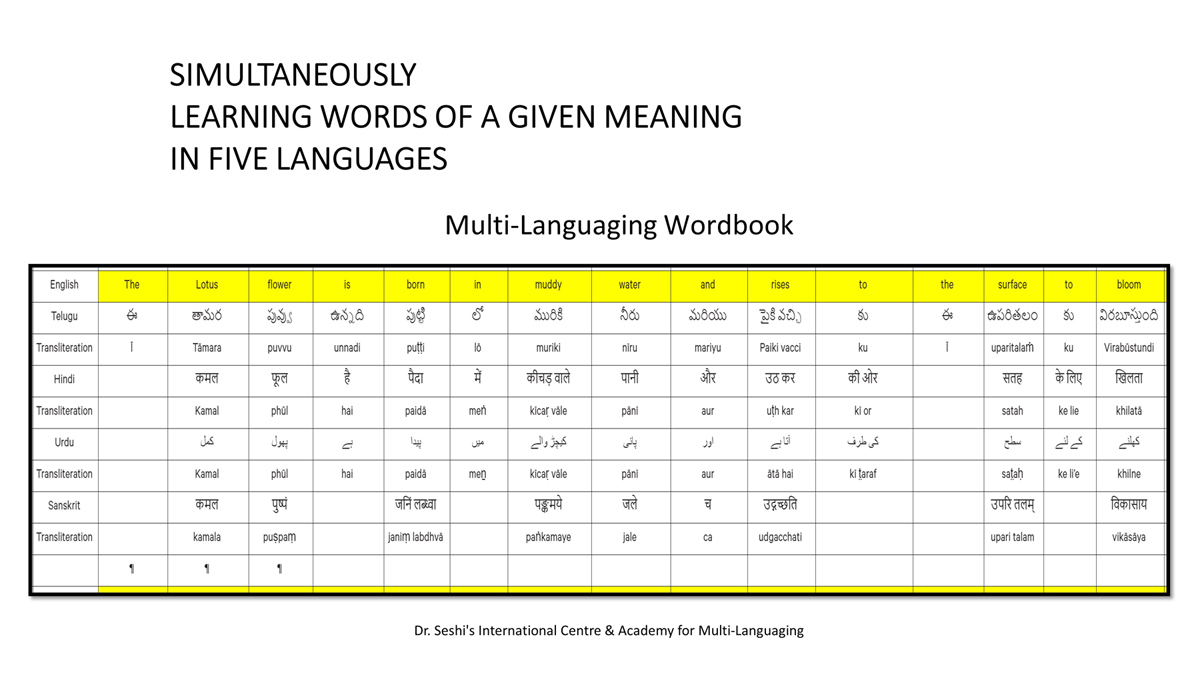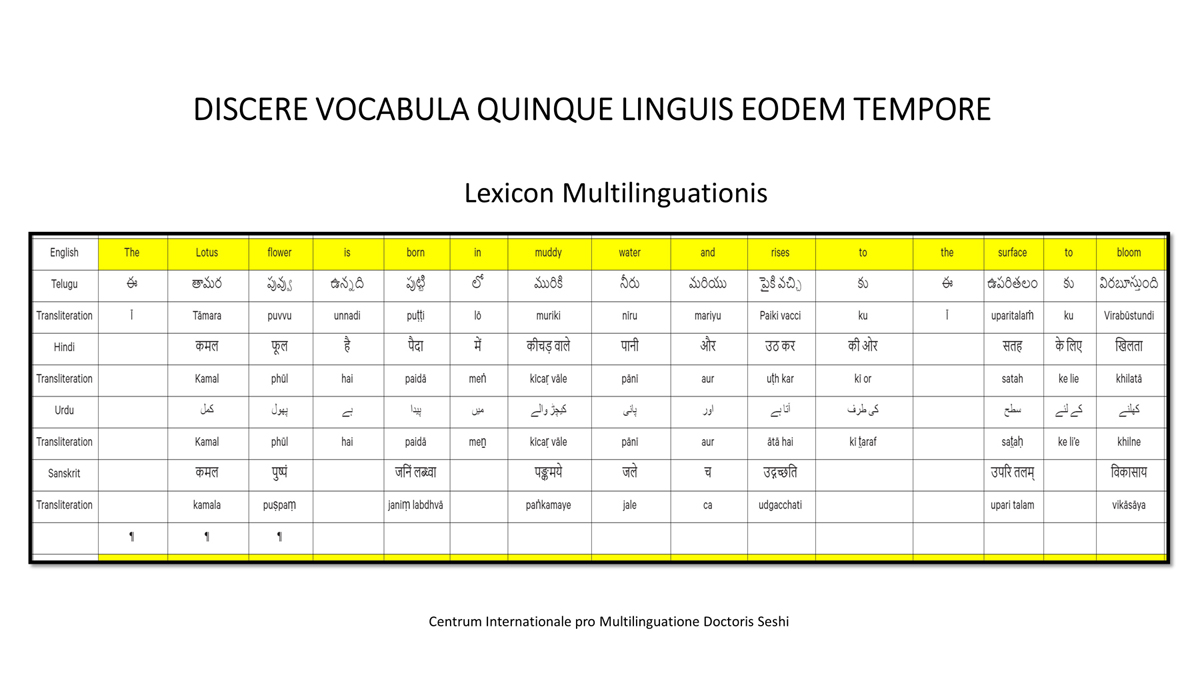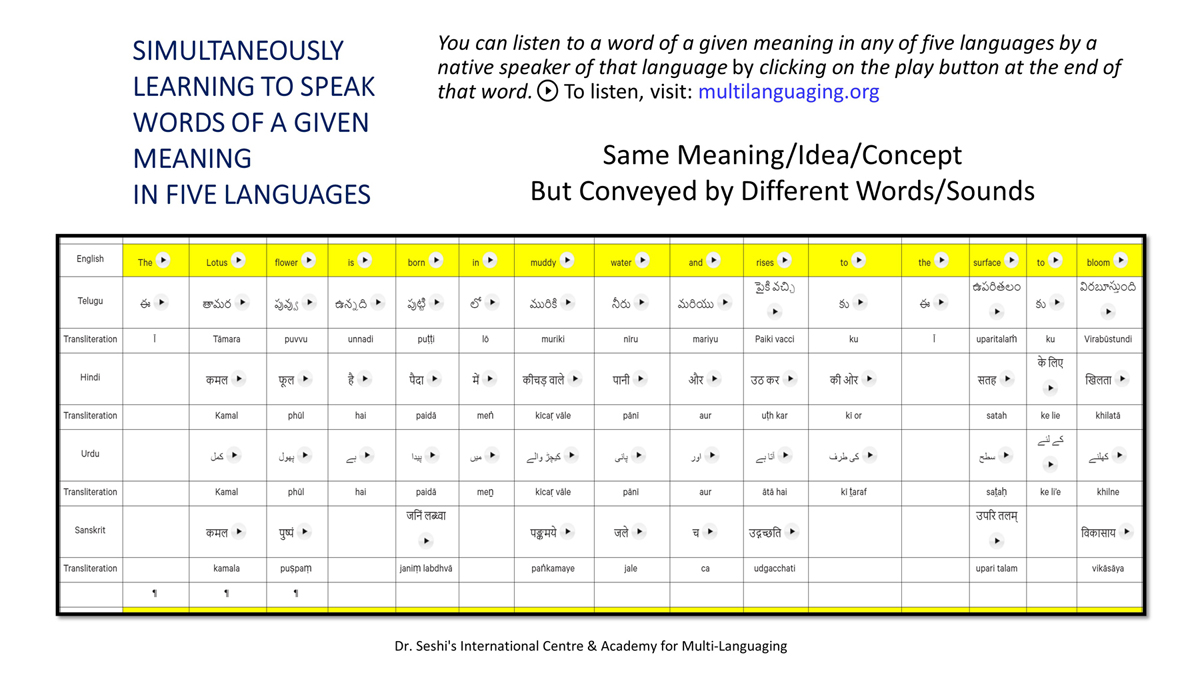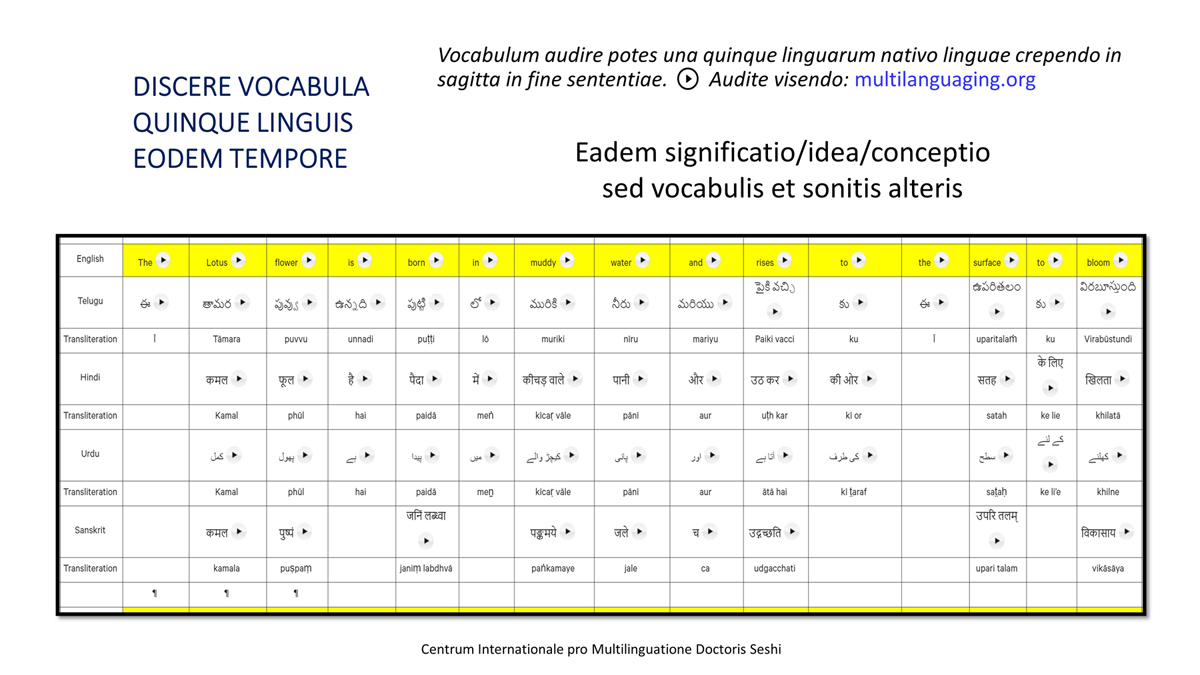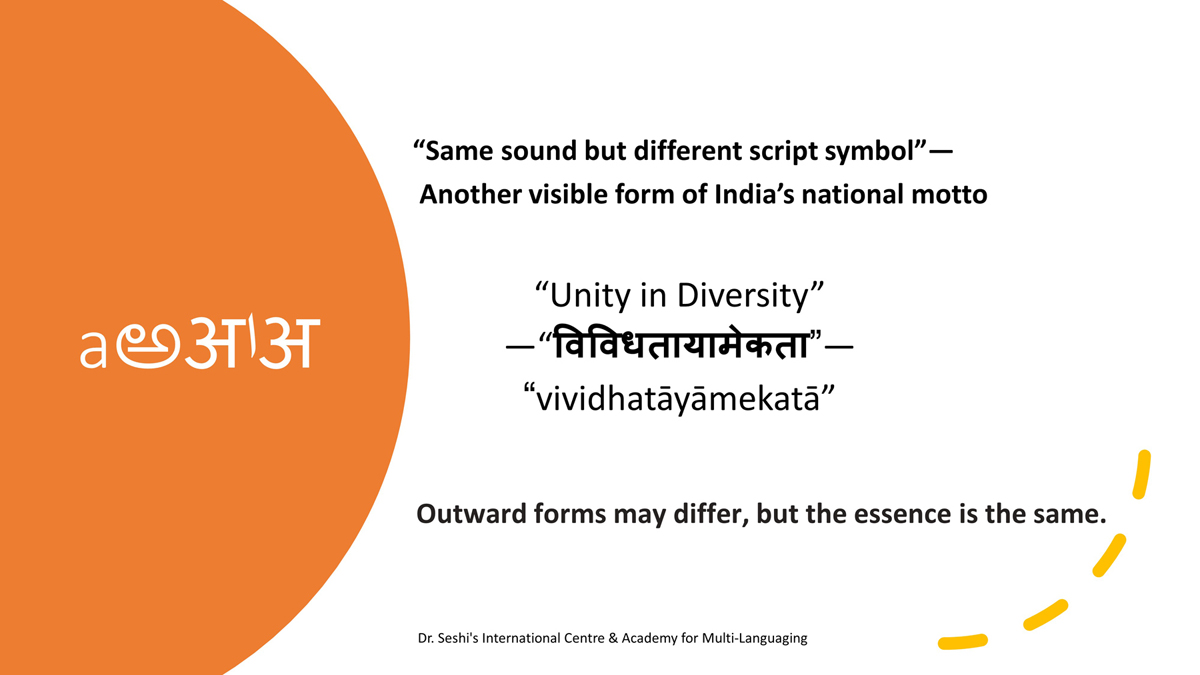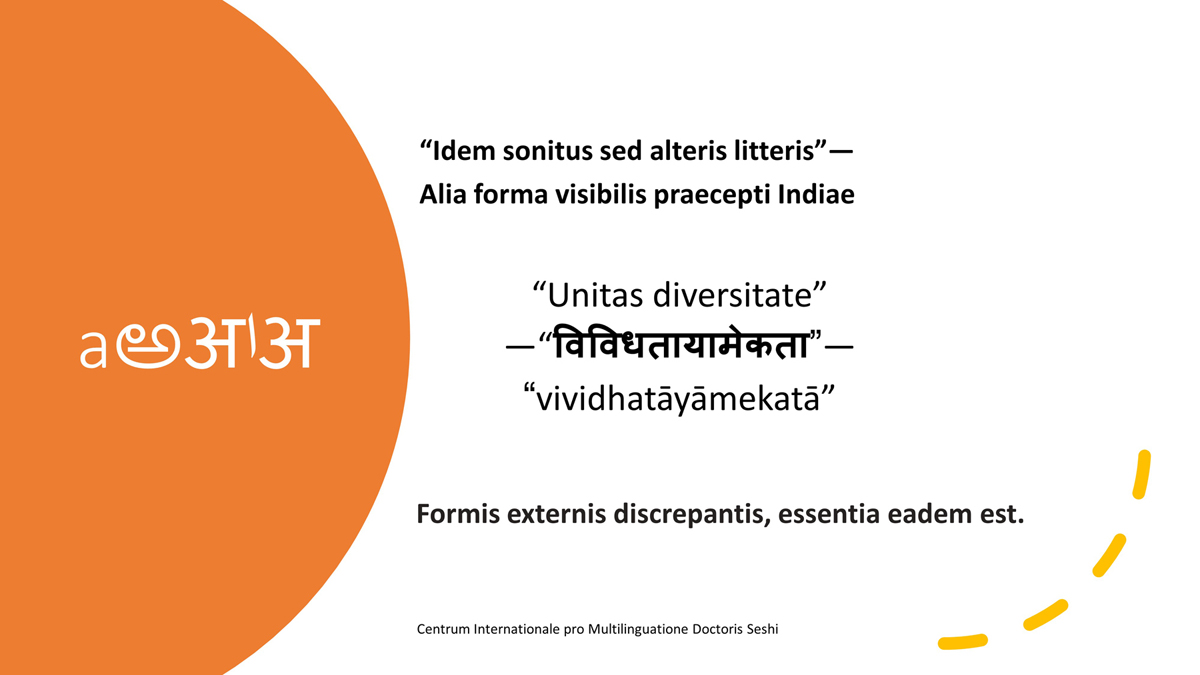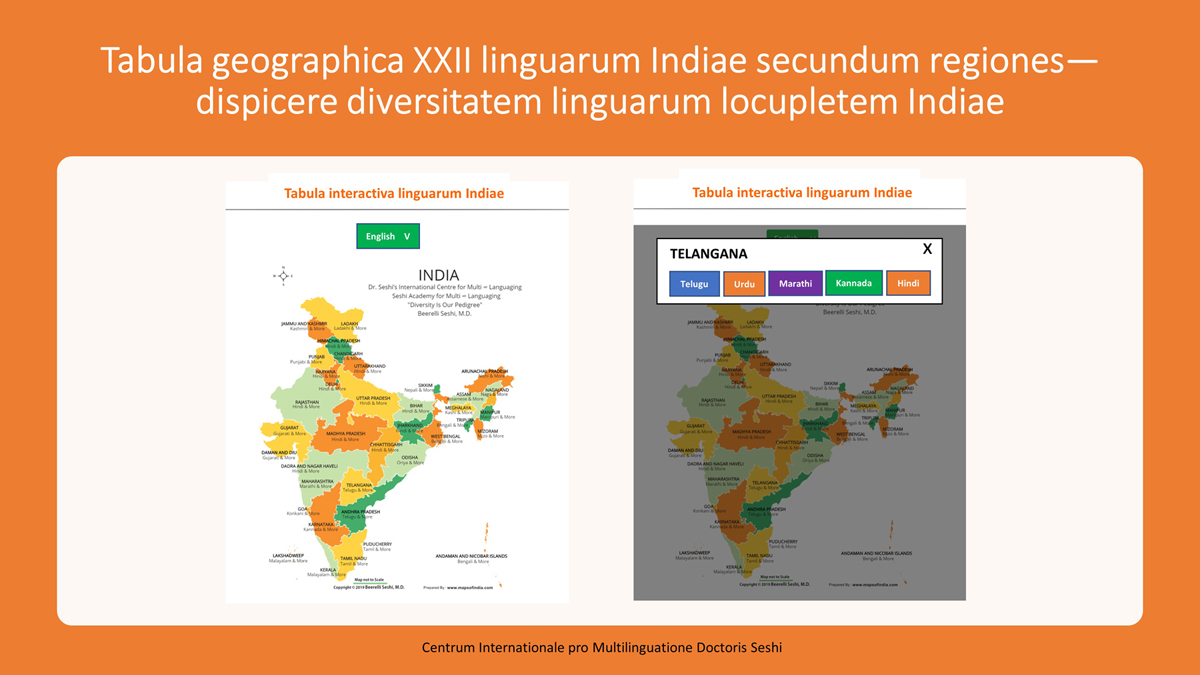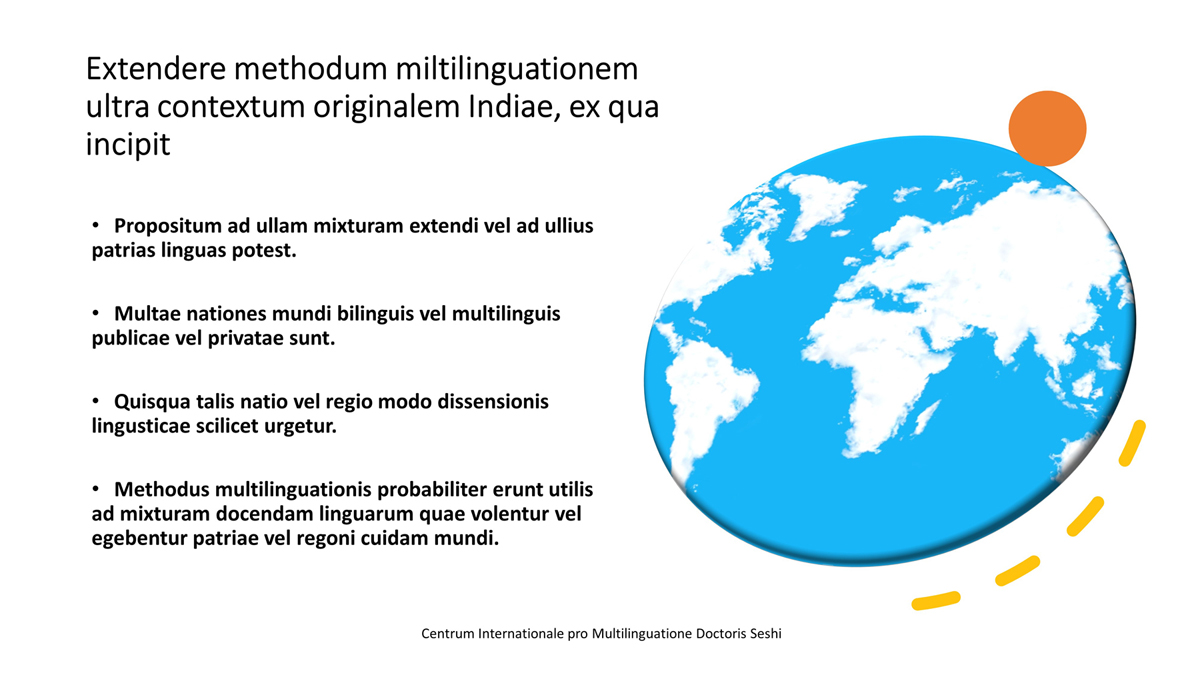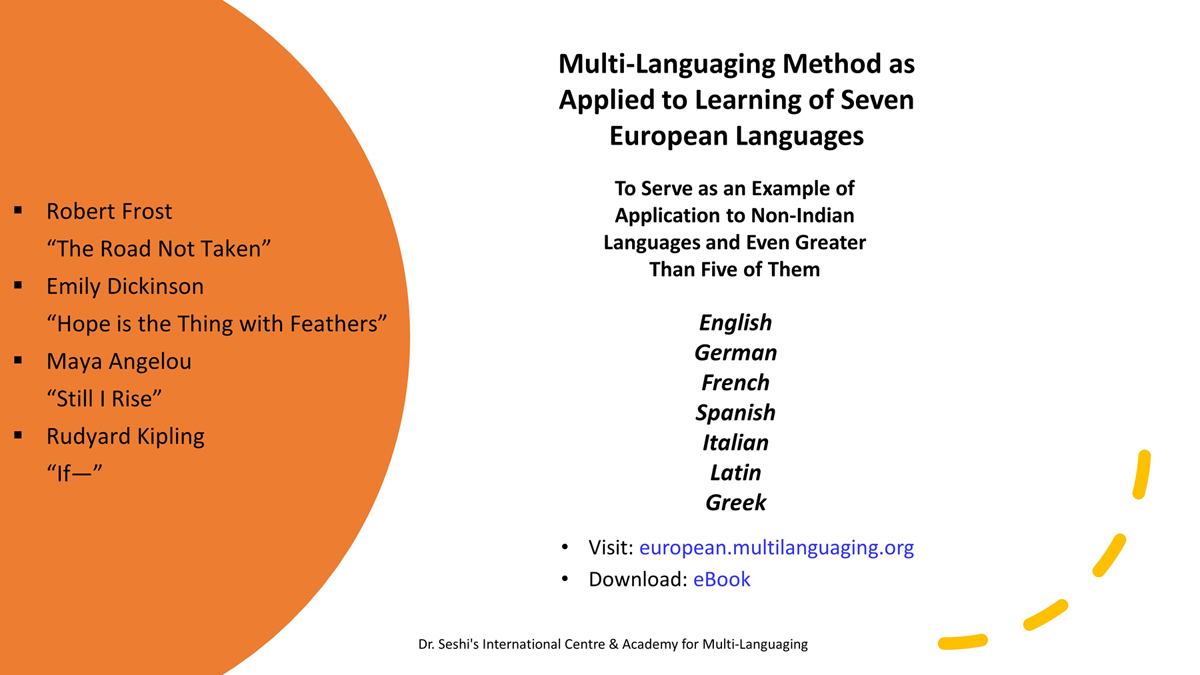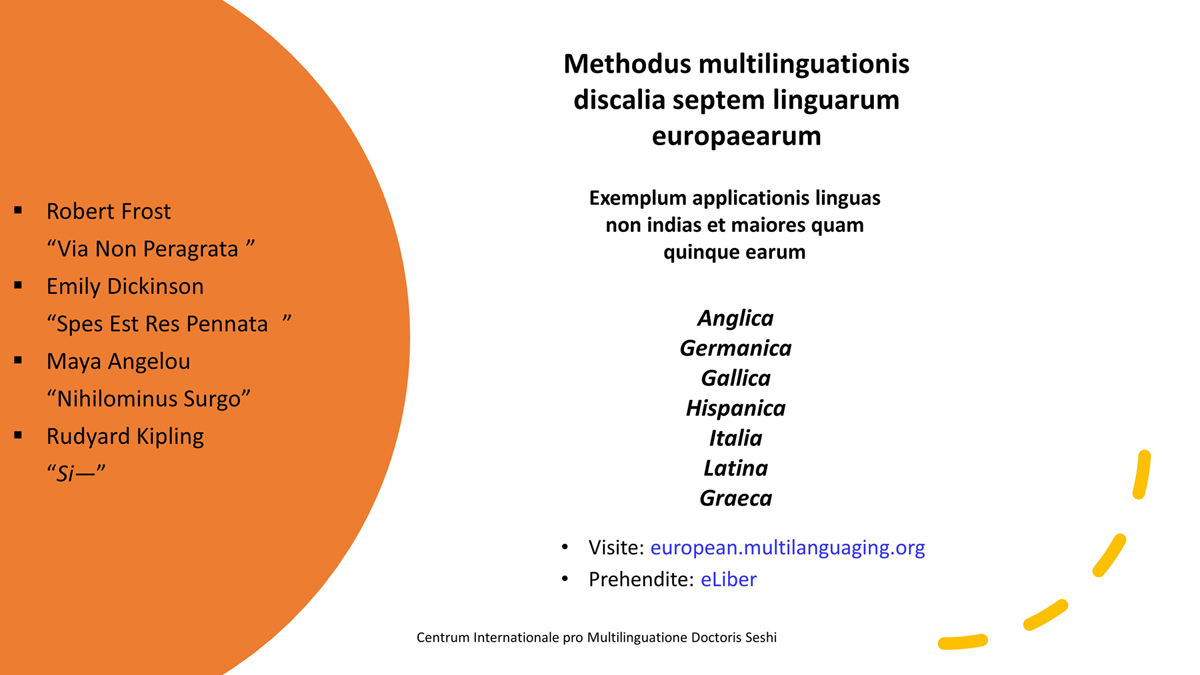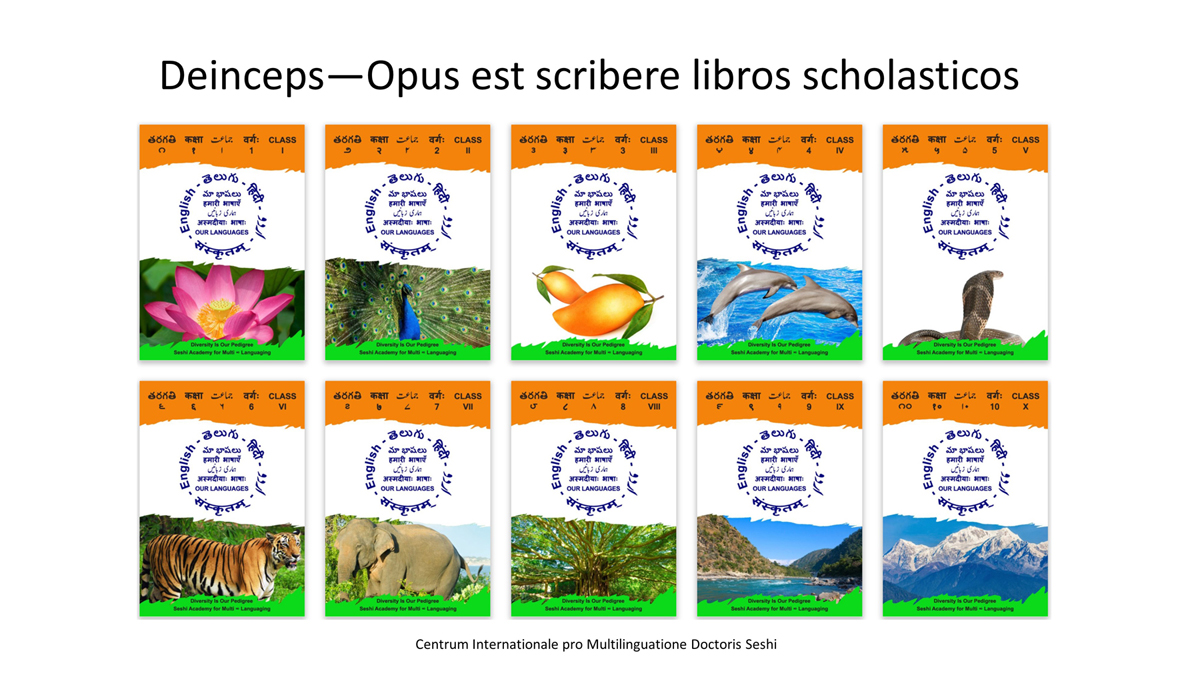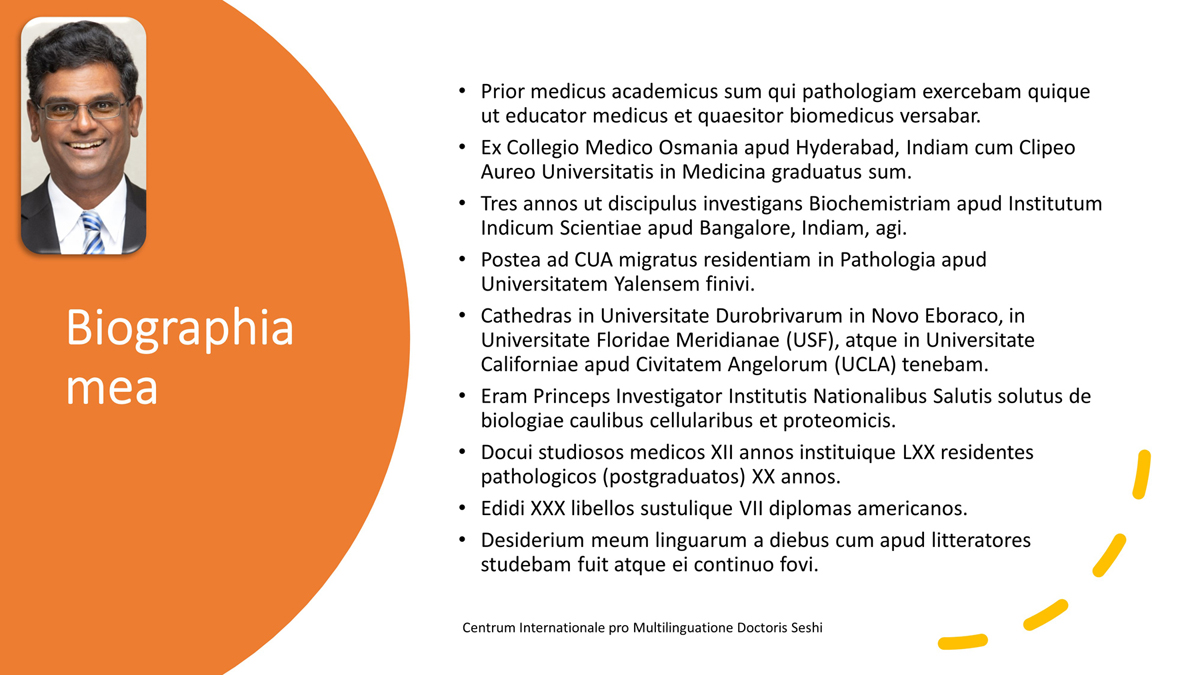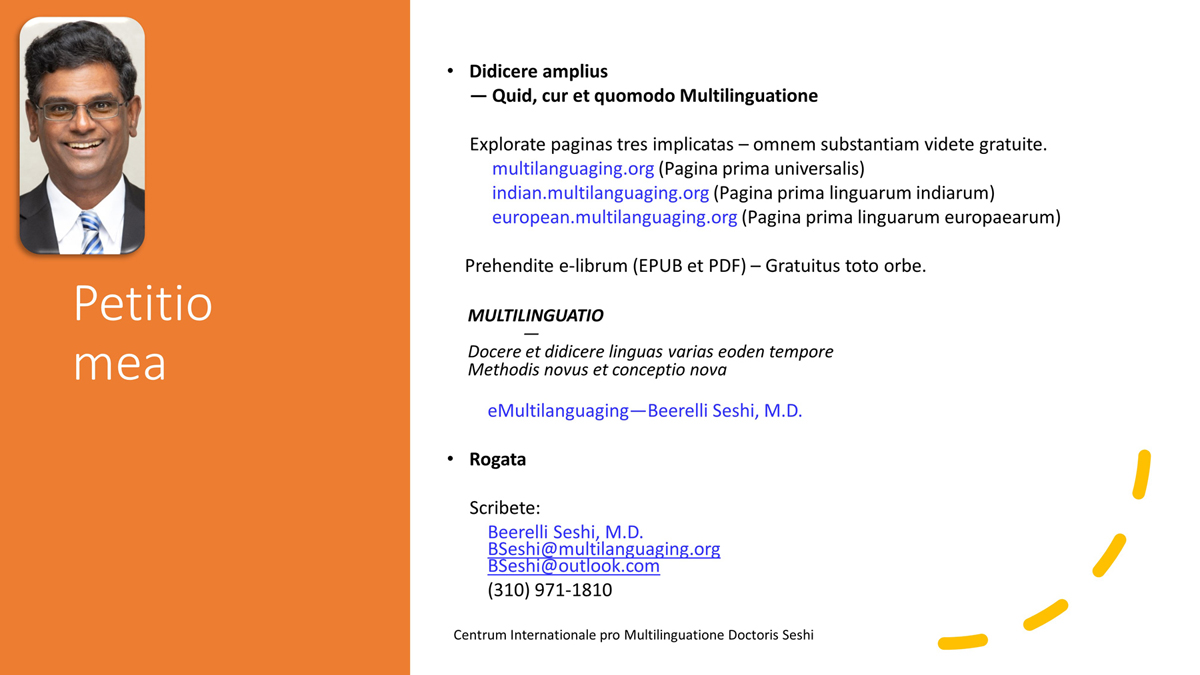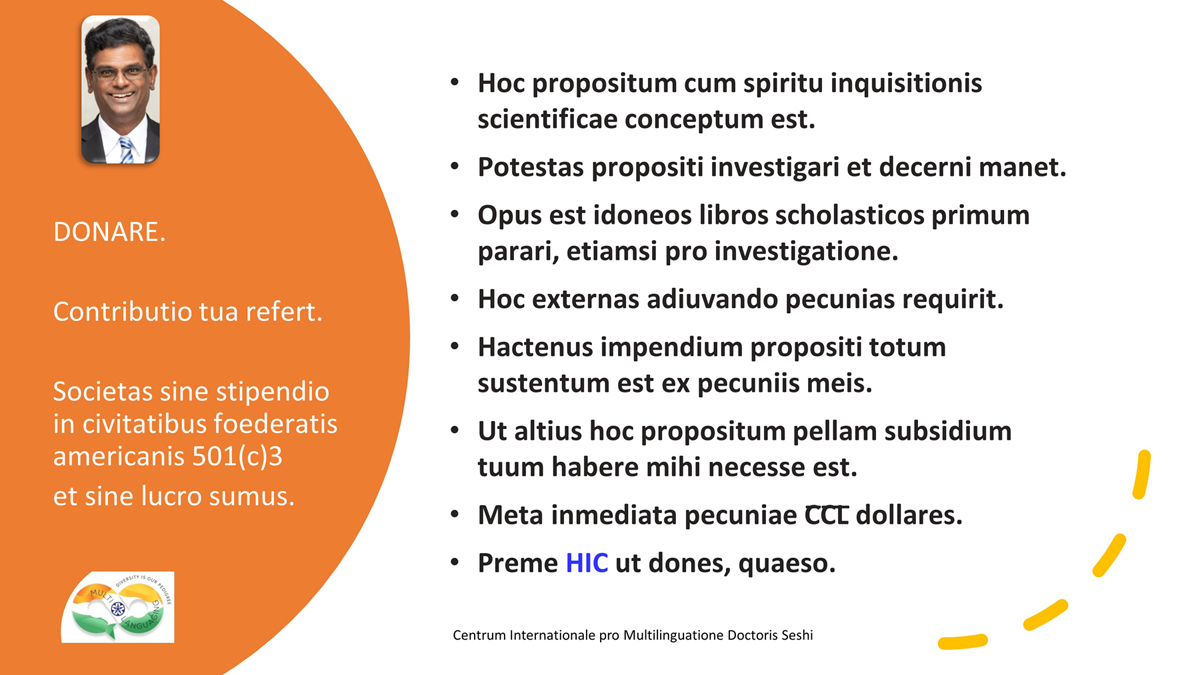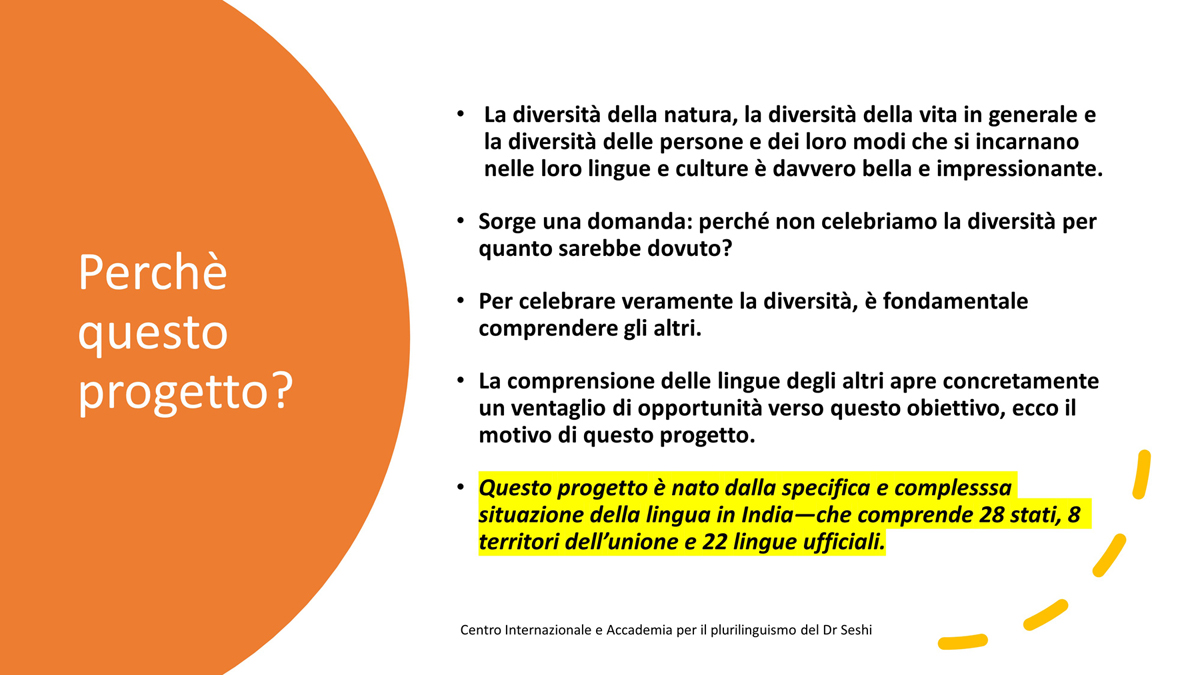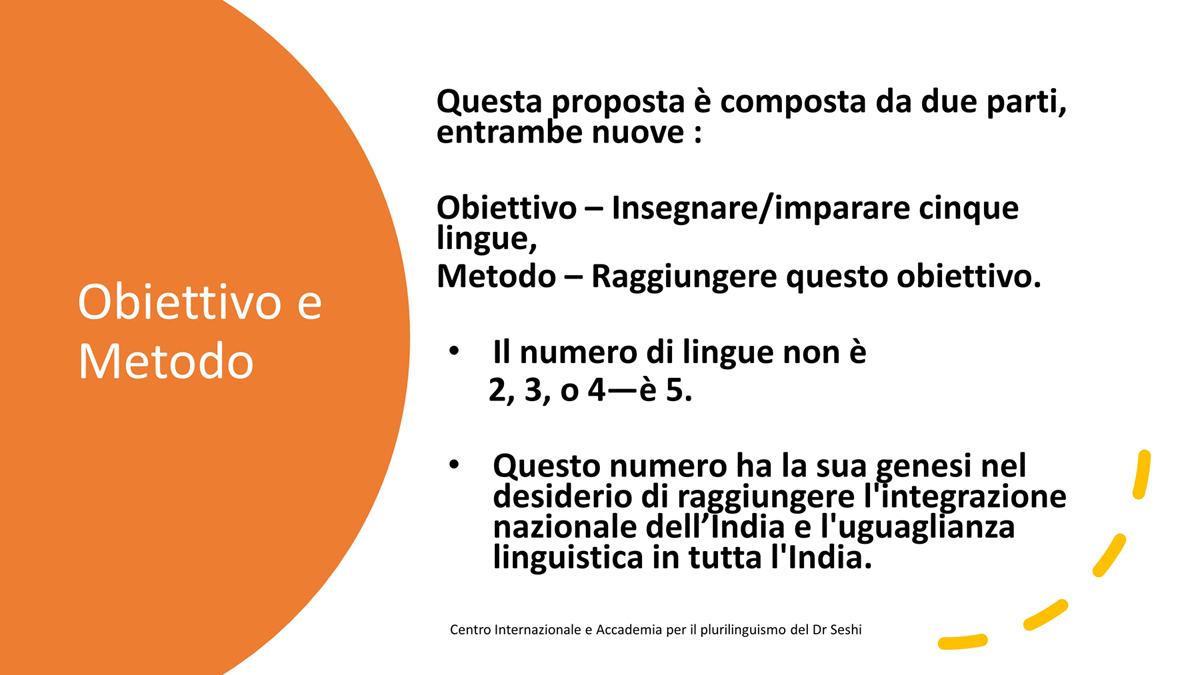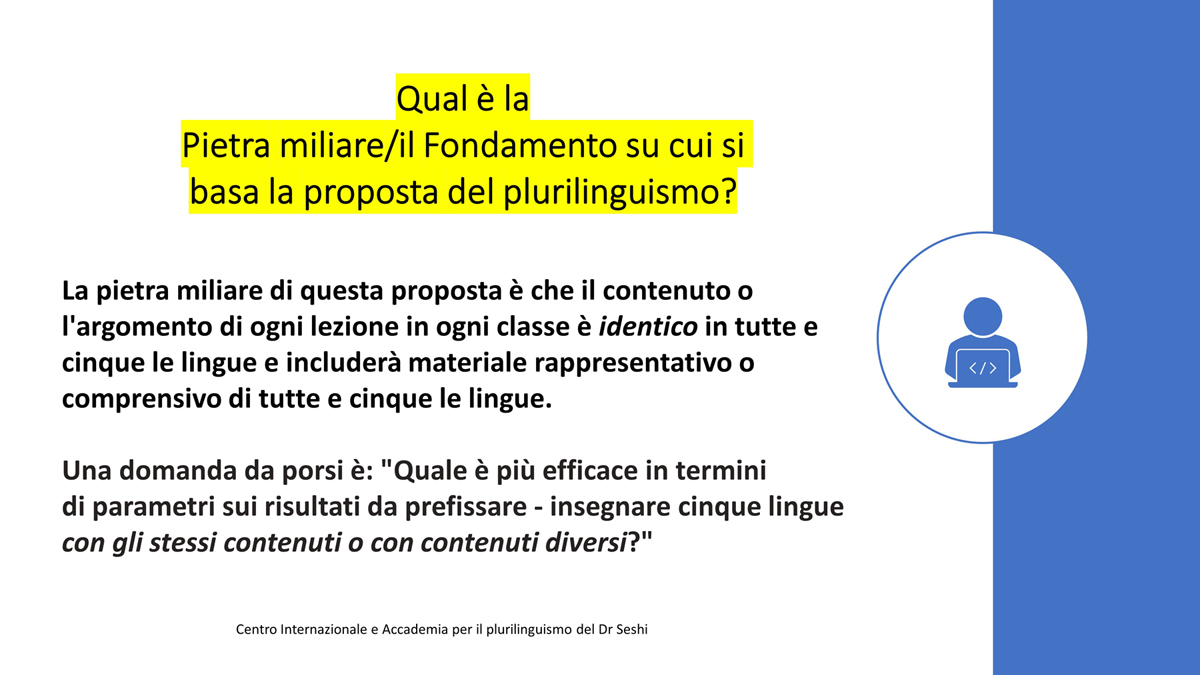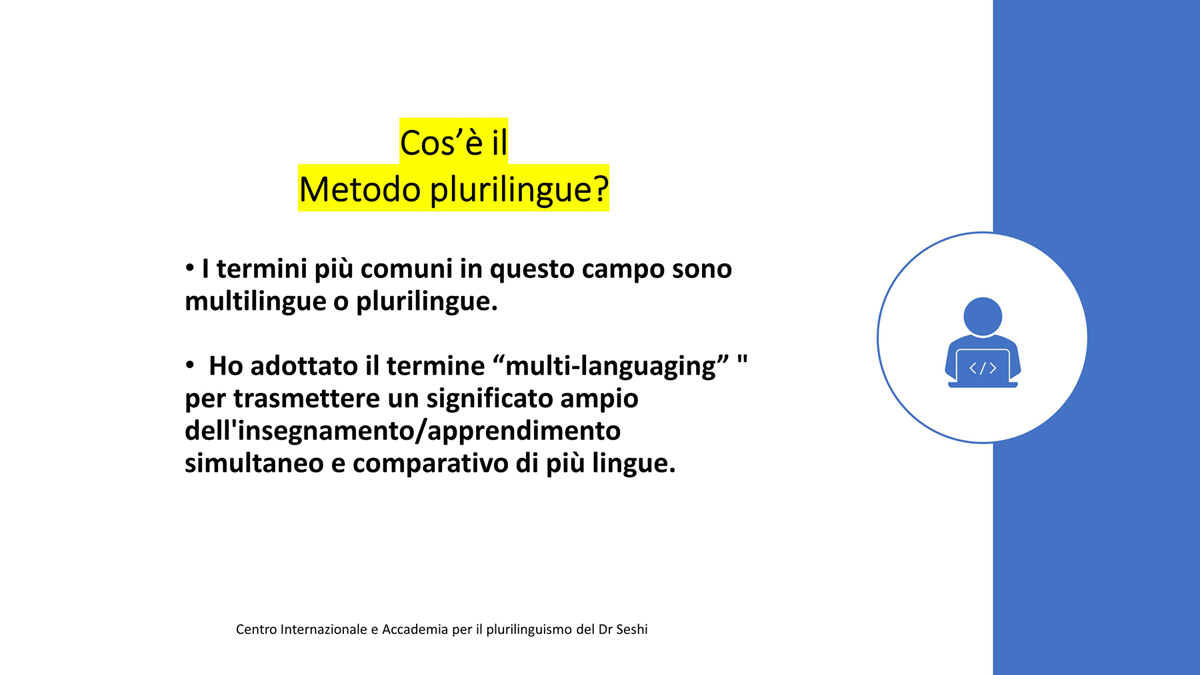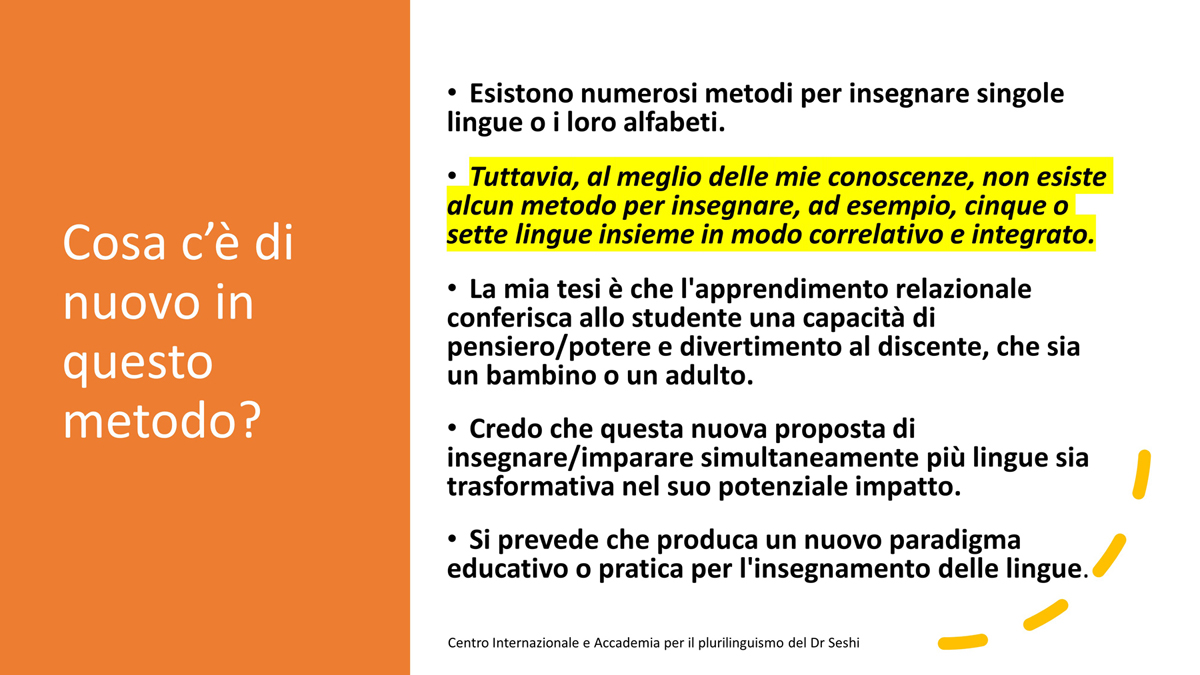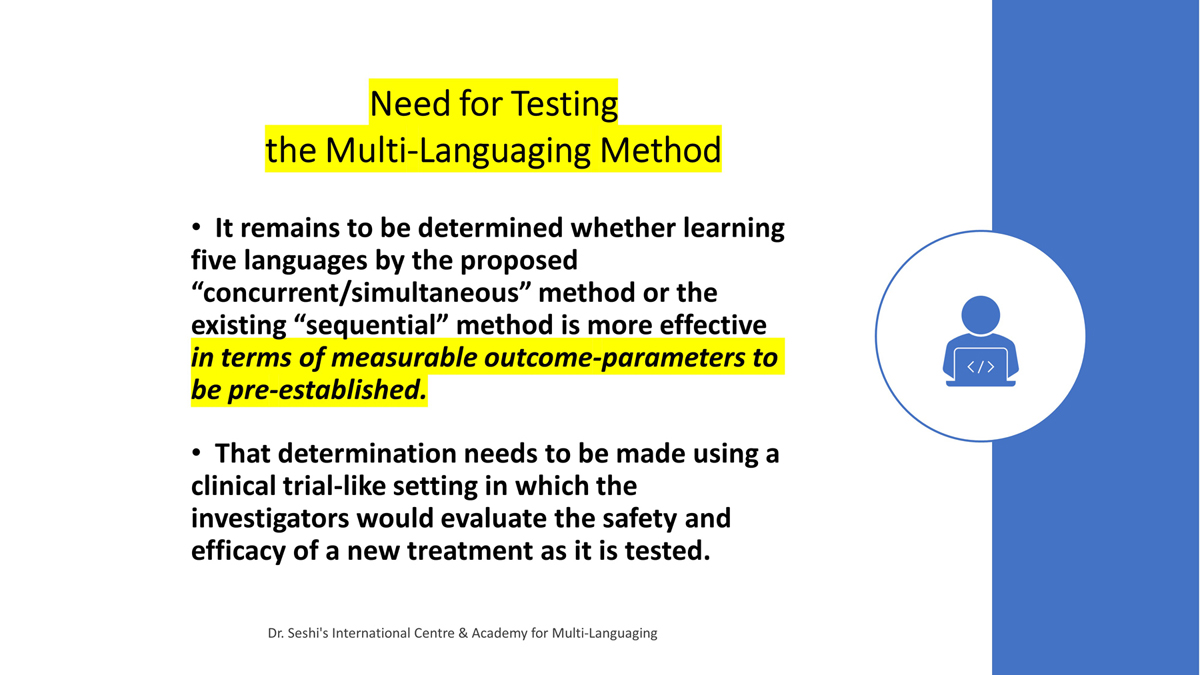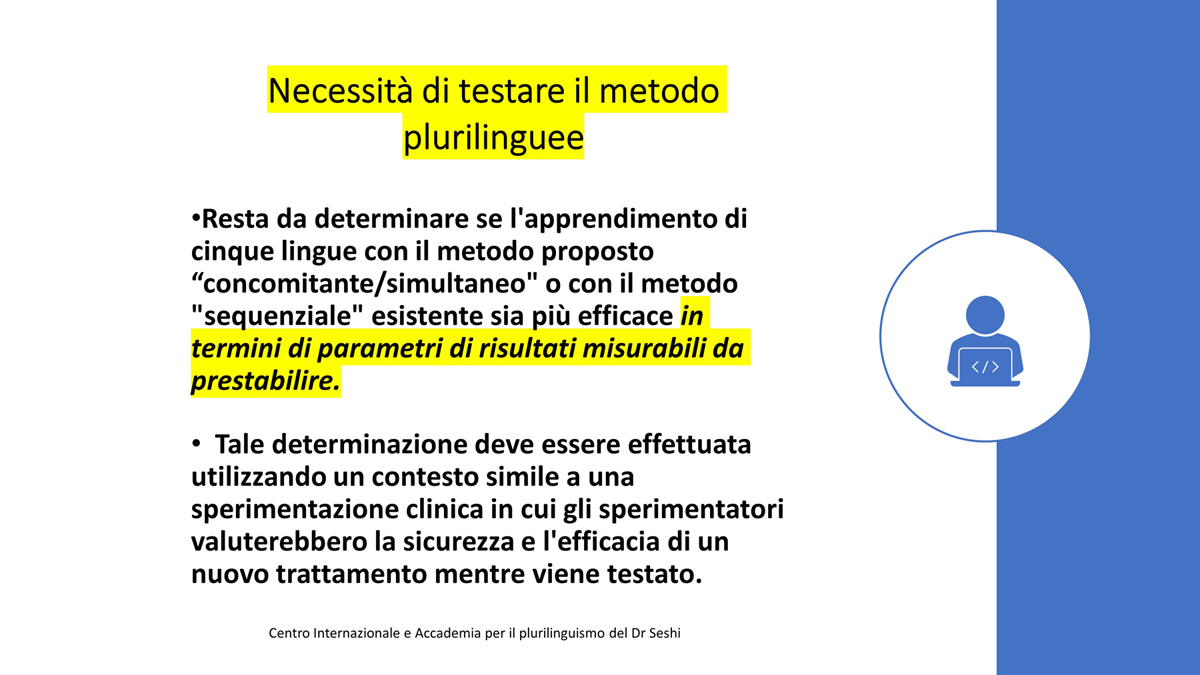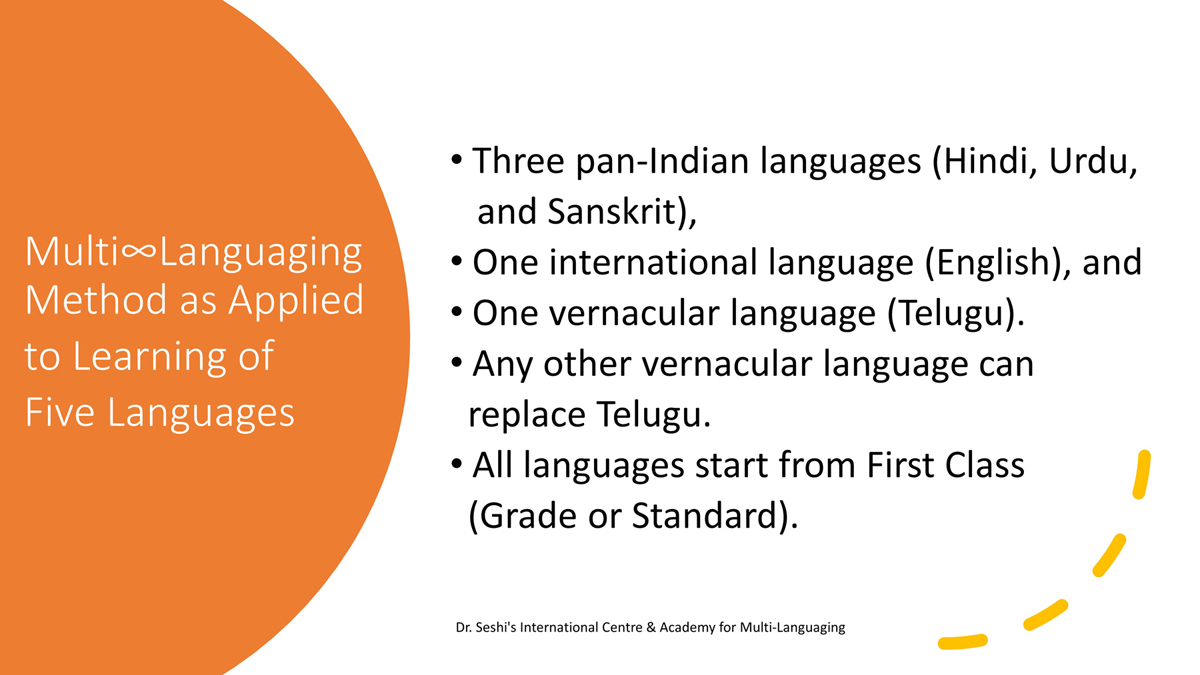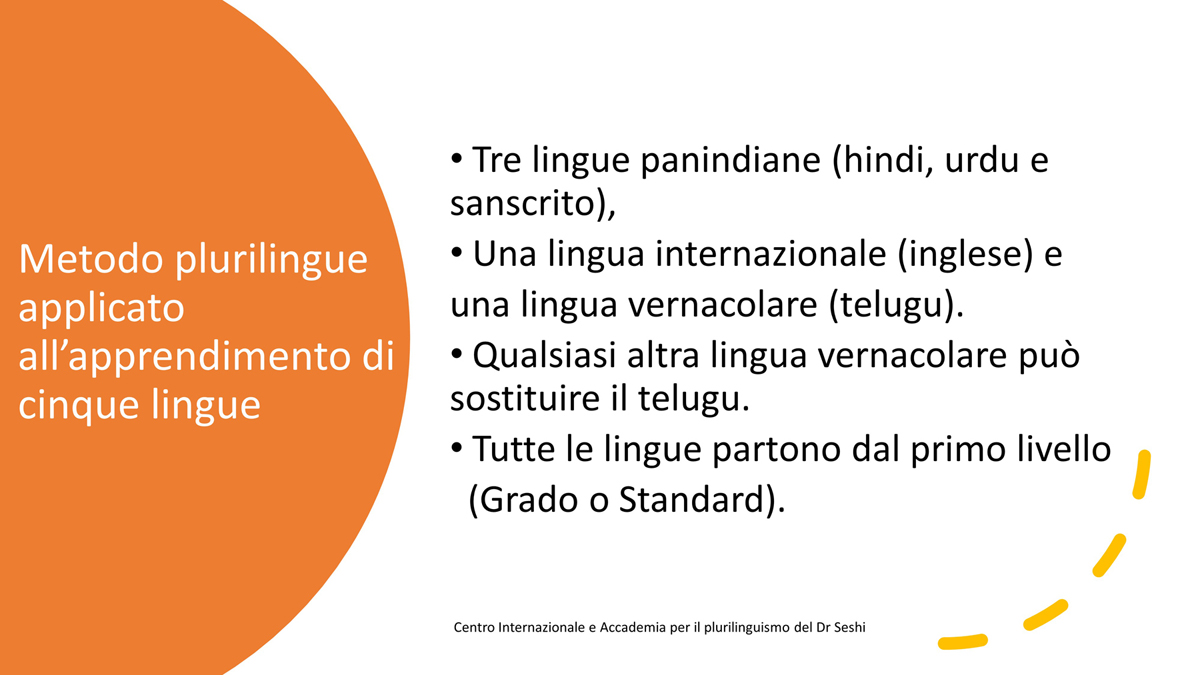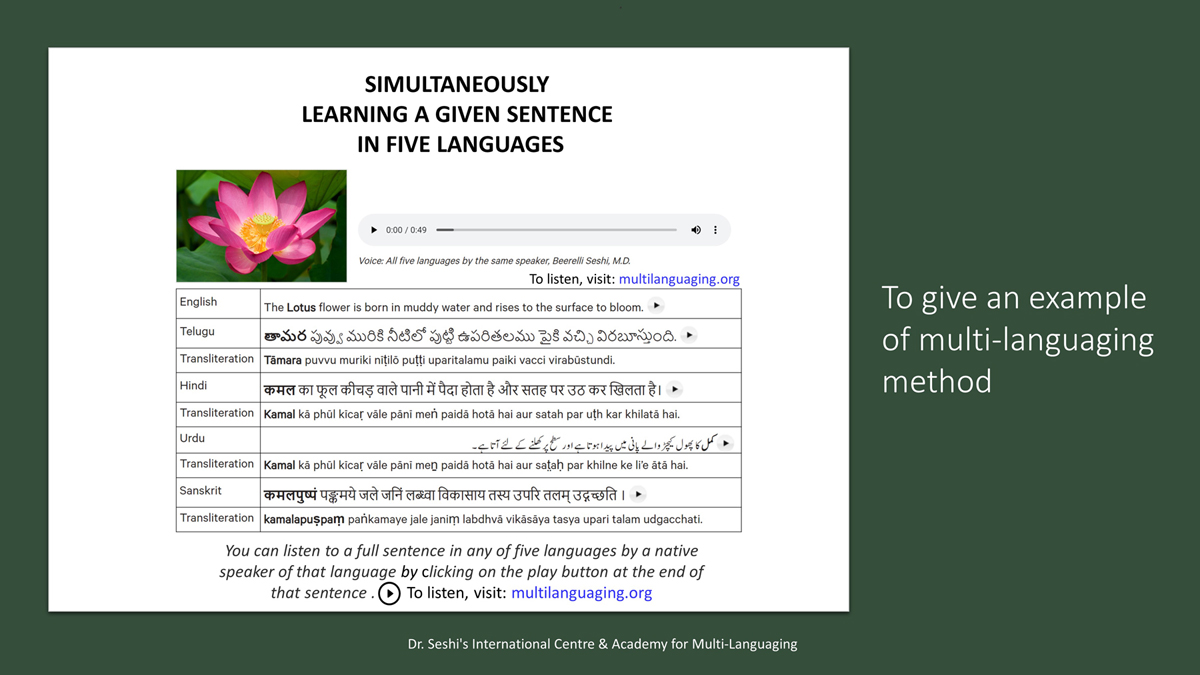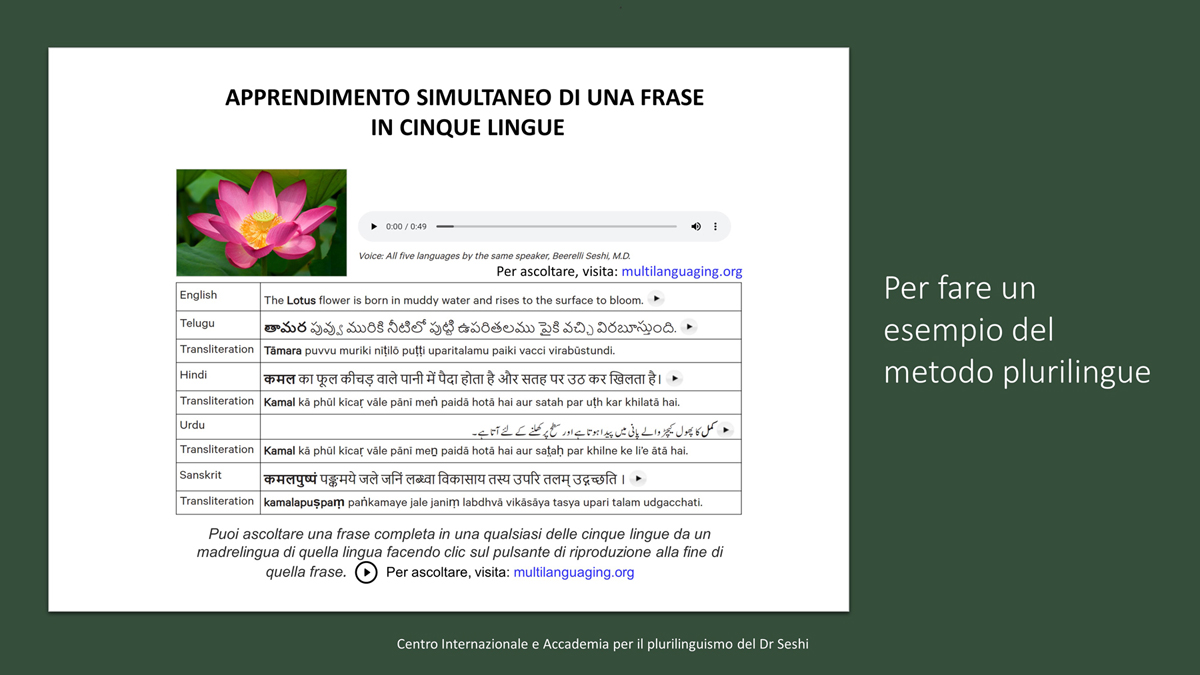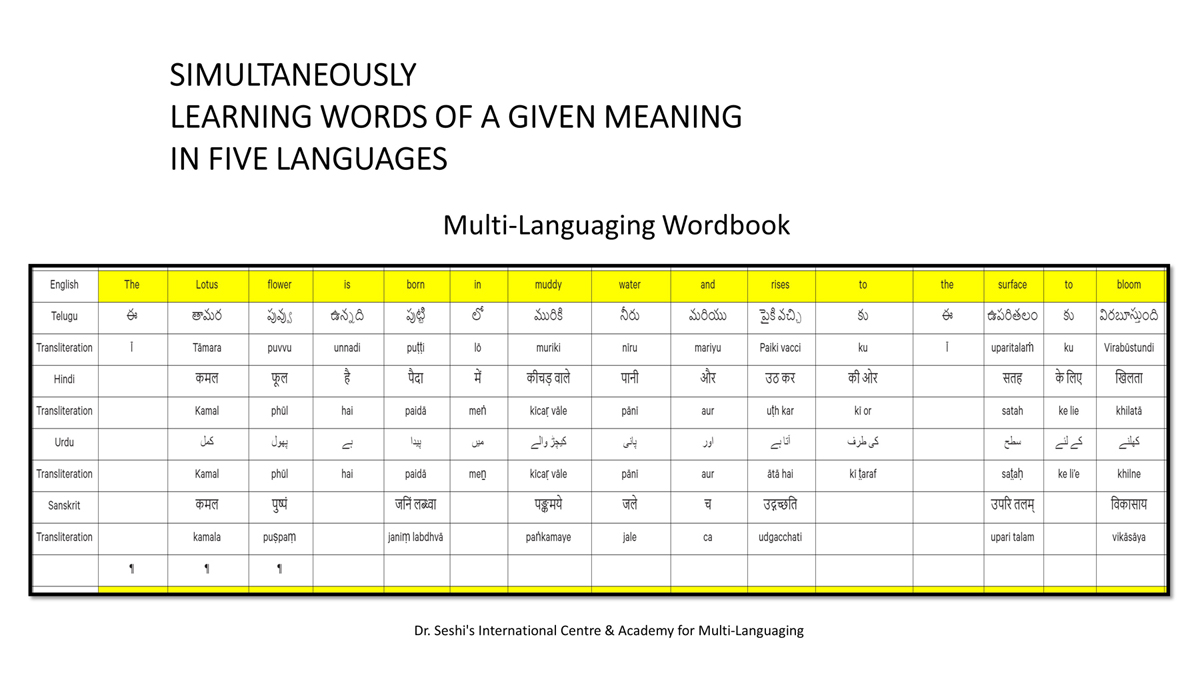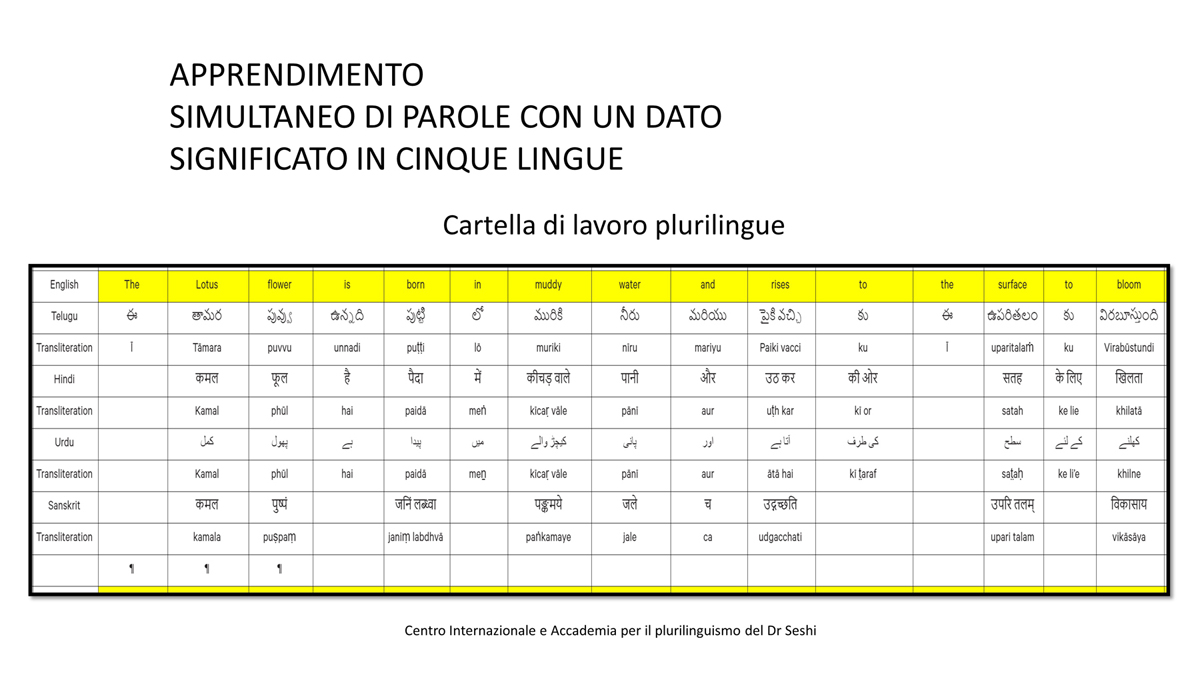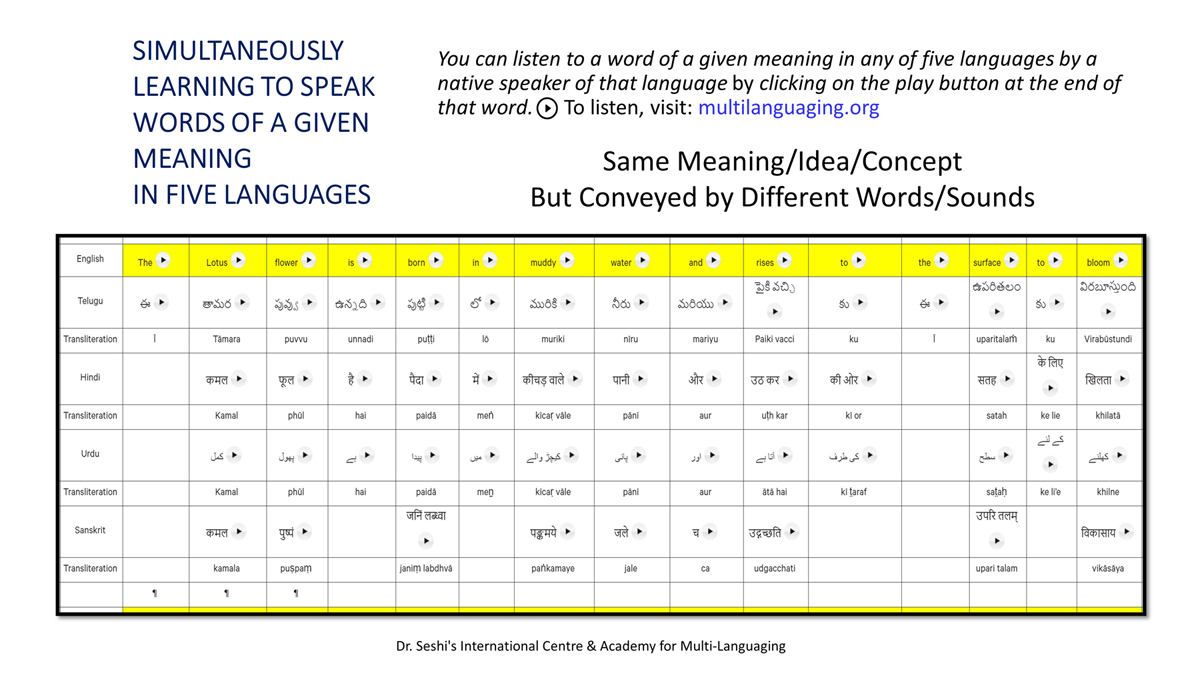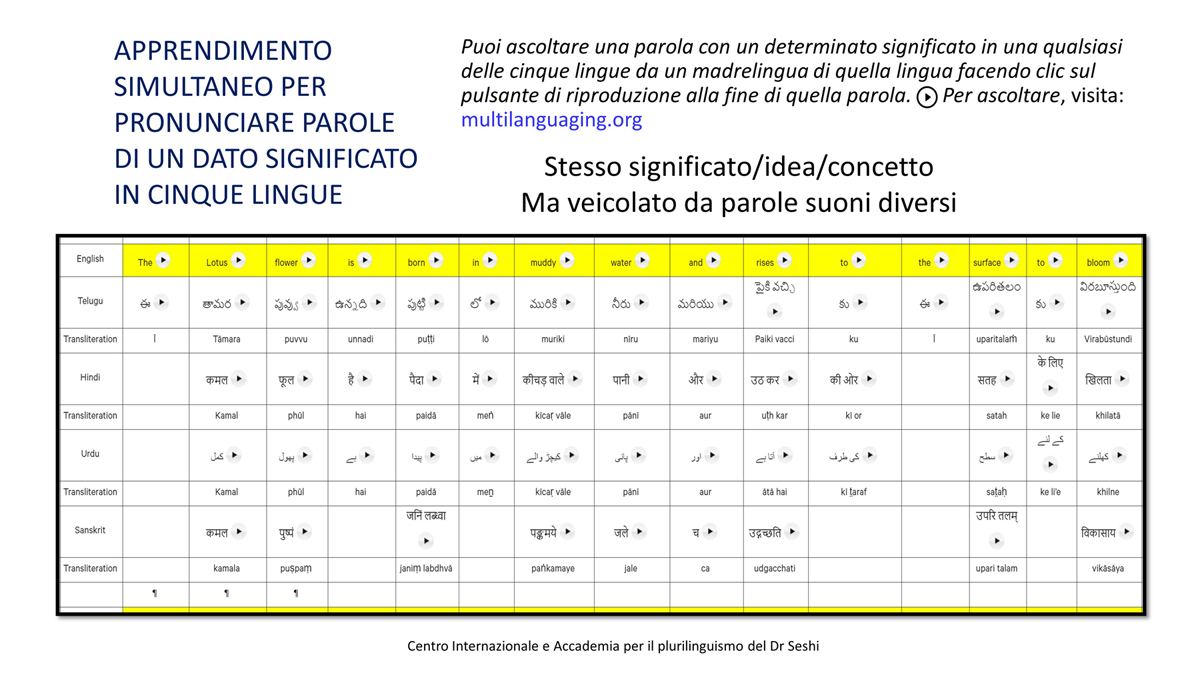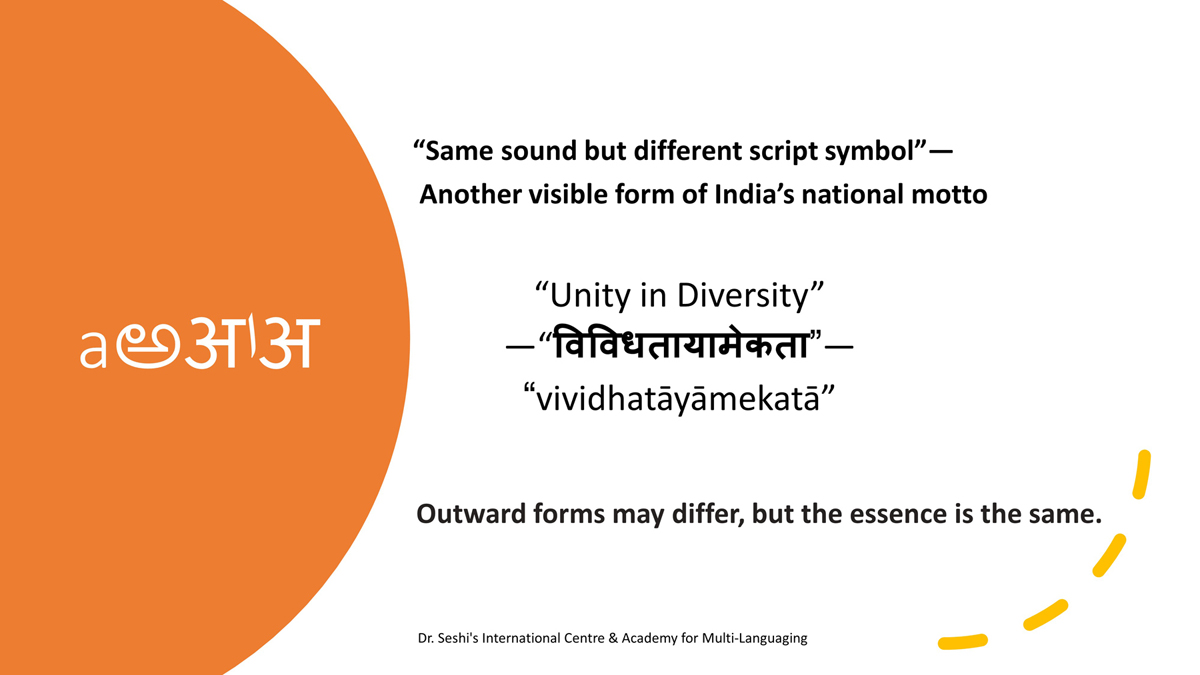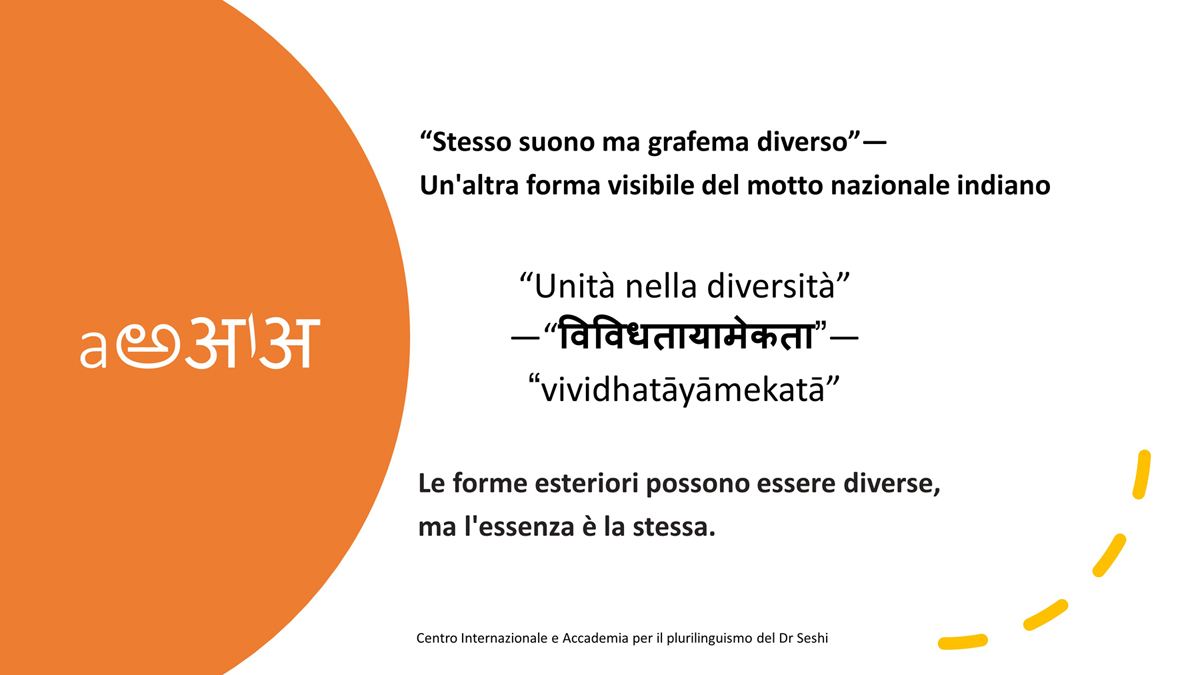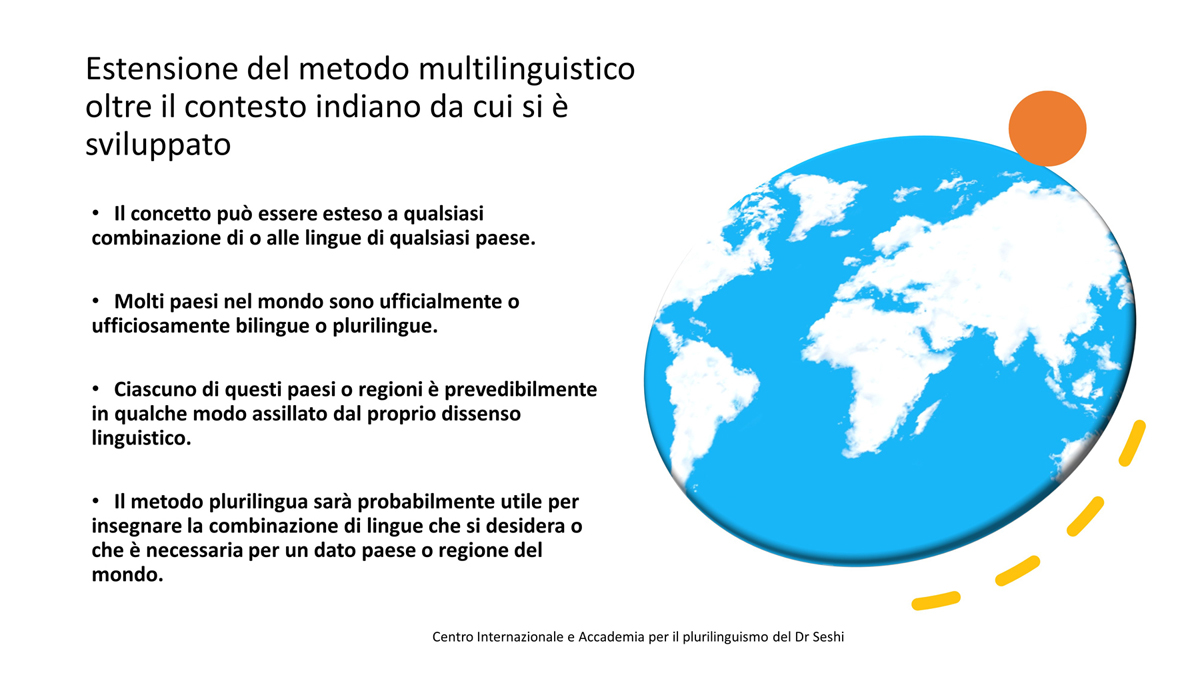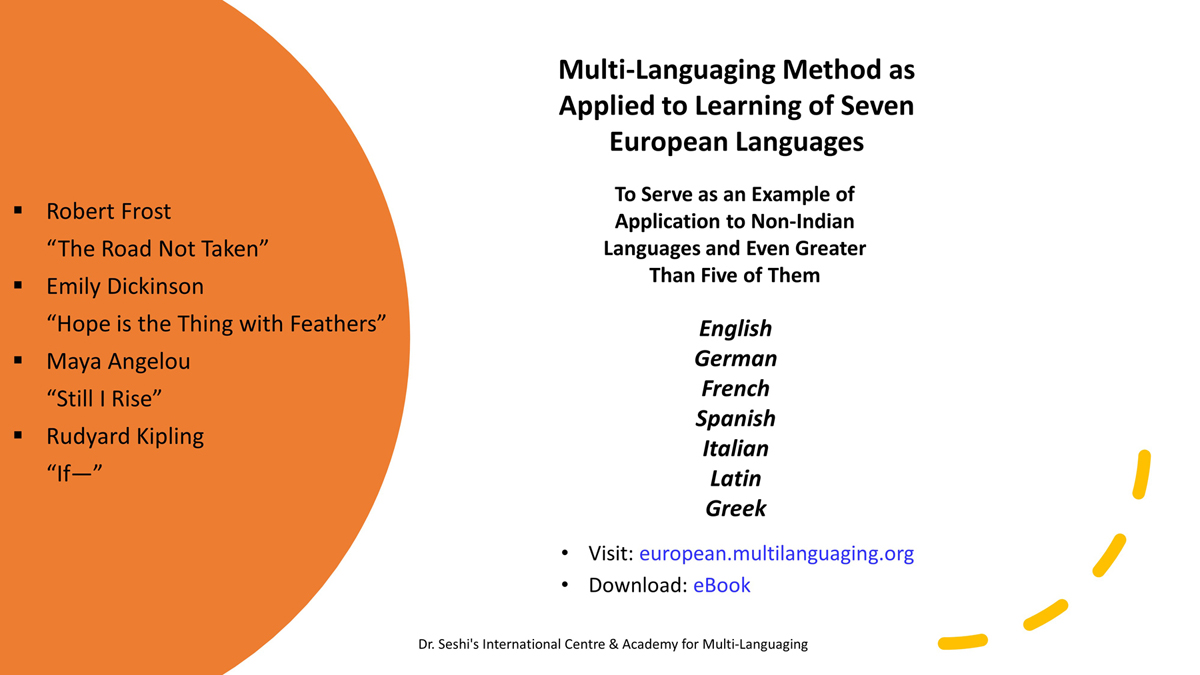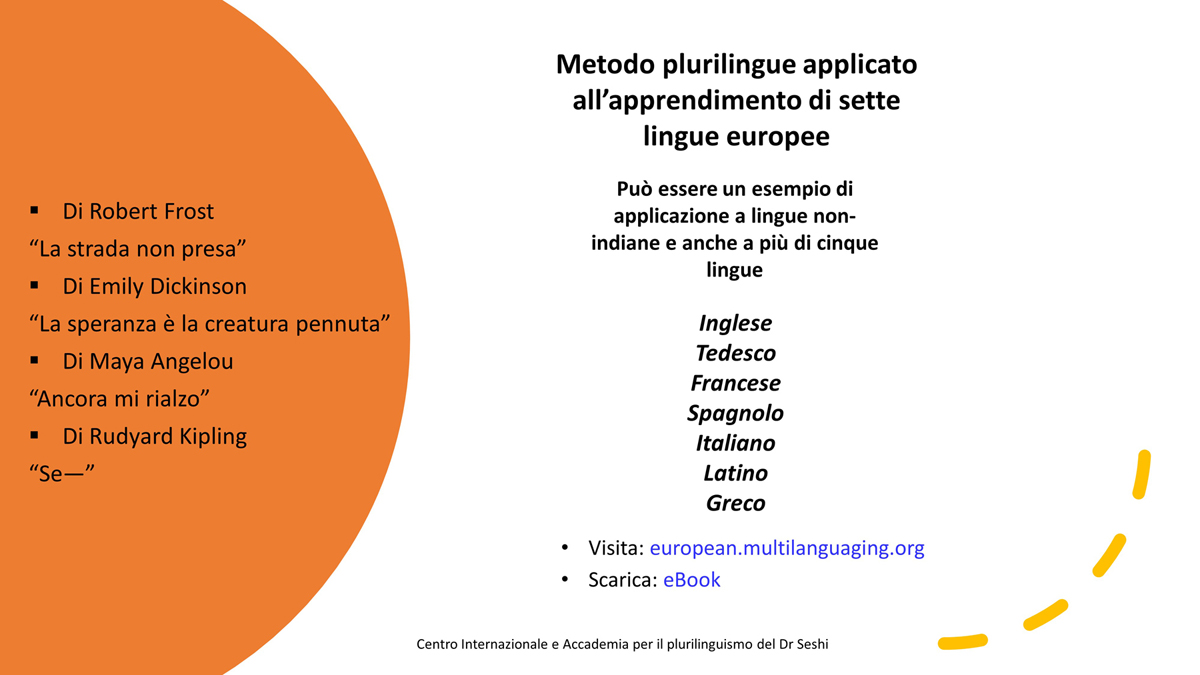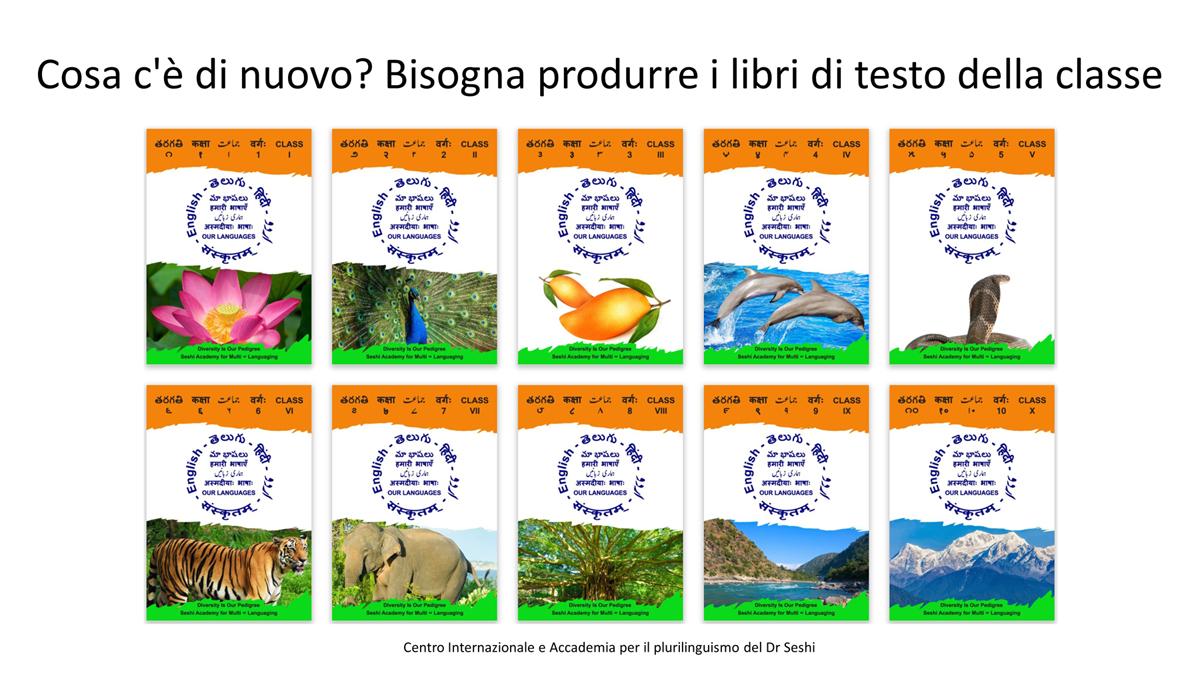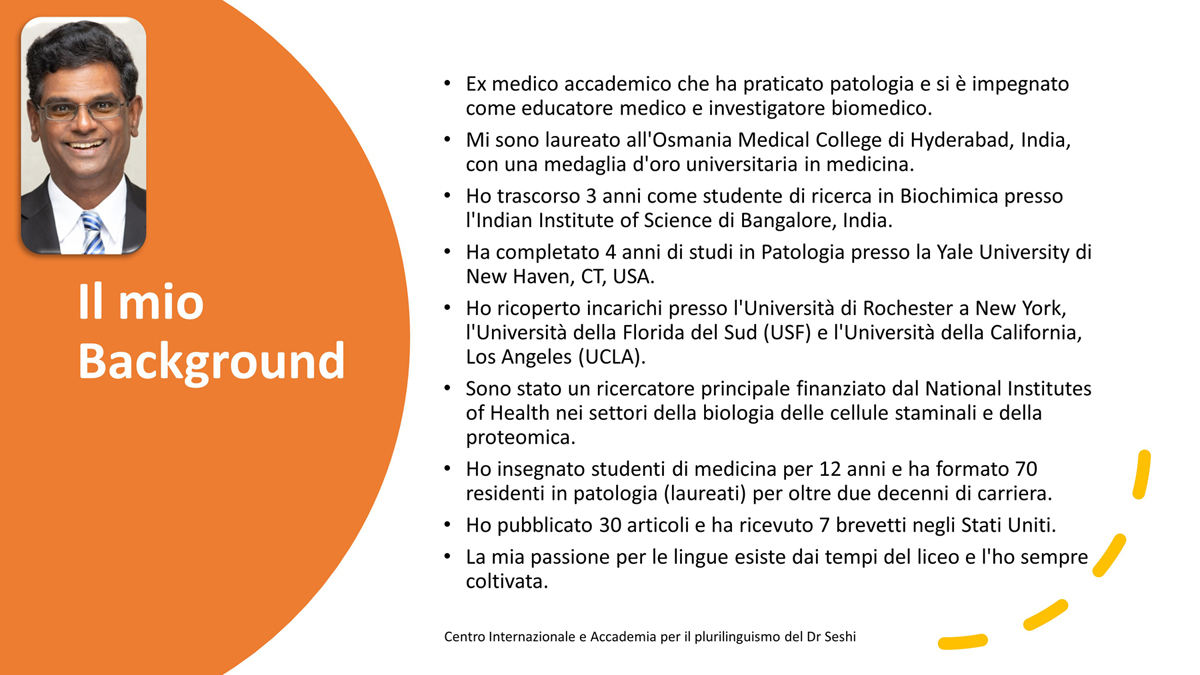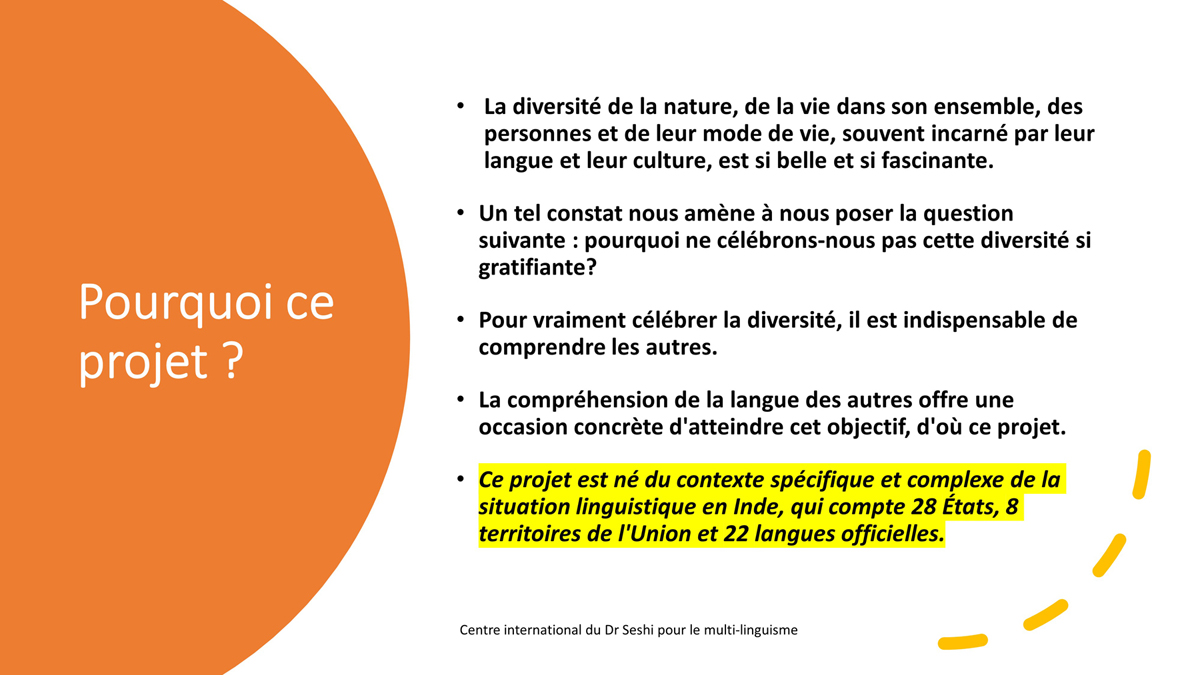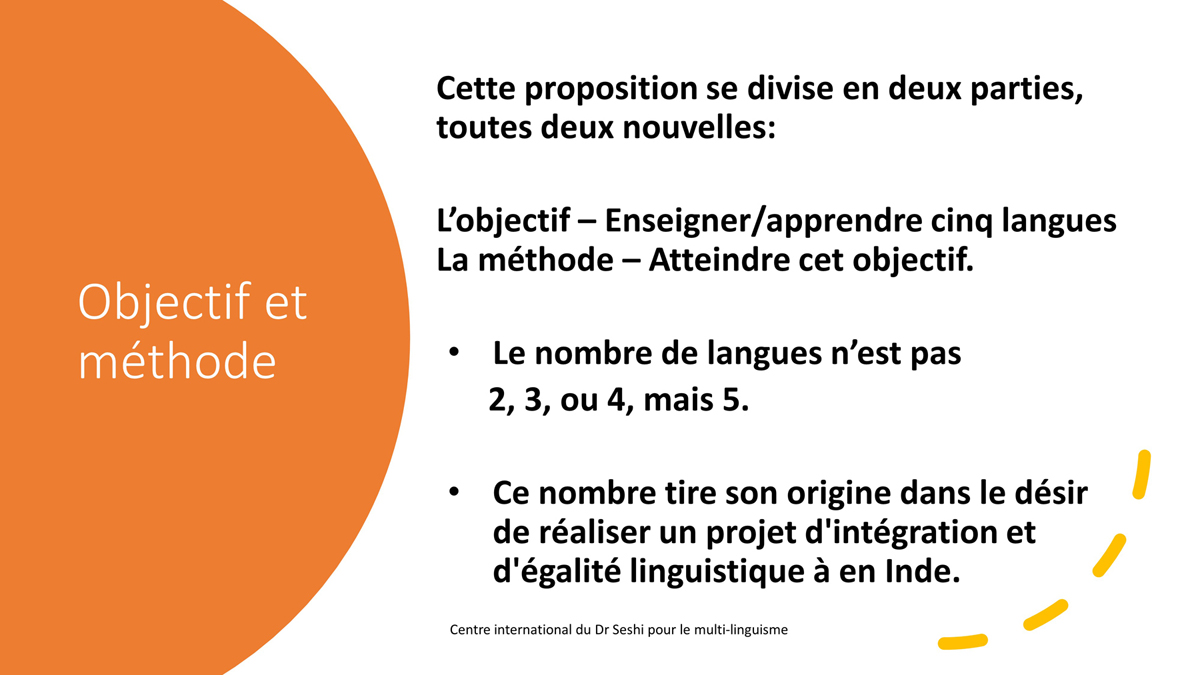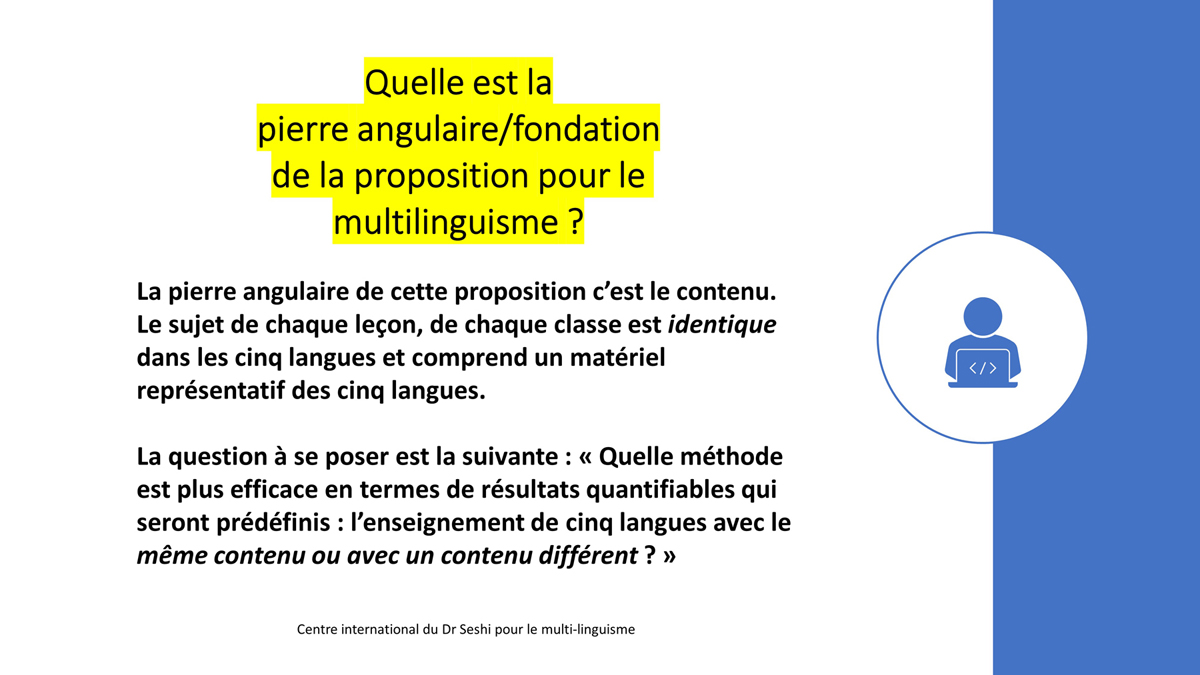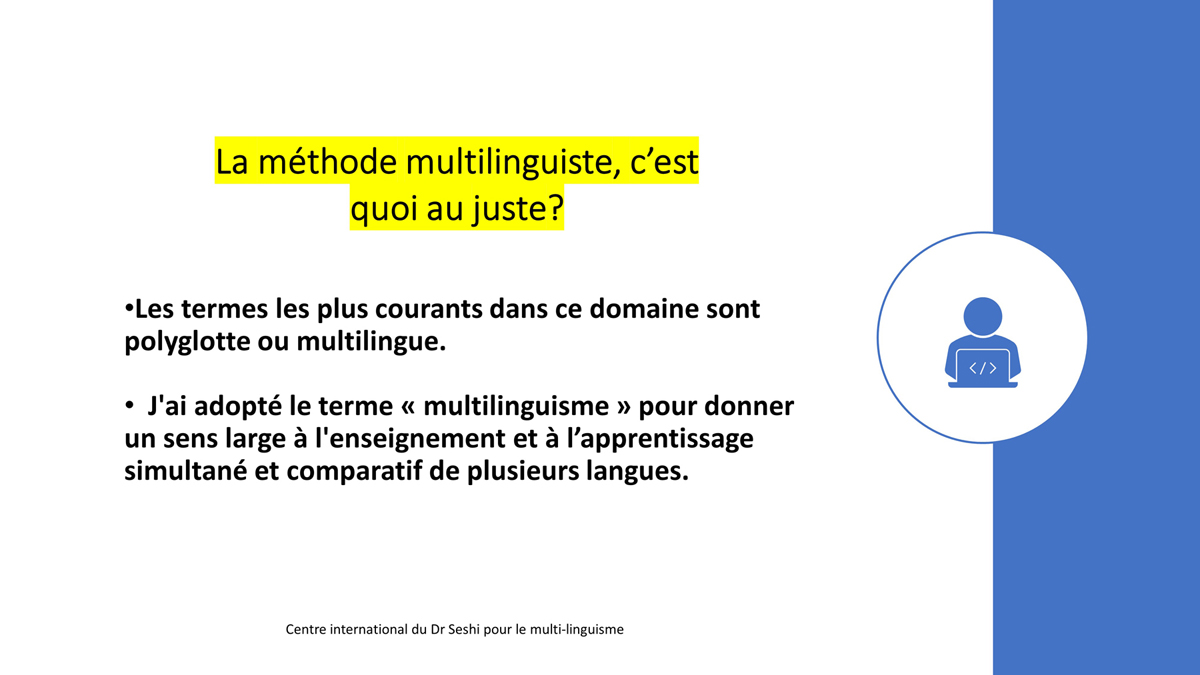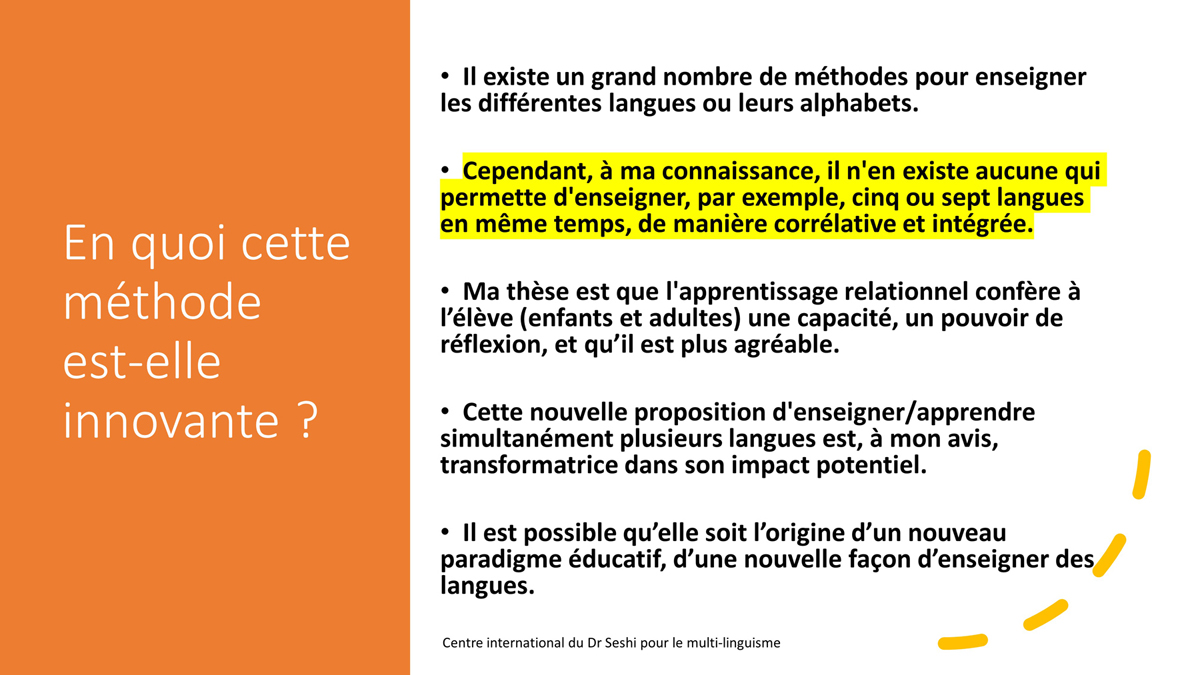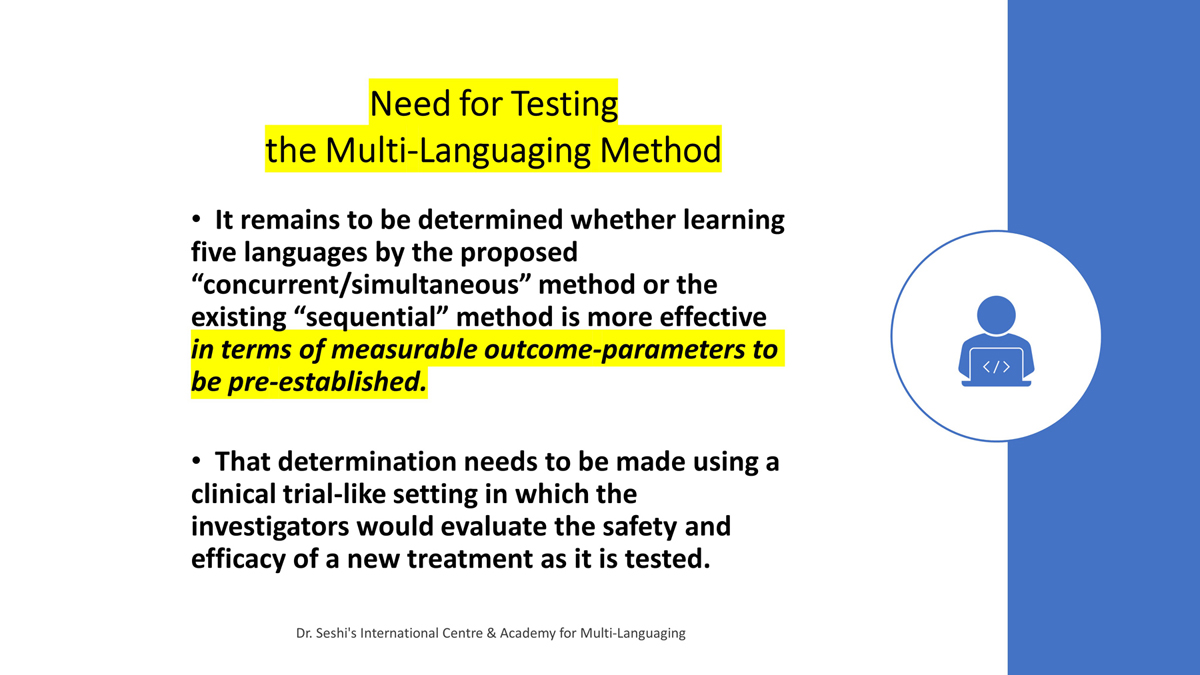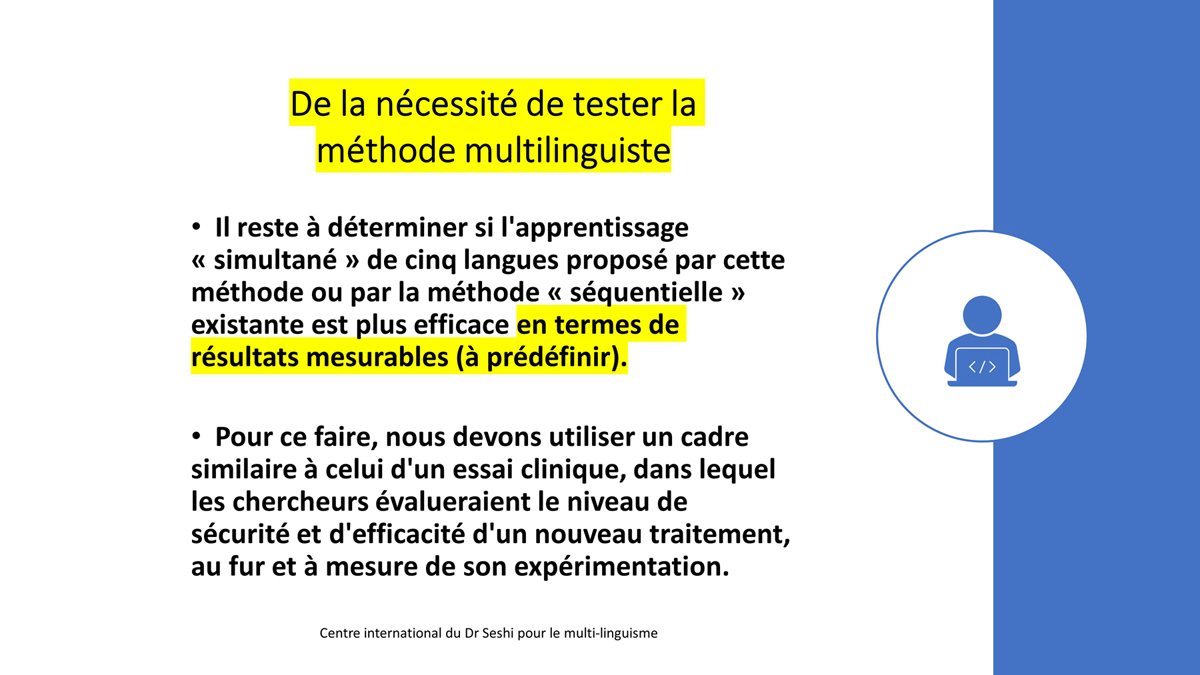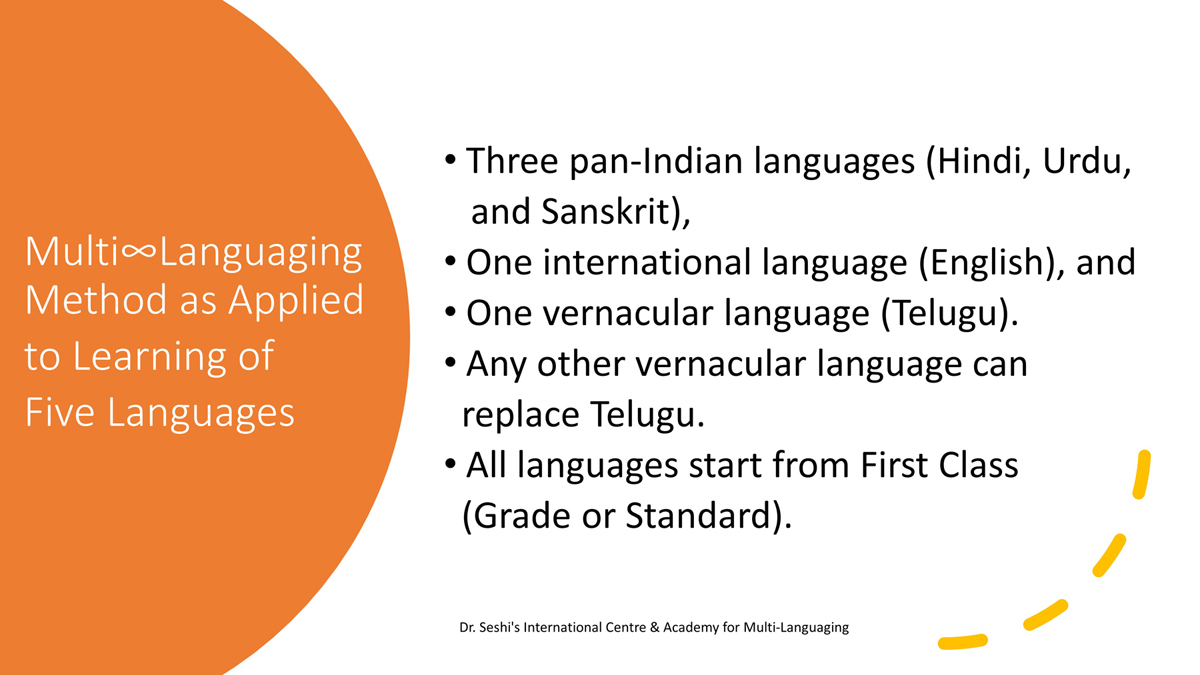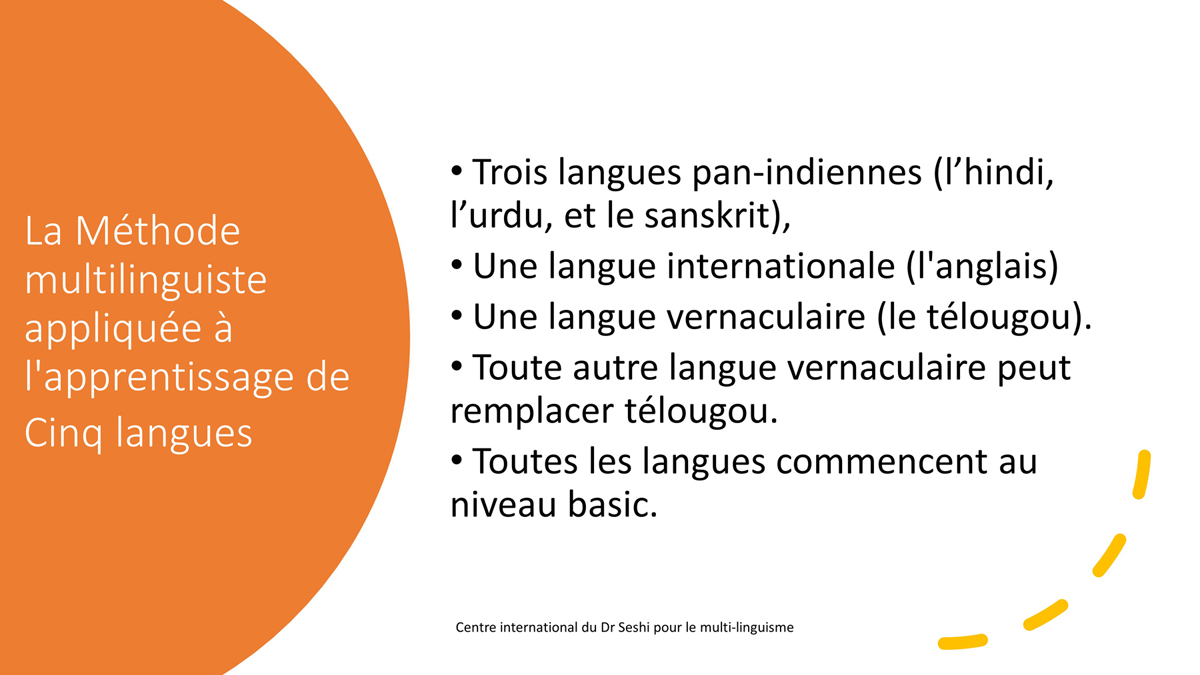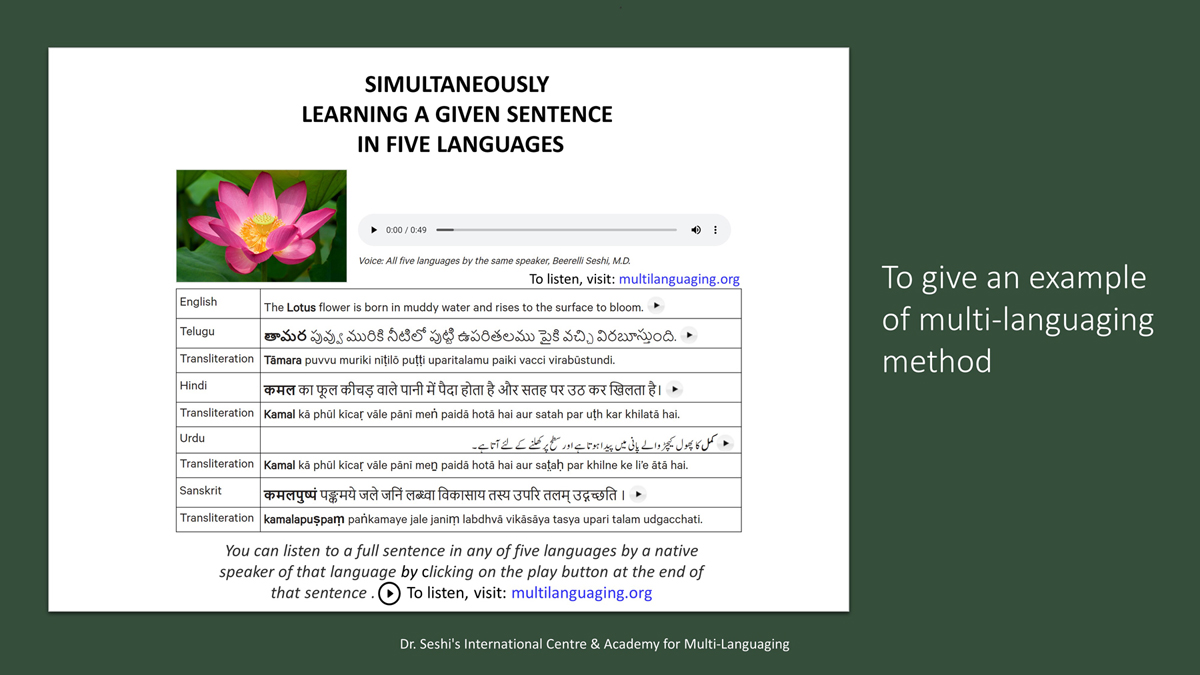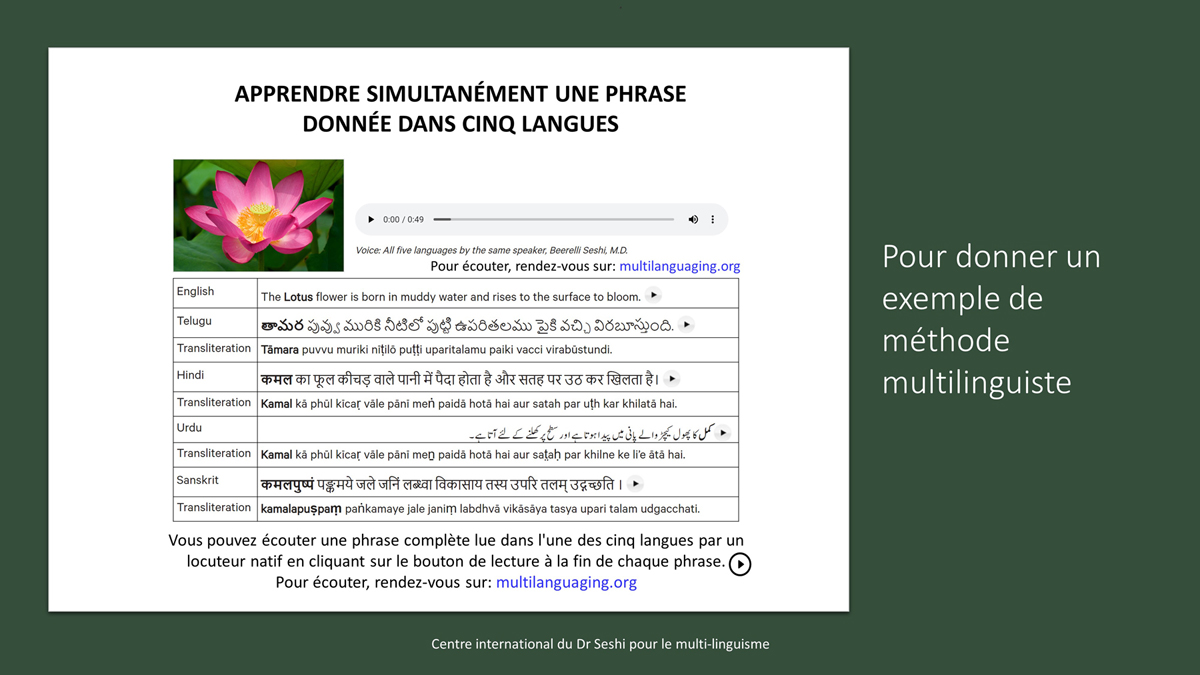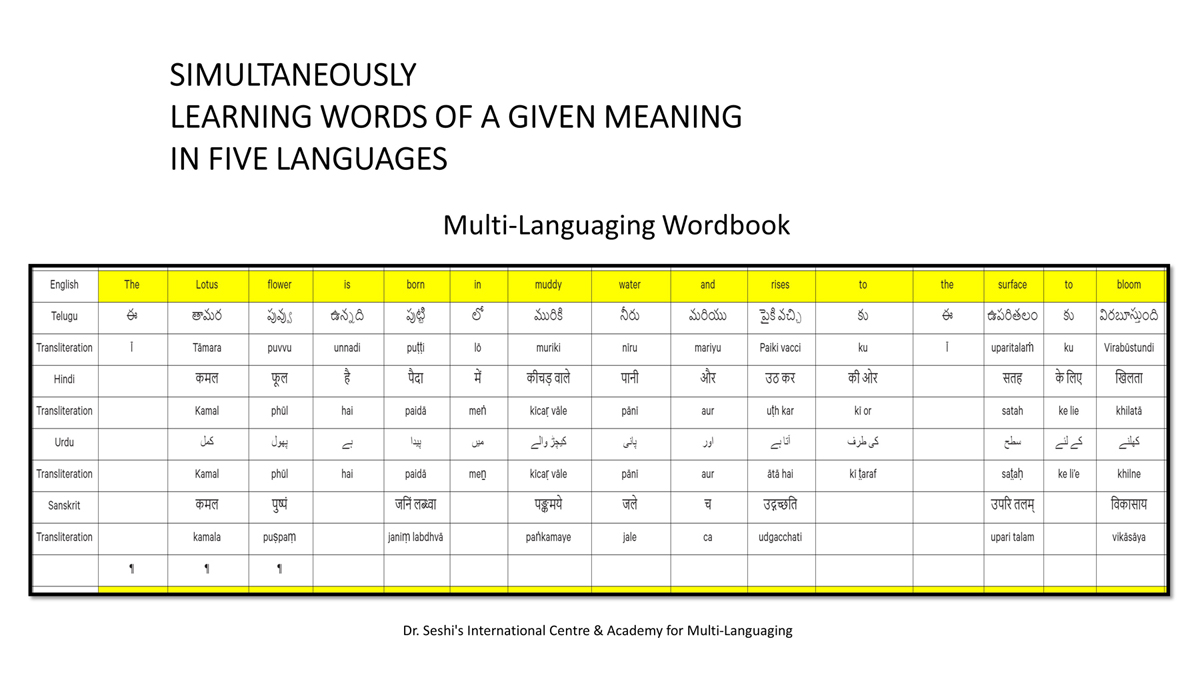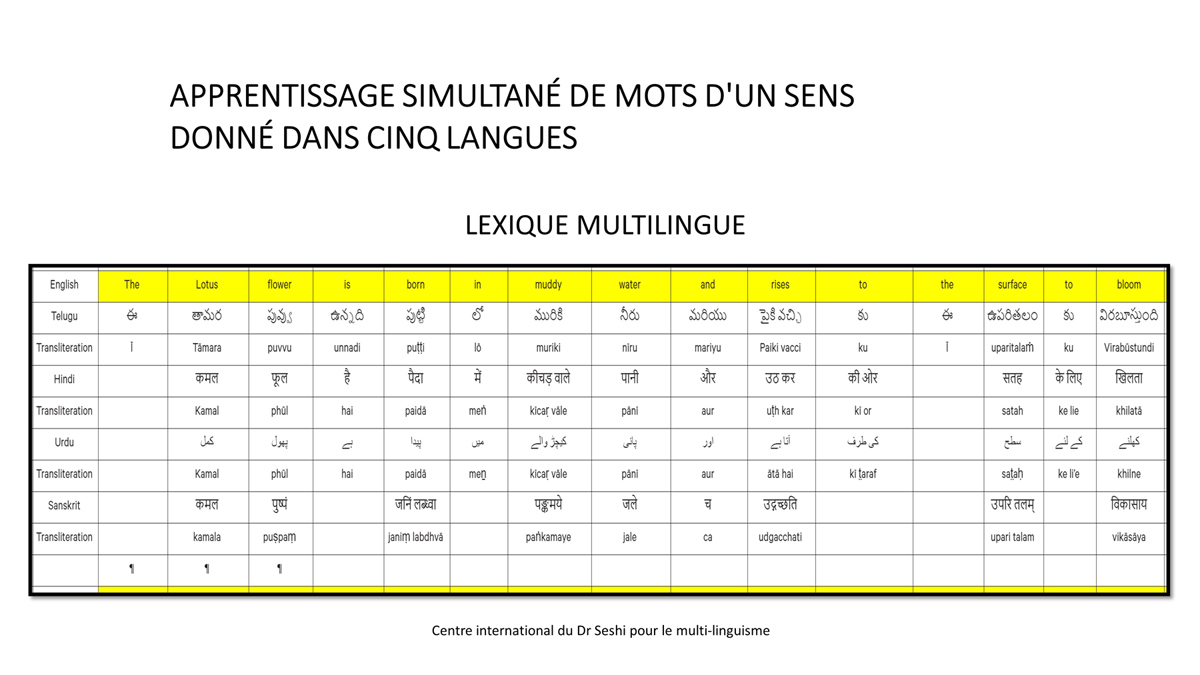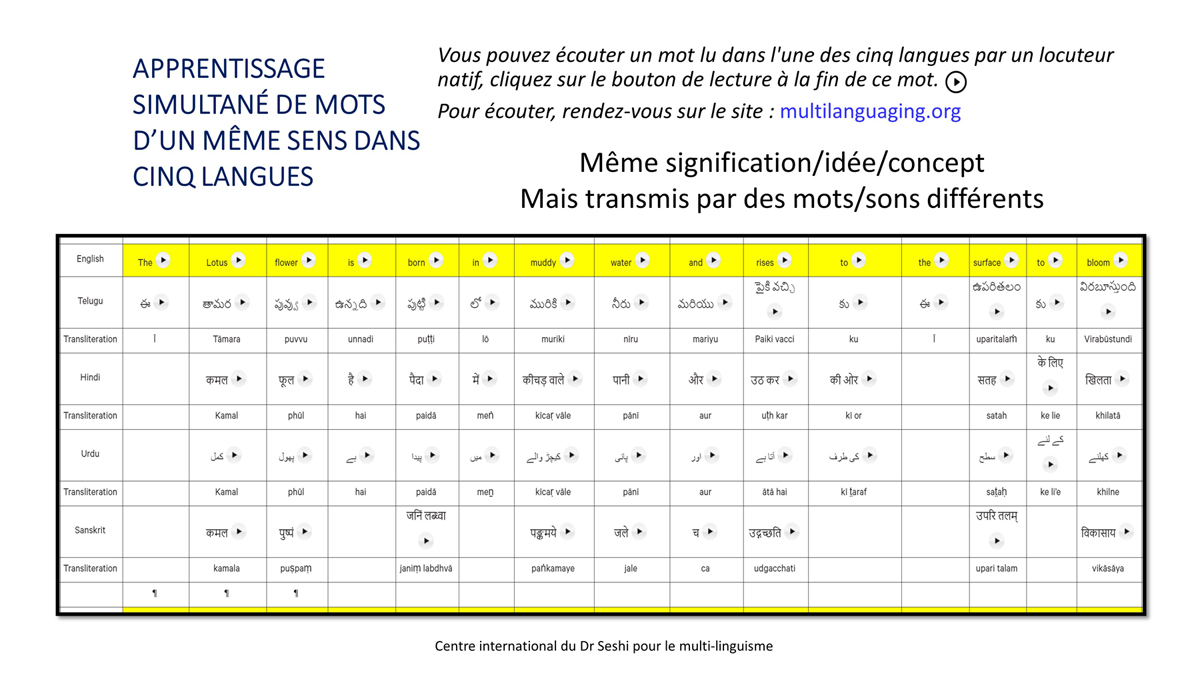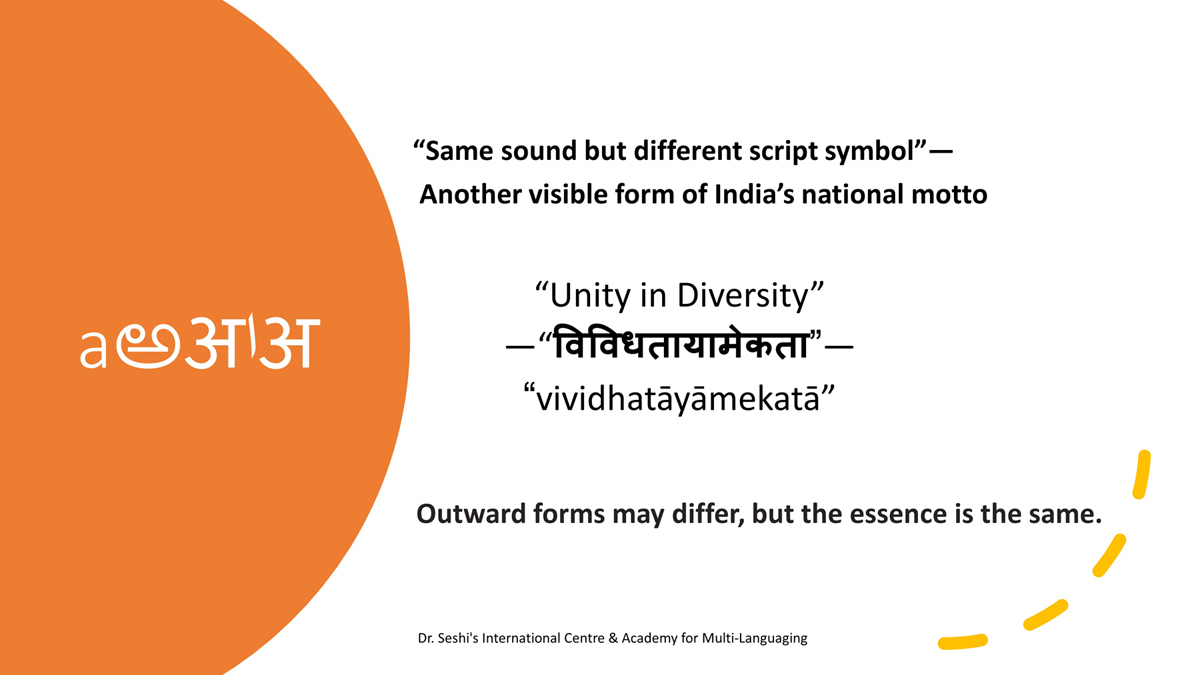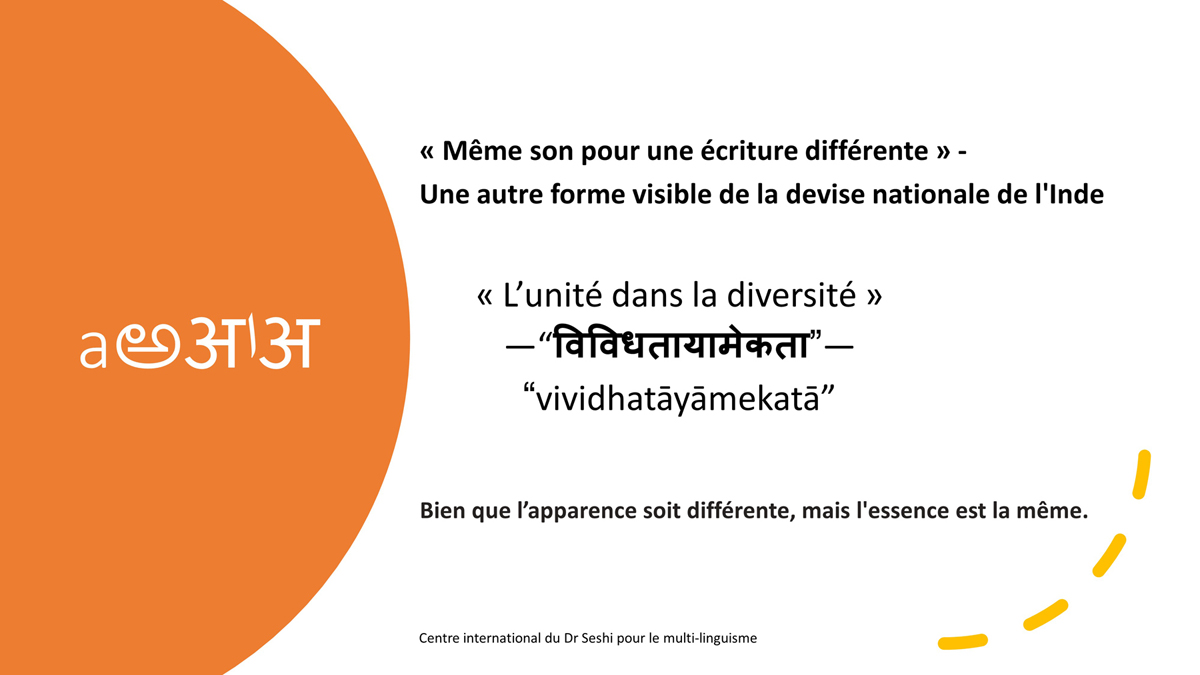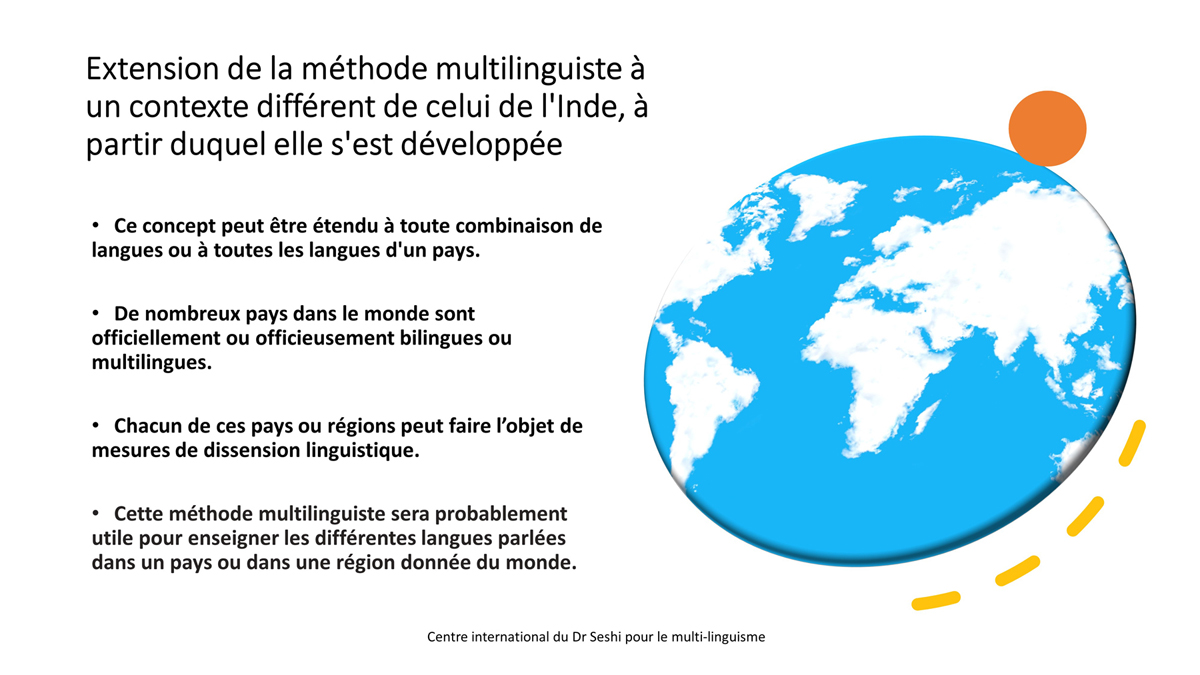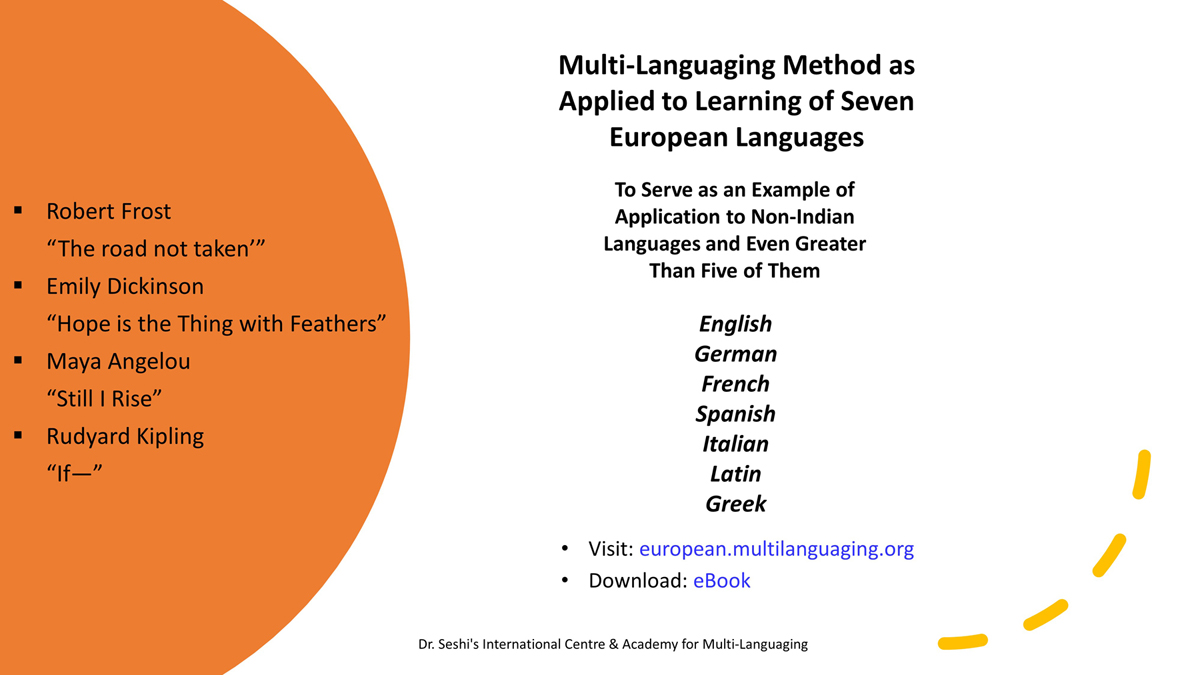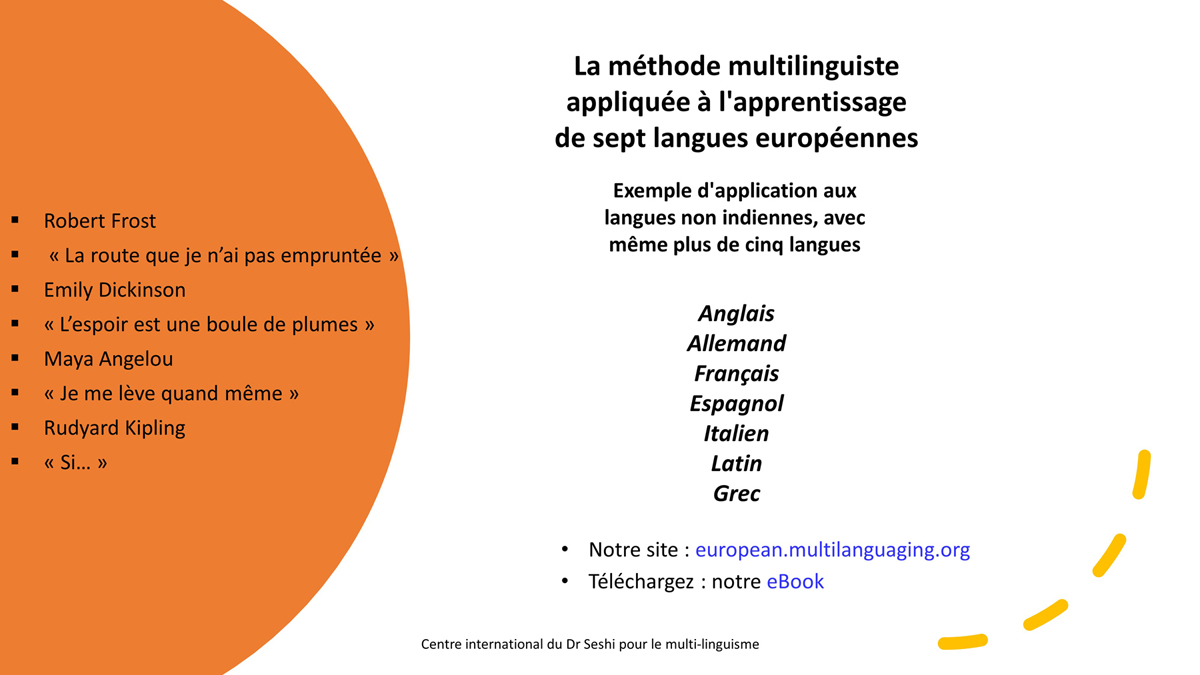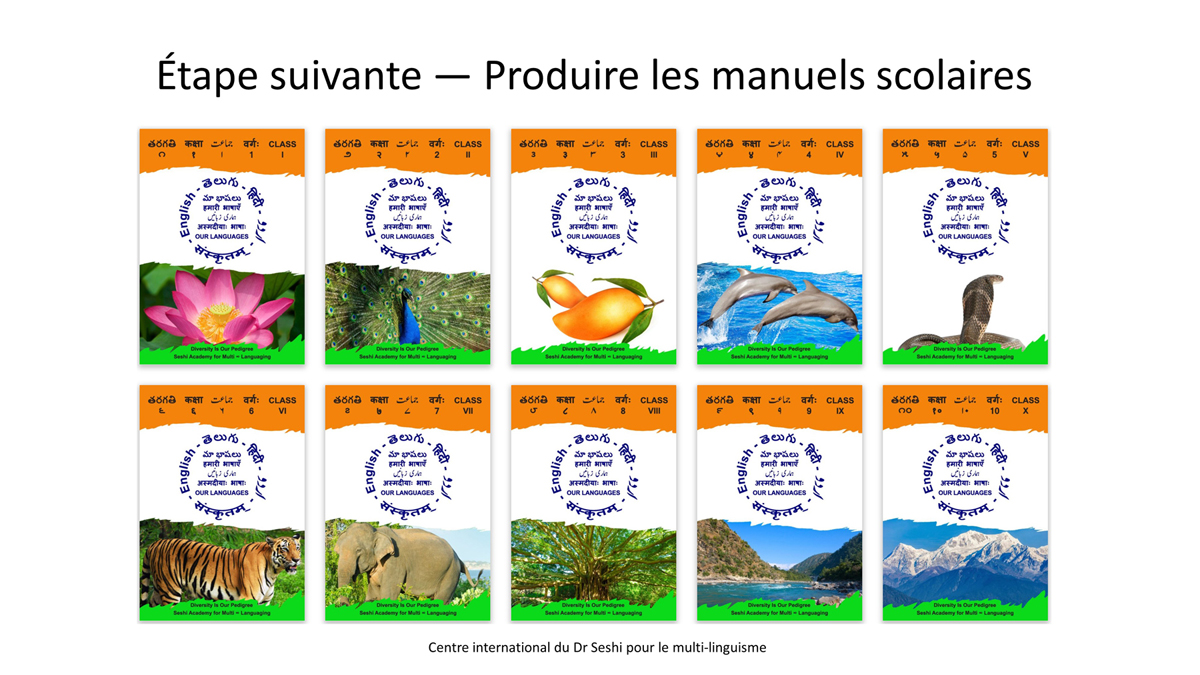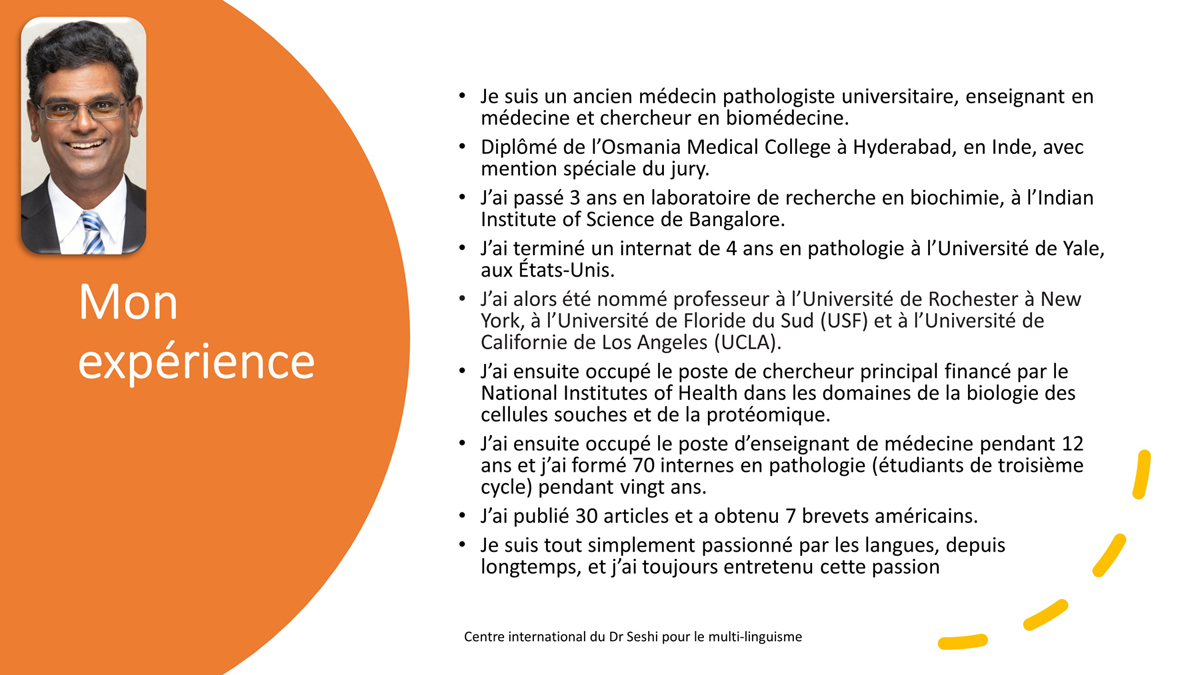
“Muta linguam tuam et mutas cogitationes tuas.”
Karl Albrecht

Beerelli Seshi, M.D.
| English | The Road Not Taken |
| German | Der nicht eingeschlagene Weg |
| French | La route que je n’ai pas prise |
| Spanish | El camino no elegido |
| Italian | La strada non presa |
| Latin | The(15) Via Non Peragrata |
| Greek | Ο Δρόμος που δεν ακολουθήθηκε |
| Transliteration | O Drómos pou den akolouthíthike |
| English | By Robert Frost (1916) |
| German | Von Robert Frost (1916) |
| French | De Robert Frost (1916) |
| Spanish | Por Robert Frost (1916) |
| Italian | Di Robert Frost (1916) |
| Latin | Ab Roberto Frost ([1916) |
| Greek | Του Ρόμπερτ Φρόστ (1916) |
| Transliteration | Tou Rómpert Fróst (1916) |
| English | “Two roads diverged in a yellow wood, |
| German | „Zwei Wege trennten sich in einem gelben Wald, |
| French | « Deux routes divergeaient dans un bois jaune. |
| Spanish | “Dos caminos se bifurcaban en un amarillo bosque, |
| Italian | “Due strade divergevano in un bosco ingiallito, |
| Latin | Duae viae tulerunt in(15) in diversas partes in flava silva, |
| Greek | “Δύο δρόμοι απέκλιναν σε ένα κίτρινο δάσος |
| Transliteration | “Dýo drómoi apéklinan se éna kítrino dásos |
| English | And sorry I could not travel both |
| German | Und es tat mir leid, dass ich nicht beide bereisen konnte. |
| French | Triste de ne pouvoir2 emprunter les deux, |
| Spanish | Y apenado por no poder tomar los dos |
| Italian | E purtroppo non potevo percorrerle entrambe |
| Latin | Et maestus I(15) non potui peragrare ambas |
| Greek | Και λυπημένος που δεν μπορούσα να ακολουθήσω και τους δύο |
| Transliteration | Kai lypiménos pou den boroúsa na akolouthíso kai tous dýo |
| English | And be one traveler, long I stood |
| German | Und da ich ein einsamer Reisender war, stand ich lange |
| French | et d’être seul traveler(3), je réfléchis un instant. |
| Spanish | Y ser un viajero solo, largo tiempo estuve de pie |
| Italian | Ed essendo un solo viaggiatore, a lungo mi soffermai |
| Latin | Et esse unus viator, diu I(15) steti, |
| Greek | Και να παραμένω ένας ταξιδιώτης, στάθηκα επί μακρόν (στο πεδίο)16 |
| Transliteration | Kai na paraméno énas taxidiótis, státhika epí makrón (sto pedío) |
| English | And looked down one as far as I could |
| German | Und ich schaute so weit wie möglich auf den einen herab |
| French | And(3) j’en suivis l’une du regard4, aussi loin que je pus |
| Spanish | Y miré down(13) uno tan lejos como I(13) pude, |
| Italian | E guardai giù per una il più lontano che potevo |
| Latin | Et spectavi secundum unam quam longissime as I(15) poteram |
| Greek | Και κοίταξα έναν όσο πιο μακριά μπορούσα σε βάθος |
| Transliteration | Kai koítaxa énan óso pio makriá boroúsa se váthos |
| English | To where it bent in the undergrowth; |
| German | Dorthin, wo er sich im Unterholz bog; |
| French | Jusqu’à ce virage dans les sous-bois ; |
| Spanish | Hasta donde se perdía en la espesura; |
| Italian | Fin dove svoltava nel the(14) sottobosco; |
| Latin | Quo where it(15) flectebatur in the(15) virgultis; |
| Greek | Ως εκεί που έστριβε με χαμηλή βλάστηση (λες και είναι πάτος).17 |
| Transliteration | Os ekeí pou éstrive me chamilí vlástisi les (kai eínai pátos). |
| English | Then took the other, as just as fair, |
| German | Dann nahm ich den anderen, der genauso gut, |
| French | Puis je pris l’autre, tout aussi belle. |
| Spanish | Entonces tomé el otro, tan justo como razonable, |
| Italian | Quindi presi l’altra, altrettanto buona, |
| Latin | Tum secutus sum the(15) alteram, as(15) ita ut pulchram, |
| Greek | Έπειτα πήρα τον άλλον, γιατί δεν νομίζω να κάνω λάθος, |
| Transliteration | Épeita píra ton állon, giatí den nomízo na káno láthos, |
| English | And having perhaps the better claim, |
| German | Und der vielleicht den besseren Anspruch hatte, |
| French | And(3) Elle offrait un avantage de taille5, |
| Spanish | Y teniendo quizás la acertada elección, |
| Italian | E avendo forse l’aspetto migliore, |
| Latin | Et habens fortasse the(15) meliorem postulationem, |
| Greek | Και έπειτα το είχε ίσως πιο πολύ ζητήσει |
| Transliteration | Kai épeita to eíche ísos pio polý zitísei |
| English | Because it was grassy and wanted wear; |
| German | Weil er grasig war und abgenutzt werden wollte; |
| French | car son herbe me semblait6 agréable à fouler ;6 |
| Spanish | porque it(13) era tupido y requería uso; |
| Italian | Perché era erbosa e meno battuta; |
| Latin | Quod it(15) erat herbosa et cupiebat usum; |
| Greek | Γιατί ήταν χορταριασμένος και αναζητούσε χρήση. |
| Transliteration | Giatí ítan chortariasménos kai anazitoúse chrísi. |
| English | Though as for that the passing there |
| German | Obwohl as for(1) das the(1) Gehen dort |
| French | mais en la parcourant7 je constatais7 |
| Spanish | Aunque en cuanto a lo the(13) que vi allí |
| Italian | Anche se as(14) per chi the(14) passava di lì |
| Latin | Quamquam as(15) de eo the(15) transitus ibi |
| Greek | Αν και για το παραπάνω, εκεί που οι άνθρωποι είχαν πατήσει |
| Transliteration | An kai gia to parapáno, ekeí pou oi ánthropoi eíchan patísei |
| English | Had worn them really about the same, |
| German | Sie wirklich ungefähr the(1) gleich abgetragen hatte, |
| French | qu’elles étaient en fait8 bien similaires.8 |
| Spanish | Los hubiera usado realmente about the(13) igual. |
| Italian | Erano state percorse them(14) quasi allo stesso modo, |
| Latin | Had(15) Triterat eas vero circiter the(15) idem, |
| Greek | Τους είχε προκαλέσει φθορά really(18) περίπου στον βαθμό τον ίδιο. |
| Transliteration | Tous eíche prokalései fthorá perípou ston vathmó ton ídio. |
| English | And both that morning equally lay |
| German | Und beide lagen an diesem Morgen gleichermaßen |
| French | Car en cette matinée, elles étaient toutes deux recouvertes,9 |
| Spanish | Y ambos esa mañana igualmente yacían, |
| Italian | Ed entrambe quella mattina giacevano uguali |
| Latin | Et ambae illo mane pariter iacerunt |
| Greek | Και το πρωί εκείνο και τους δύο ένα όμοιο (στρώμα τους είχε καλύψει)19 |
| Transliteration | Kai to proí ekeíno kai tous dýo éna ómoio (stróma tous eíche kalýpsei) |
| English | In leaves no step had trodden black. |
| German | Im Laub, kein Schritt hatte sie schwarz getreten. |
| French | de feuilles qu’aucun pas n’avait foulées. |
| Spanish | En las hojas en las que ningún paso había pasado, |
| Italian | Nelle foglie che nessun passo aveva annerito. |
| Latin | Apud folia quae nullus ingressus had(15) peragraverat atra. |
| Greek | Από φύλλα που δεν άλλαξαν χρώμα από βήμα κανενός.20 |
| Transliteration | Apó fýlla pou den állaxan chróma apó víma kanenós |
| English | Oh, I kept the first for another day! |
| German | Oh, ich habe mir den ersten für einen anderen Tag vorbehalten! |
| French | Eh bien, je découvrirai la première une autre fois ! |
| Spanish | ¡Oh, yo conservé aquel primero para otro día! |
| Italian | Oh, conservai la prima per un altro giorno! |
| Latin | O, I(15) servavi the(15) primam in alium diem! |
| Greek | Ω, κράτησα τον πρώτο για μια άλλη μέρα (στην δική μου ζήση)!21 |
| Transliteration | O, krátisa ton próto gia mia álli méra (stin dikí mou zísi)! |
| English | Yet knowing how way leads on to way, |
| German | Da ich weiß, wie Weg zu Weg führt, |
| French | Mais sachant qu’une route10 mène à une autre,10 |
| Spanish | Aún sabiendo como el sentido lleva hacia el otro sentido, |
| Italian | Pur sapendo come una strada conduce all’altra strada, |
| Latin | Attamen sciens quomodo via ducat on(15) in viam, |
| Greek | Όμως γνωρίζοντας πως ο δρόμος σε άλλο δρόμο θα οδηγήσει |
| Transliteration | Ómos gnorízontas pos o drómos se állo drómo tha odigísei |
| English | I doubted if I should ever come back. |
| German | Bezweifelte ich, ob ich jemals wiederkommen würde. |
| French | Je me demandais si je devais ever(3) revenir en arrière. |
| Spanish | Dudé si yo debería jamás regresar. |
| Italian | Dubitai se mai sarei tornato indietro. |
| Latin | Dubitavi si I should(15) umquam redirem back(15). |
| Greek | Αμφέβαλα αν (ο δρόμος)22 ποτέ θα (με πισωγυρίσει).22 |
| Transliteration | Amfévala an (o drómos) poté tha (me pisogyrísei). |
| English | I shall be telling this with a sigh |
| German | Ich sollte dies mit einem Seufzer be(1) erzählen. |
| French | Je répéterai11 ceci with(3) en soupirant |
| Spanish | Debo estar diciendo esto con un suspiro |
| Italian | Lo racconterò this(14) con un sospiro |
| Latin | I shall be(15) Dicam hoc cum a(15) gemitu |
| Greek | Θα το λέω αυτό με έναν αναστεναγμό |
| Transliteration | Tha to léo aftó me énan anastenagmó |
| English | Somewhere ages and ages hence: |
| German | Irgendwo altert und daher alt: |
| French | pendant une éternité :12 |
| Spanish | En algún lugar siglos y siglos, por ende: |
| Italian | Da qualche parte secoli e secoli a venire: |
| Latin | Alicubi aeva et aeva hinc: |
| Greek | Κάπου έτη και έτη πίσω από τώρα: |
| Transliteration | Kápou éti kai éti píso apó tóra: |
| English | Two roads diverged in a wood, and I— |
| German | Zwei Wege trennten sich in einem Wald, und ich… |
| French | Deux routes divergeaient dans un bois, et moi |
| Spanish | Dos caminos se bifurcaban en un bosque y yo— |
| Italian | Due strade divergevano in un bosco e io— |
| Latin | Duae viae tulerunt in a(15) diversas partes in silva, et ego— |
| Greek | Δύο δρόμοι απέκλιναν σε ένα δάσος- και εγώ- |
| Transliteration | Dýo drómoi apéklinan se éna dásos- kai egó- |
| English | I took the one less traveled by, |
| German | Ich nahm den one(1) weniger bereisten by(1), |
| French | j’ai suivi la moins fréquentée |
| Spanish | Yo tomé el one(13) menos transitado by(13), |
| Italian | Io presi quella meno percorsa by(14), |
| Latin | I(15) Secutus sum the(15) eam minus peragratam, |
| Greek | Πήρα τον λιγότερο περπατημένο |
| Transliteration | Píra ton ligótero perpatiméno |
| English | And that has made all the difference.” |
| German | Und das war made all(1) der Unterschied.” |
| French | Et c’est ça qui a fait toute la différence. » |
| Spanish | Y eso ha hecho toda la diferencia.” |
| Italian | E ciò ha fatto tutta la differenza.” |
| Latin | Et illud has(15) omnia mutavit. |
| Greek | Και κάνει όλη την διαφορά αυτό!” |
| Transliteration | Kai kánei óli tin diaforá aftó!” |
| English | Here is a weblink to a recitation of the poem in English. |
| German | Hier ist ein Weblink zu einer Rezitation des Gedichts in englischer Sprache. |
| French | Voici un lien vers une récitation du poème en anglais. |
| Spanish | Aquí está un enlace web de la recitación del (the)13 poema en inglés. |
| Italian | Qui trovi un collegamento alla (a)14 recitazione della (the)14 poesia in inglese. |
| Latin | Ecce (is a)(15) vinculum retiale (to a)(15) recitationi (of the)(15) poematis in Anglica. |
| Greek | Εδώ είναι ένας σύνδεσμος σε μια απαγγελία του ποιήματος στα Αγγλικά, |
| Transliteration | Edó eínai énas sýndesmos se mia apangelía tou poiímatos sta Angliká, |
| English | I extend an open invitation to the readers to submit recordings of their recitations of its translations. |
| German | Ich richte eine offene Einladung an die Leser, Aufnahmen ihrer Rezitationen der Übersetzungen einzureichen. |
| French | J’invite (an open)3 ouvertement les lecteurs à me soumettre l’enregistrement de la récitation de ces traductions. |
| Spanish | Extiendo una invitación abierta para que los lectores nos manden las grabaciones de sus recitaciones de las traducciones. |
| Italian | Estendo l’invito (an)14 aperto ai (the)14 lettori a presentare le registrazioni delle loro recitazioni delle traduzioni. |
| Latin | Ego (to the)(15) lectoribus (an)(15) apertam invitationem porrigo ut recordationes recitationum (of)(15) suarum translationum (of)(15) eius (to)(15) submittant. |
| Greek | Προσκαλώ οποτεδήποτε θέλουν οι αναγνώστες να υποβάλουν ηχογραφήσεις των απαγγελιών τους των μεταφράσεών του. |
| Transliteration | Proskaló opotedípote théloun oi anagnóstes na ypováloun ichografíseis ton apangelión tous ton metafráseón tou. |
| English | If selected, their audio/video clips will be hosted on this website. |
| German | Wenn sie ausgewählt werden, werden ihre Audio-/Videoclips auf dieser Website gehostet. |
| French | Les meilleurs clips audio/vidéo seront sélectionnés et publiés sur ce site. |
| Spanish | Si seleccionamos vuestros clips de audio/video serán publicados en este sitio web. |
| Italian | Se selezionato il tuo audio/videoclip sarà pubblicato su questo sito Web. |
| Latin | Si selecta, eorum audibilia/visibilia praecisa (will be)(15) divulgabuntur in hac pagina retiali. |
| Greek | Αν επιλεγούν, τα ηχητικά/βίντεο κλιπ, θα φιλοξενηθούν σε αυτόν τον ιστότοπο. |
| Transliteration | An epilegoún, ta ichitiká/vínteo klip, tha filoxenithoún se aftón ton istótopo. |
German:
1 “as for”, “the”, “be”, “one”, “by” and “made all” – Translation of these words in German in this context is not necessary because of the language structure, which is different from English.
French:
2 “I could not” translated as “de ne pouvoir” which means “I couldn’t”
3 “traveler”, “And”, “ever”, “with” and “extend an”- Translation of these words in French in this context is not necessary because of the language structure, which is different from English.
Below are some of the words with explanation.
4 “looked down one” translated as “J’en suivis l’une du regard” which means “I kept watching one”
5 “having perhaps the better claim” translated as “Elle offrait un avantage de taille” which means “It offered a considerable advantage”
6 “was grassy” translated as “herbe me semblait” which means “As it grass seemed” and “and wanted wear” translated as “agréable à fouler” which means “enjoyable to set foot on”
7 “as for that” translated as “en la parcourant” which means “But walking on it” and “the passing there” translated as “je constatais” which means “I noticed”
8 “Had worn them really” translated as “qu’elles étaient en fait” which means “That actually both of them looked” and “about the same” translated as “bien similaires” which means “quite the same”
9 “equally lay” translated as “elles étaient toutes deux recouvertes” which means “they were both covered”
10 “how way” translated as “qu’une route” which means “one road” and “on to way” translated as “à une autre” which means “to another”
11 “shall be telling” translated as “répéterai” which means “will repeat”
12 “Somewhere ages and ages hence” translated as “pendant une éternité” which means “during an eternity”
Spanish:
13 “down”, “I”, “it”, “the”, “about the”, “one” and “by”- Translation of these words in Spanish in this context is not necessary because of the language structure, which is different from English.
Italian:
14 “the”, “as”, “them”, “this”, “by”, “a”, and “an” – Translation of these words in Italian in this context is not necessary because of the language structure, which is different from English.
Latin:
15 “The”, “in”, “I”, “as I”, “where it”, “as”, “it”, “Had”, ”on”, “I should”, “back”, “I shall be”, “a”, “is a”, “to a”, “of the”, “an”, “to the”, “to”, “of” and “will be”- Translation of these words in Latin in this context is not necessary because of the language structure, which is different from English.
Greek:
16 “And be one traveler, long I stood” translated as “Και να παραμένω ένας ταξιδιώτης, στάθηκα επί μακρόν (στο πεδίο)” Back translation: Back translation: And remain one traveler, I stood long (upon the field).
17 “To where it bent in the undergrowth;”translated as “Ως εκεί που έστριβε με χαμηλή βλάστηση (λες και είναι πάτος).” Back translation: To where it bent in the undergrowth (as if it was way too shallow)
18 “really” – Translation of these words in Greek in this context is not necessary because of the language structure, which is different from English.
19 “And both that morning equally lay” translated as “Και το πρωί εκείνο και τους δύο ένα όμοιο (στρώμα τους είχε καλύψει)” Back translation: And that morning both a similar layer (had covered them)
20 “In leaves no step had trodden black.” Translated as “Από φύλλα που δεν άλλαξαν χρώμα από βήμα κανενός.” Back translation: from leaves that had not changed color from the step of anyone
21 “Oh, I kept the first for another day!” translated as “Ω, κράτησα τον πρώτο για μια άλλη μέρα (στην δική μου ζήση)!” Back translation: I kept the first for another day (in my own life!)




